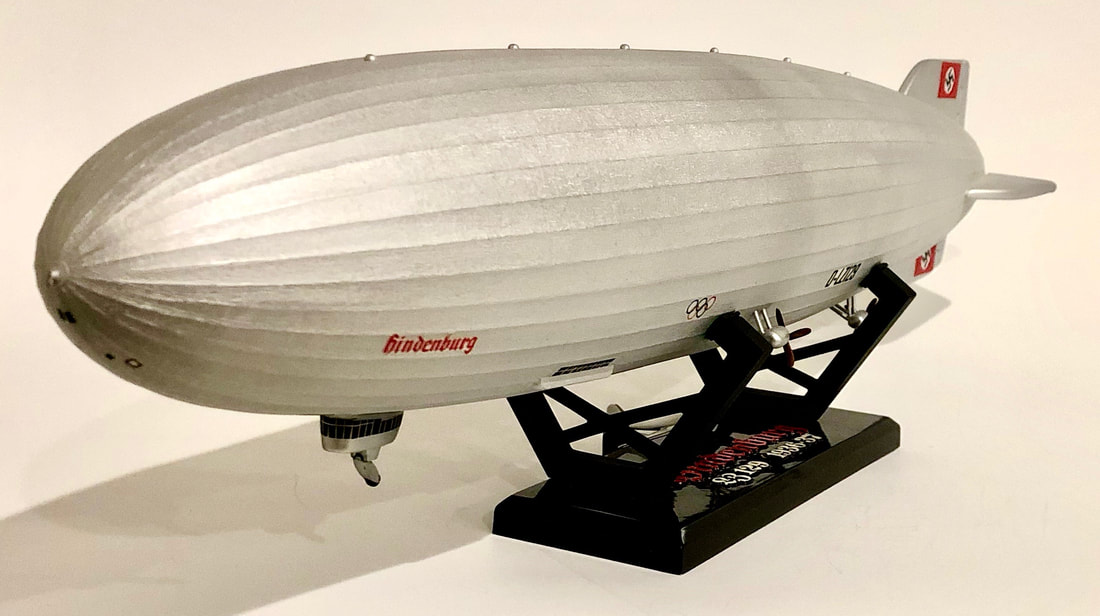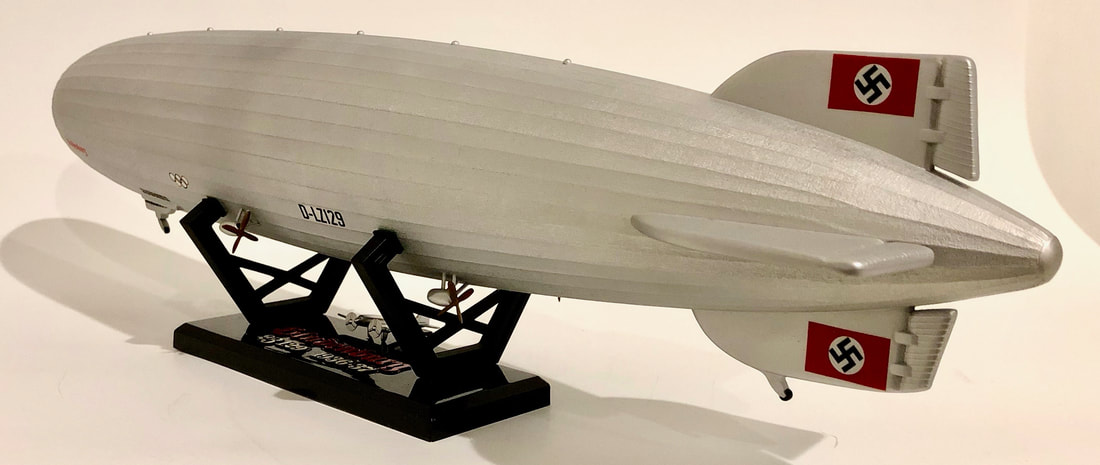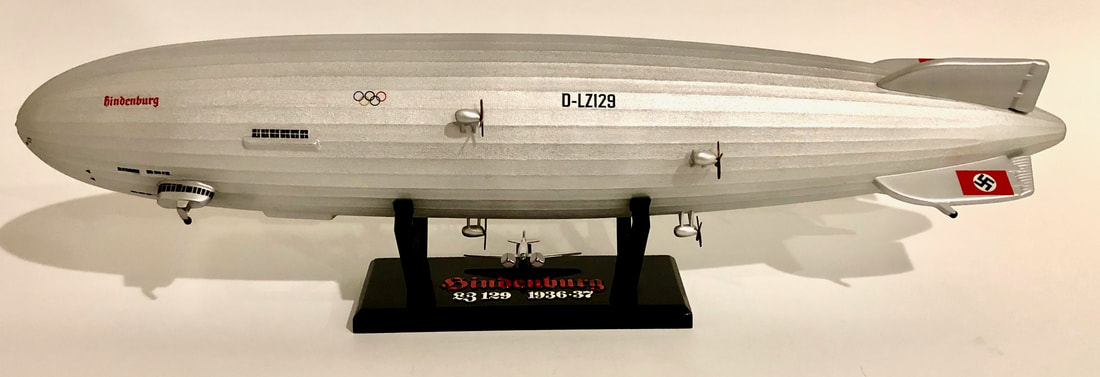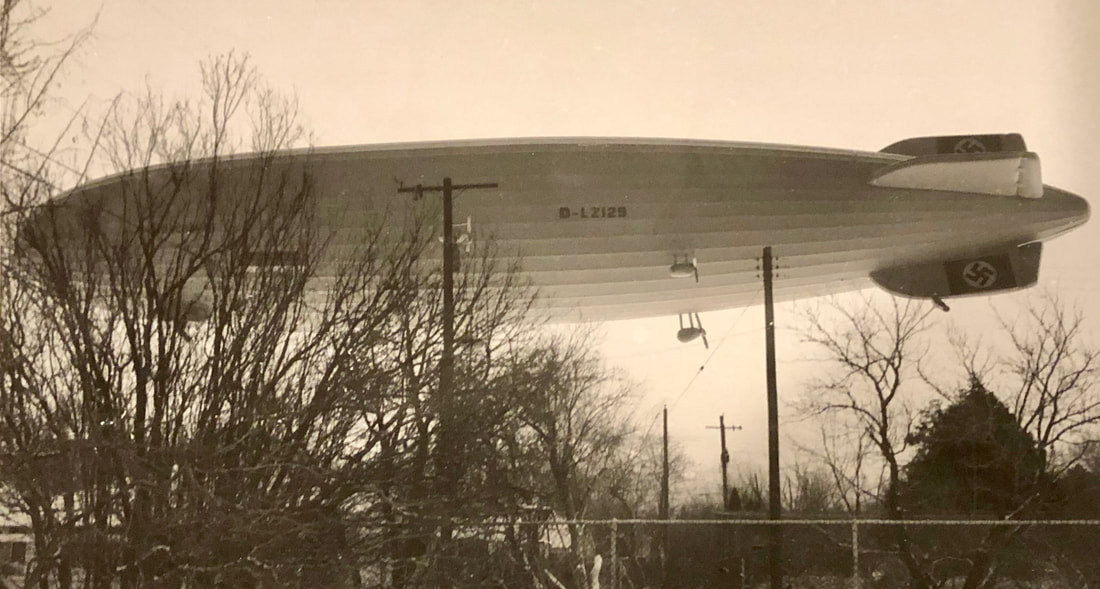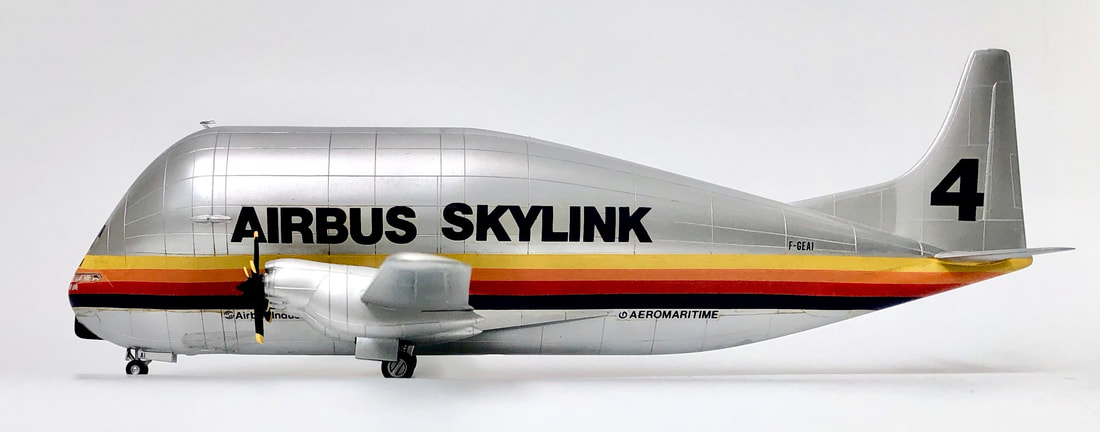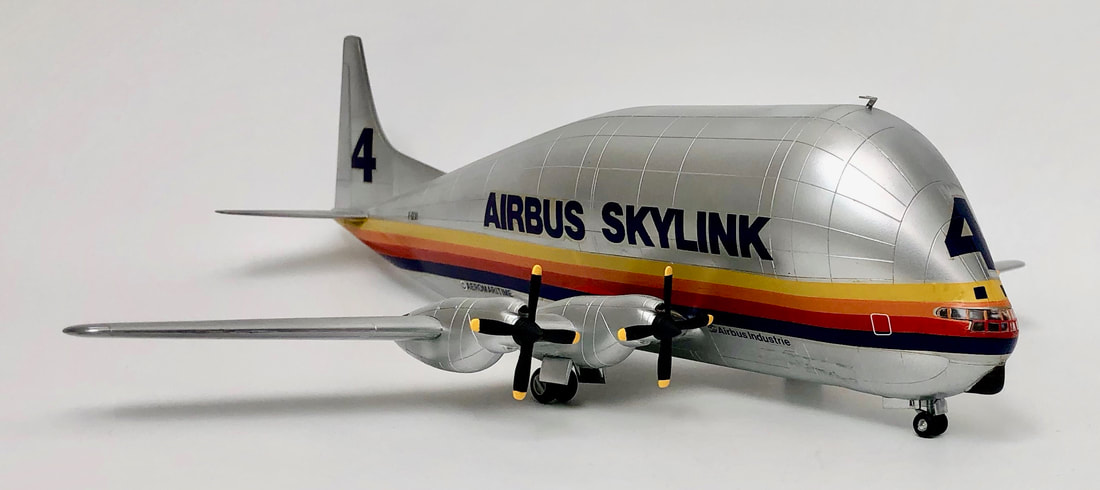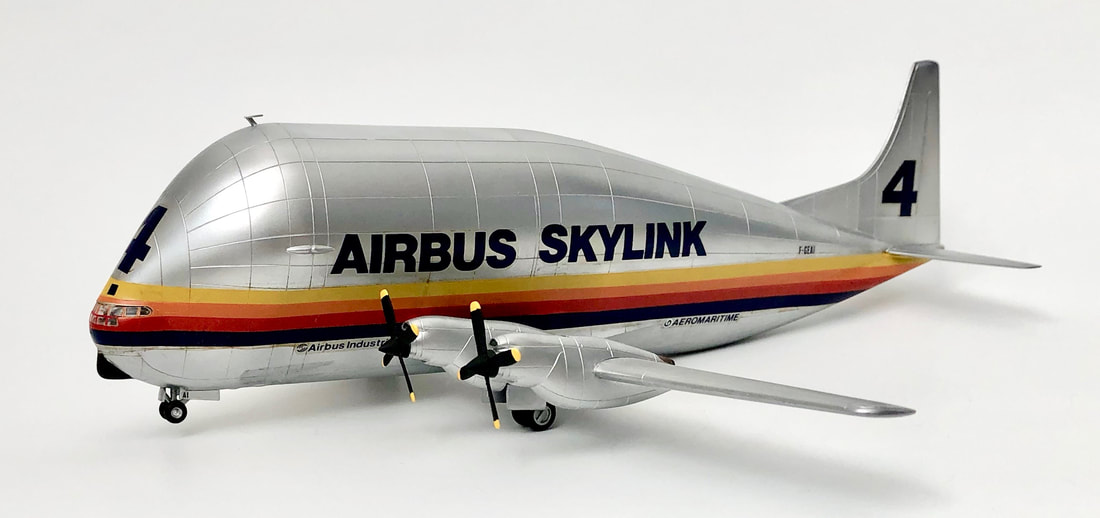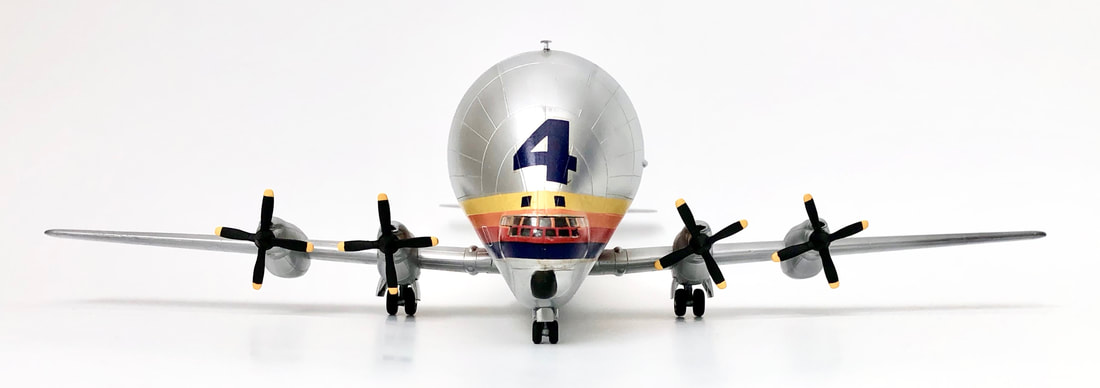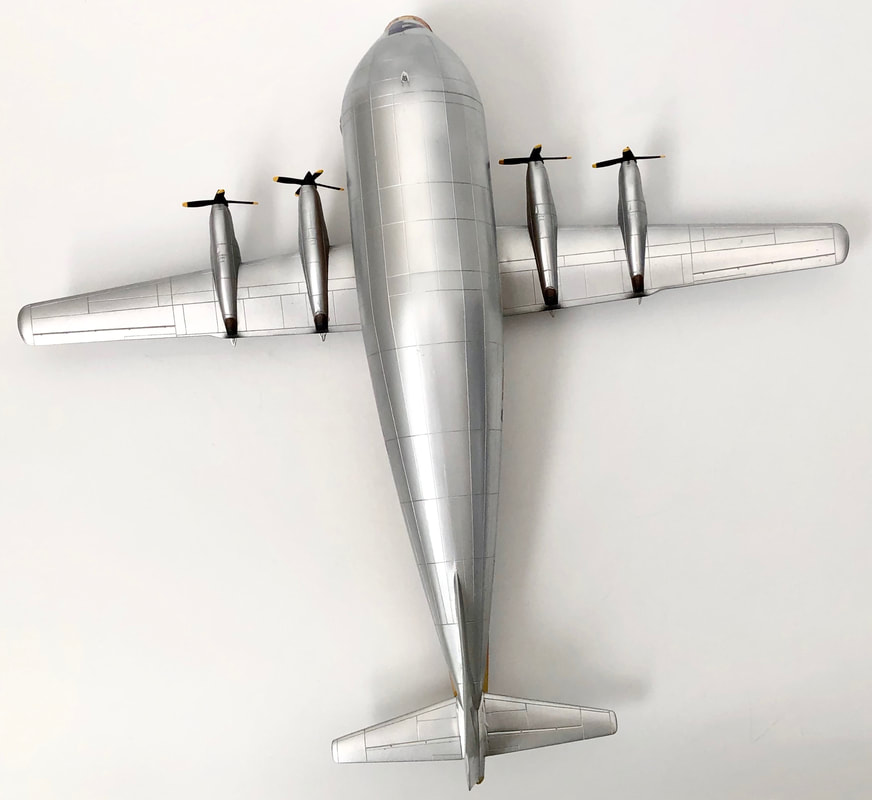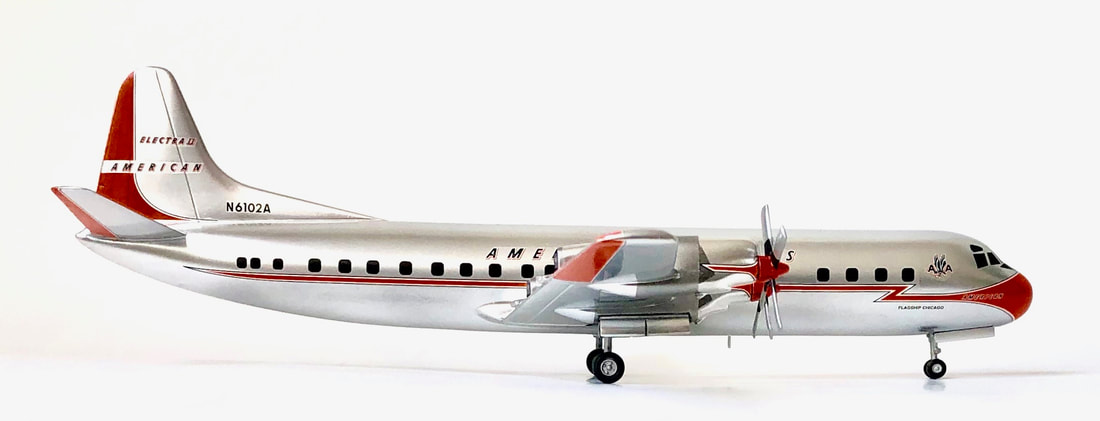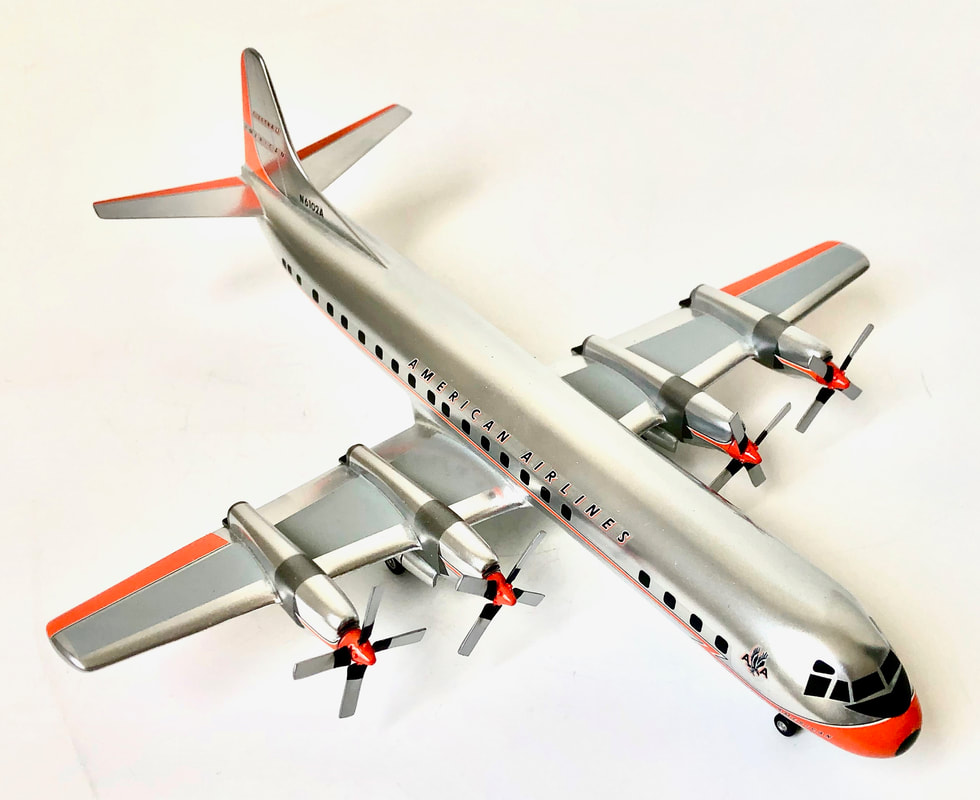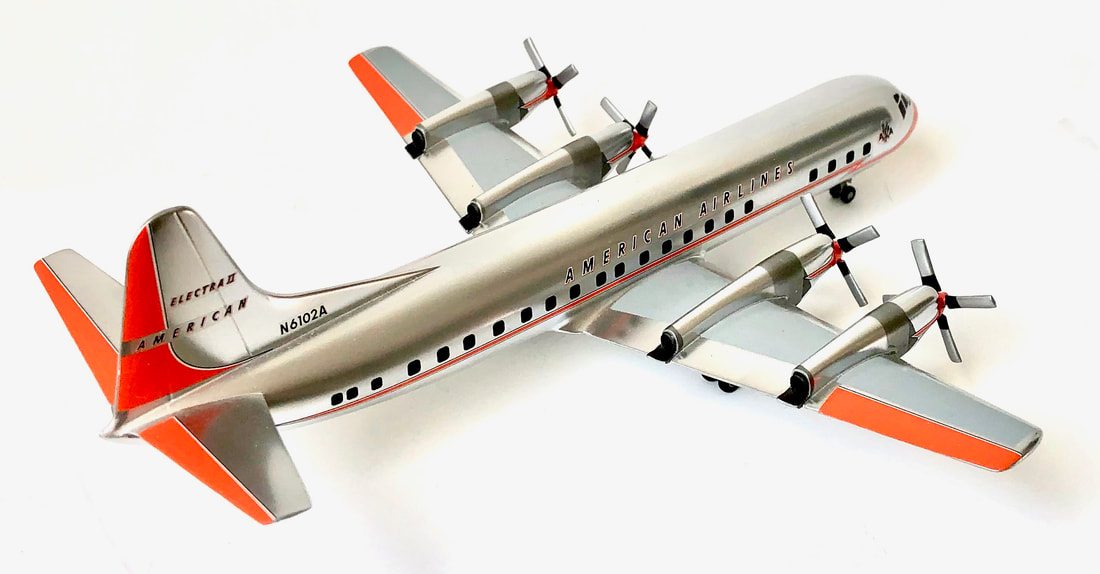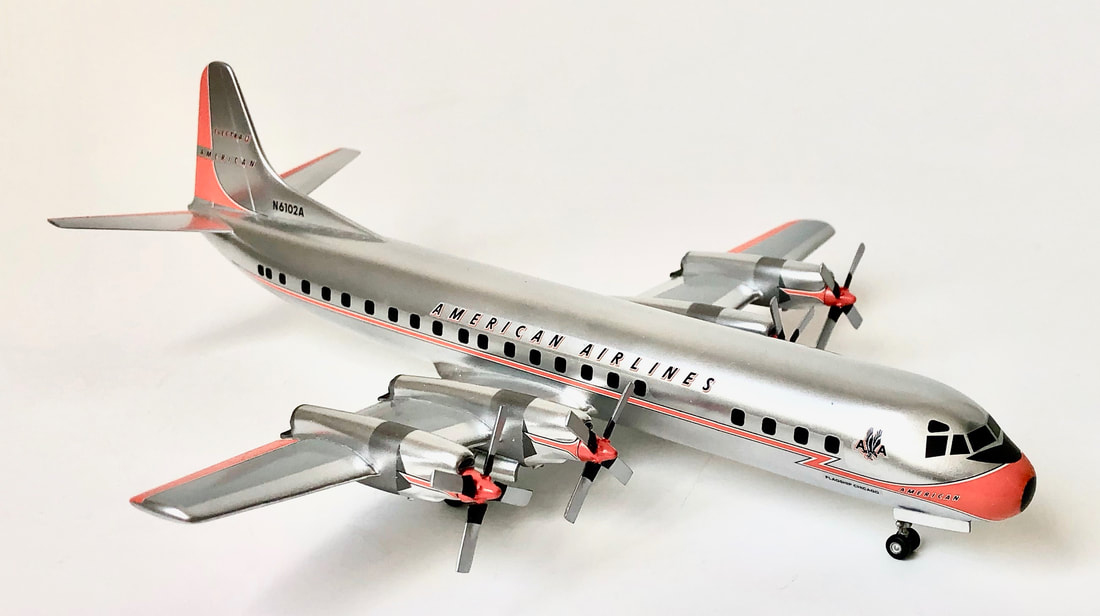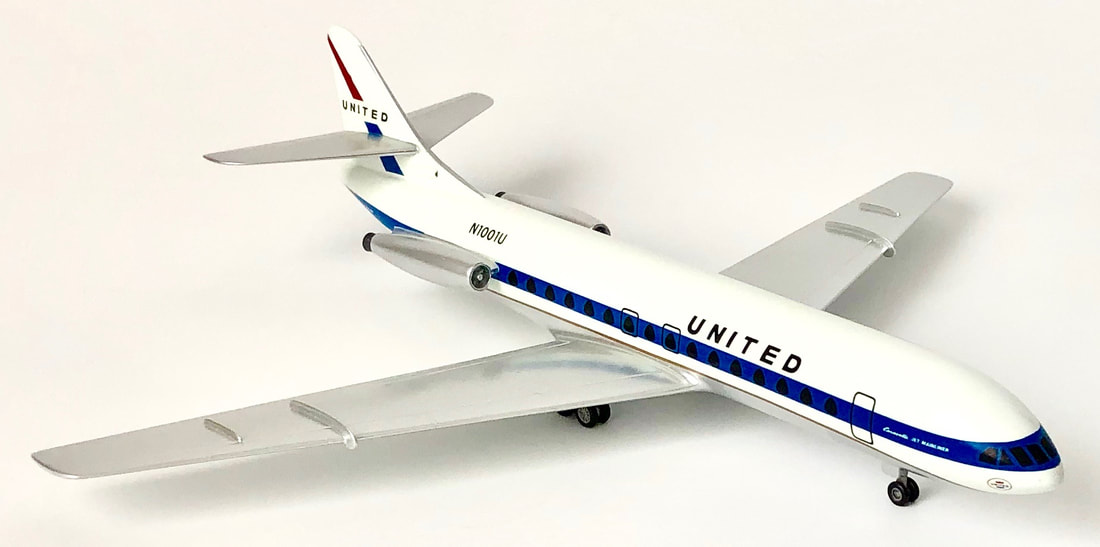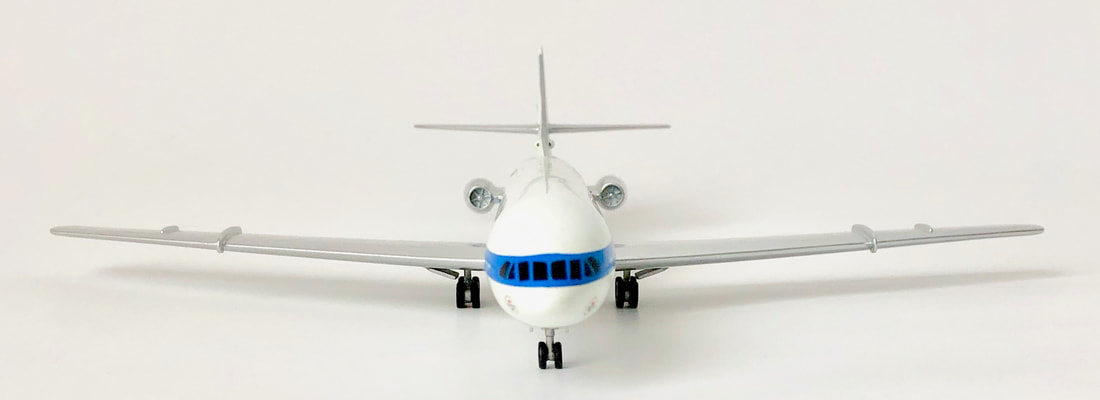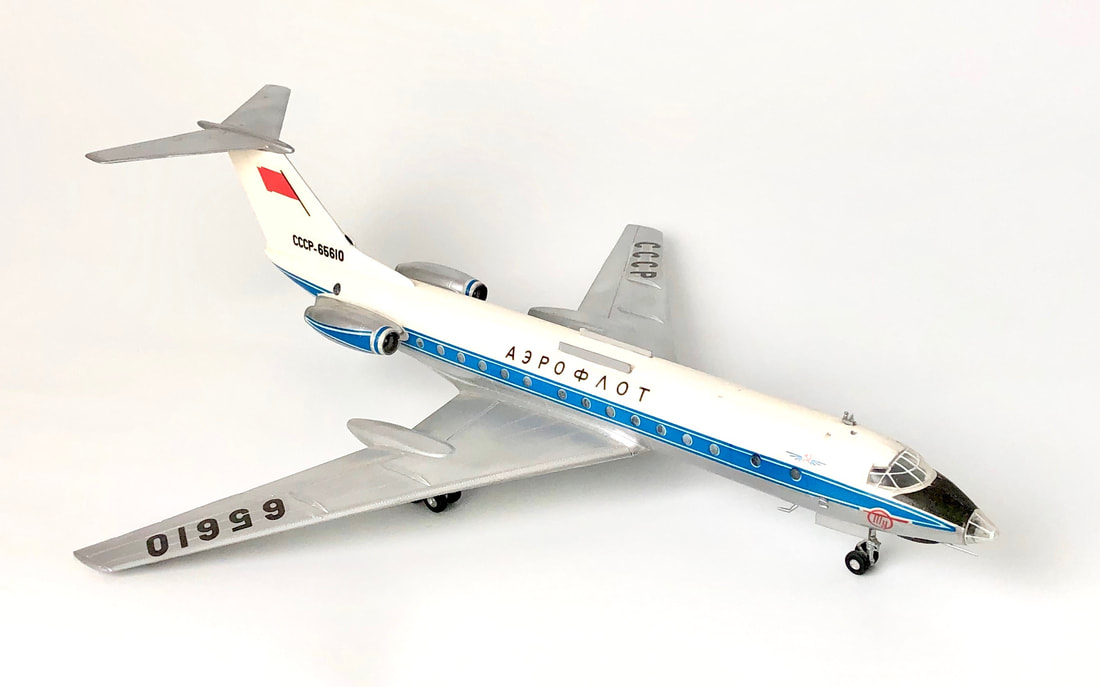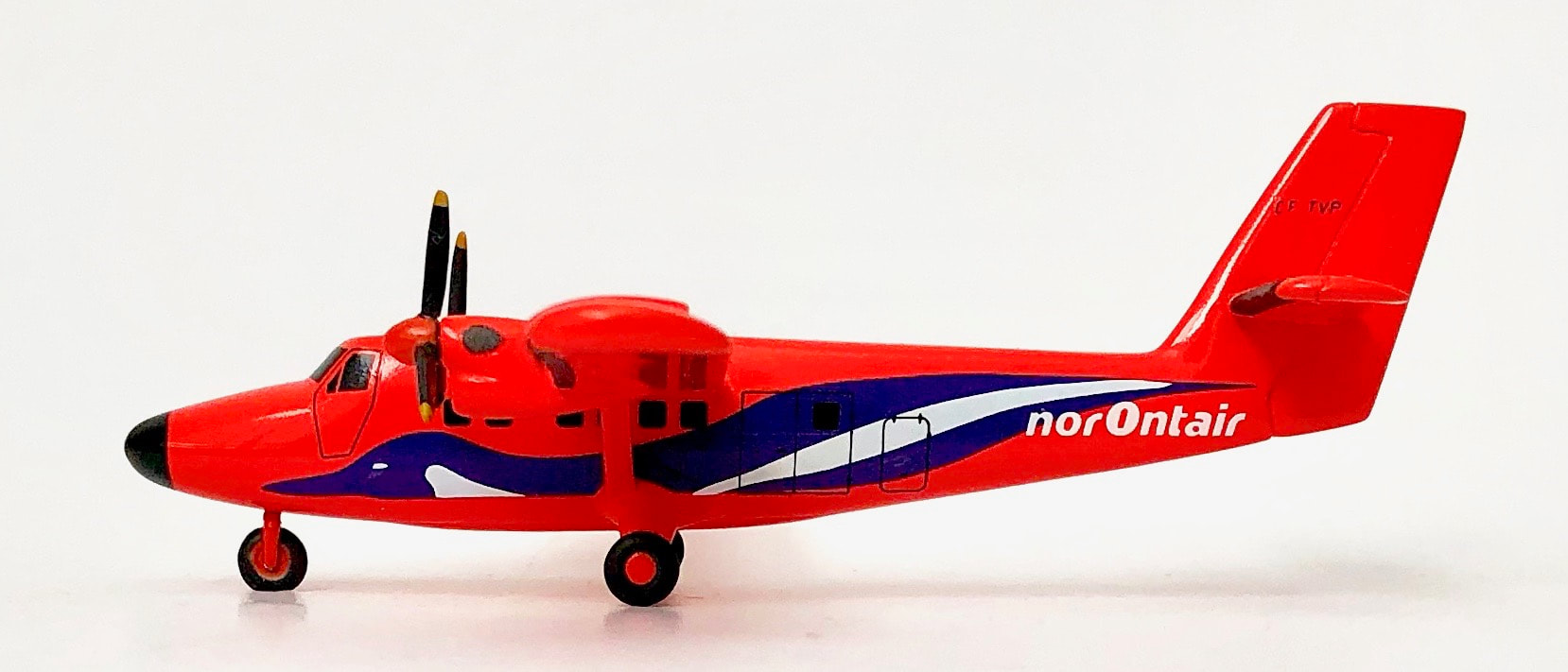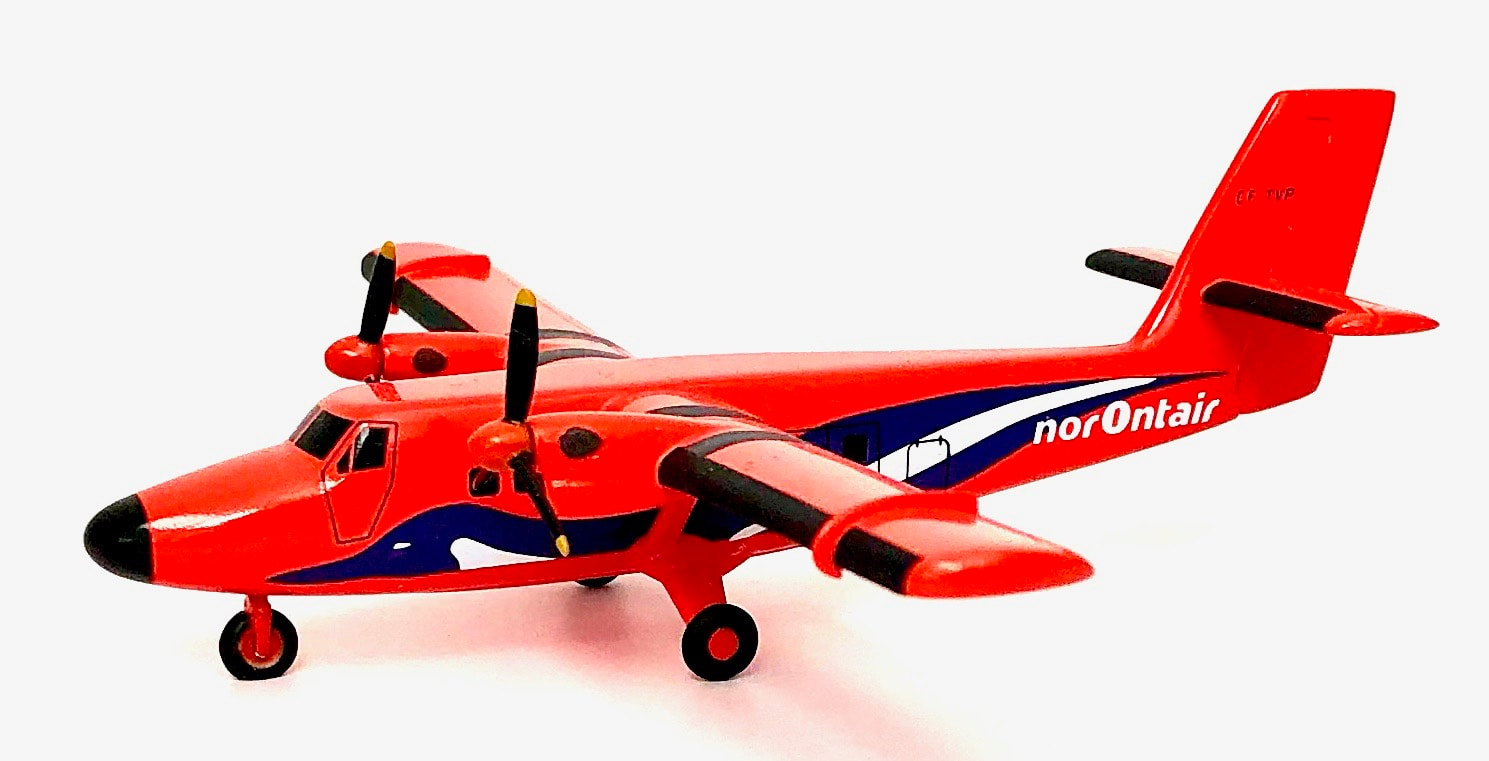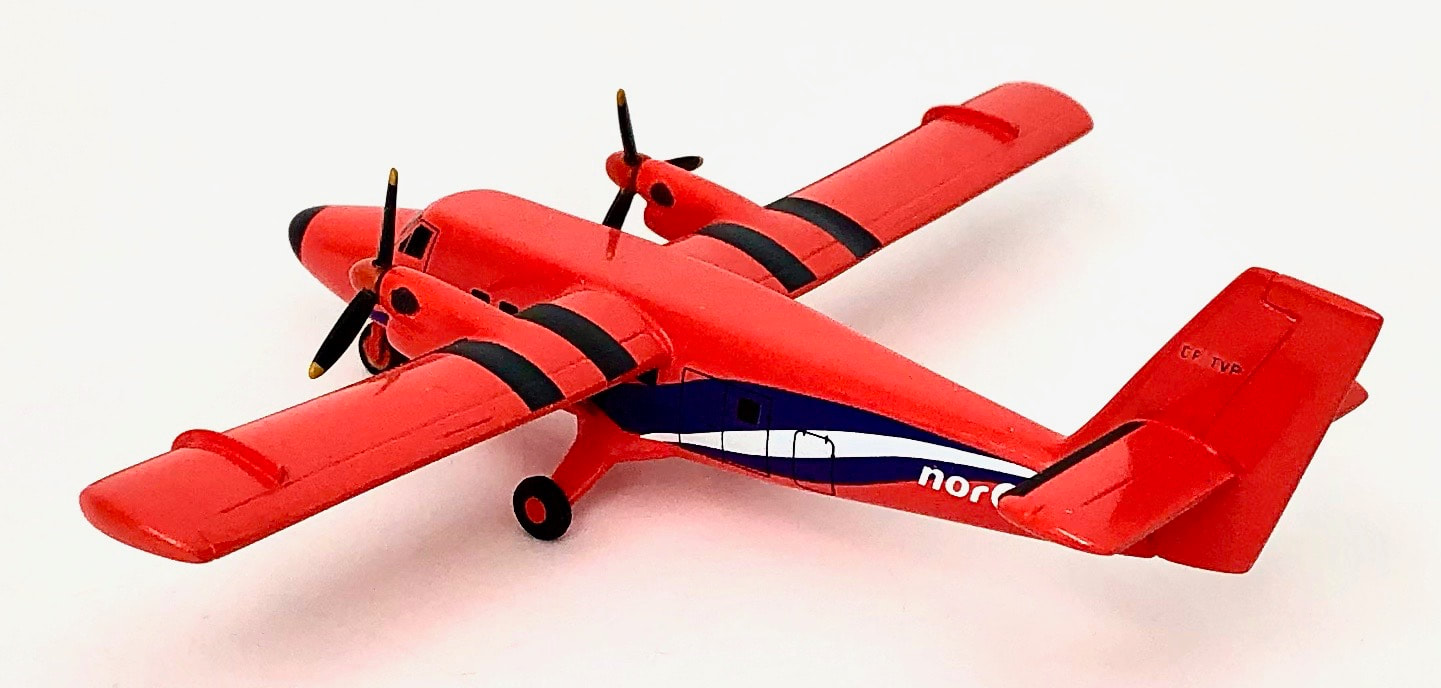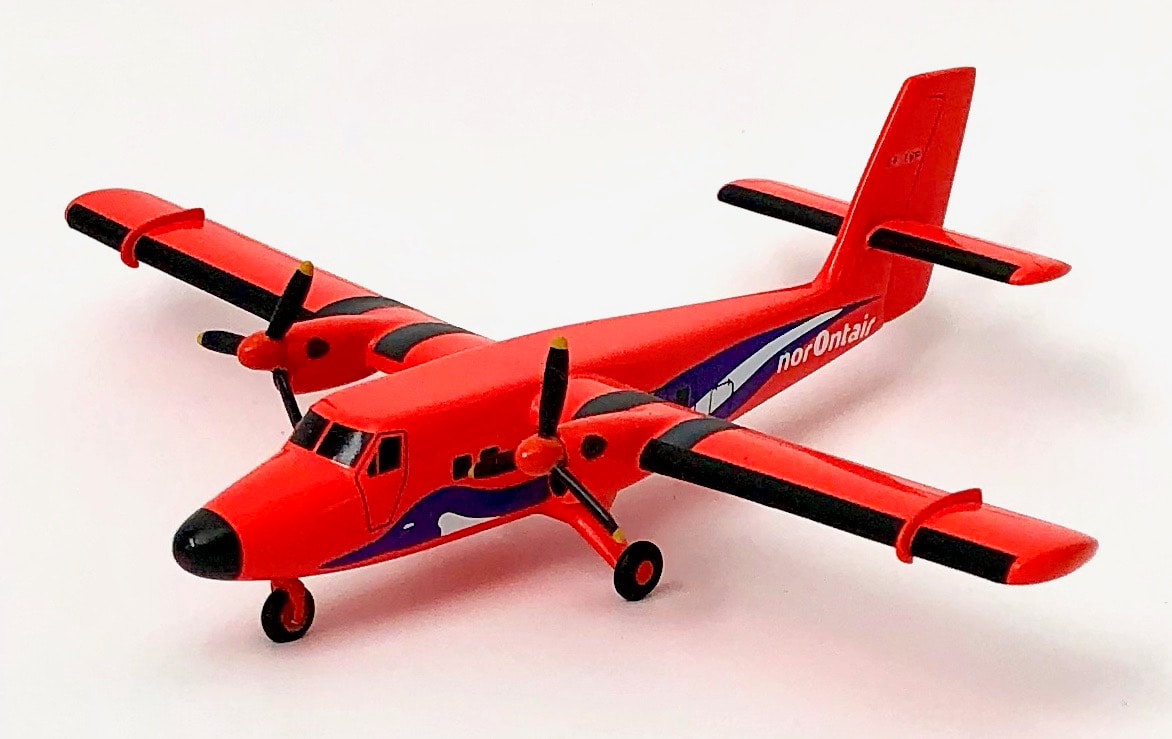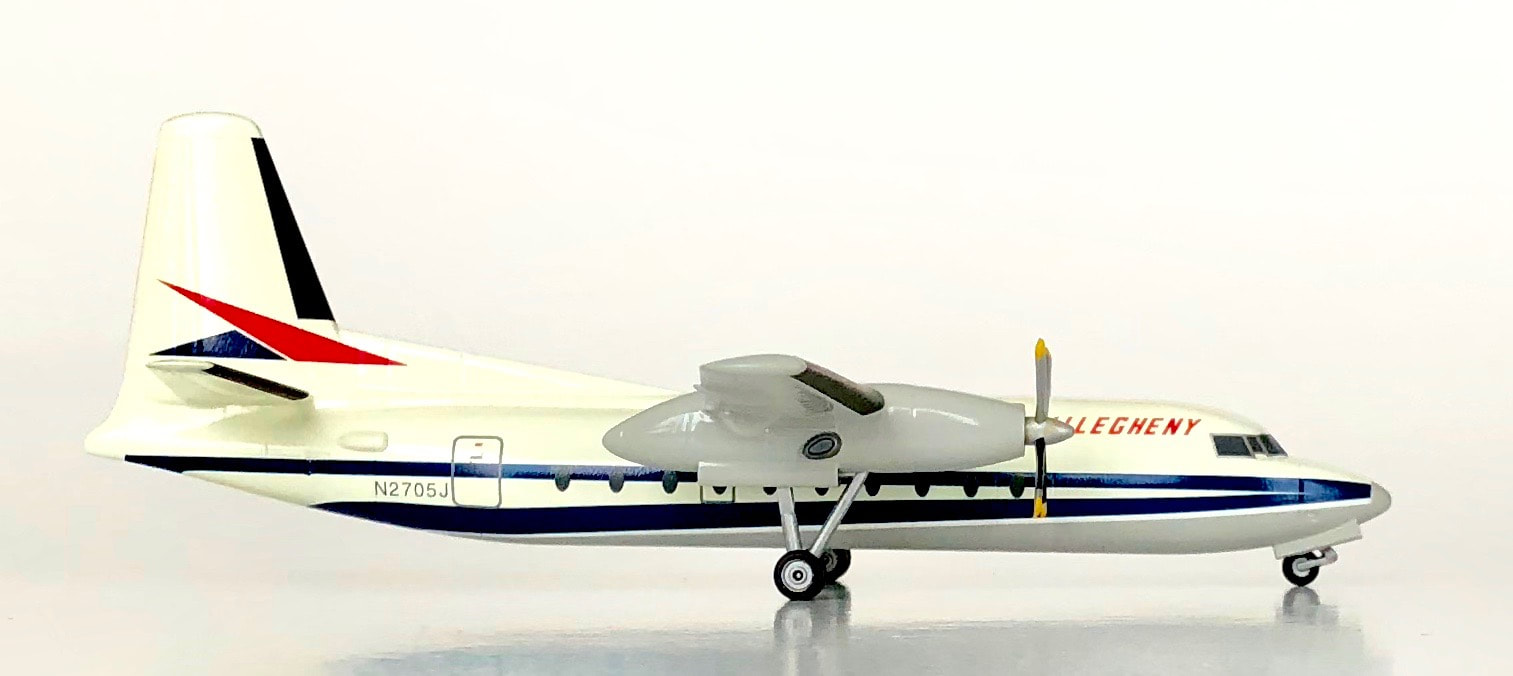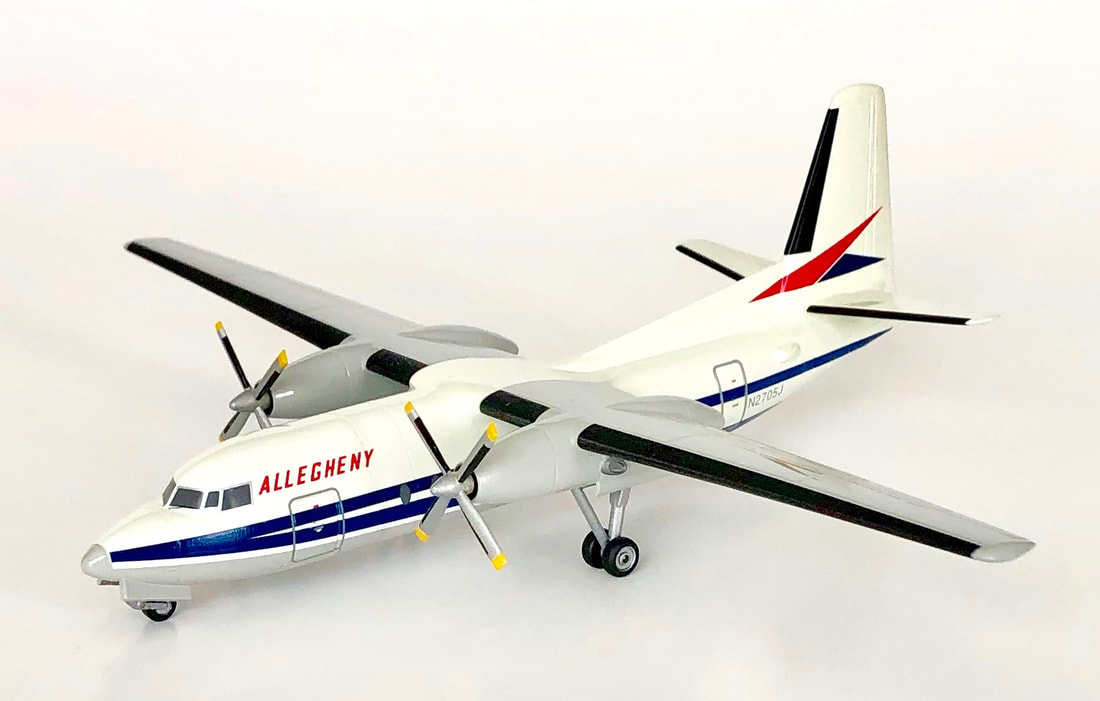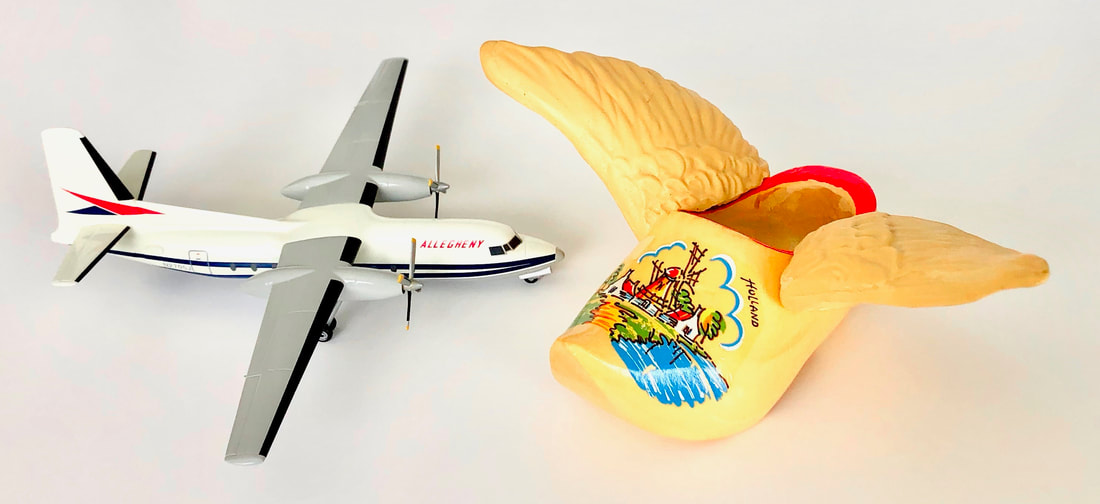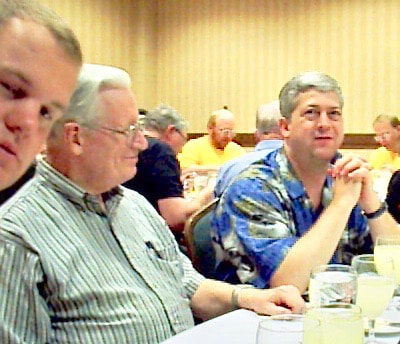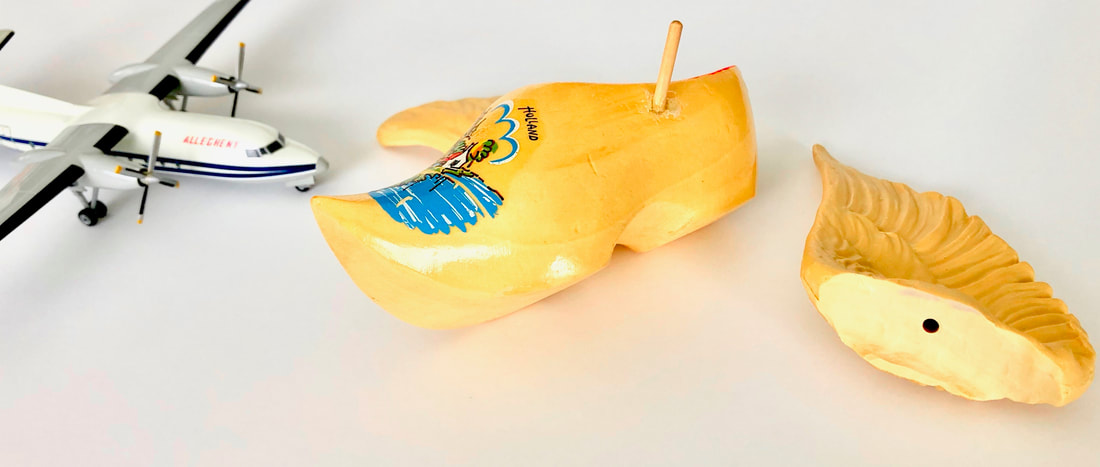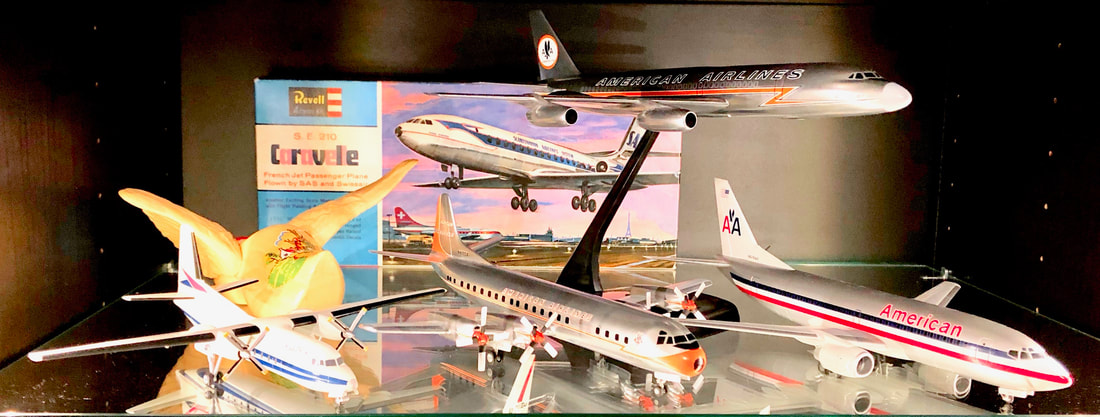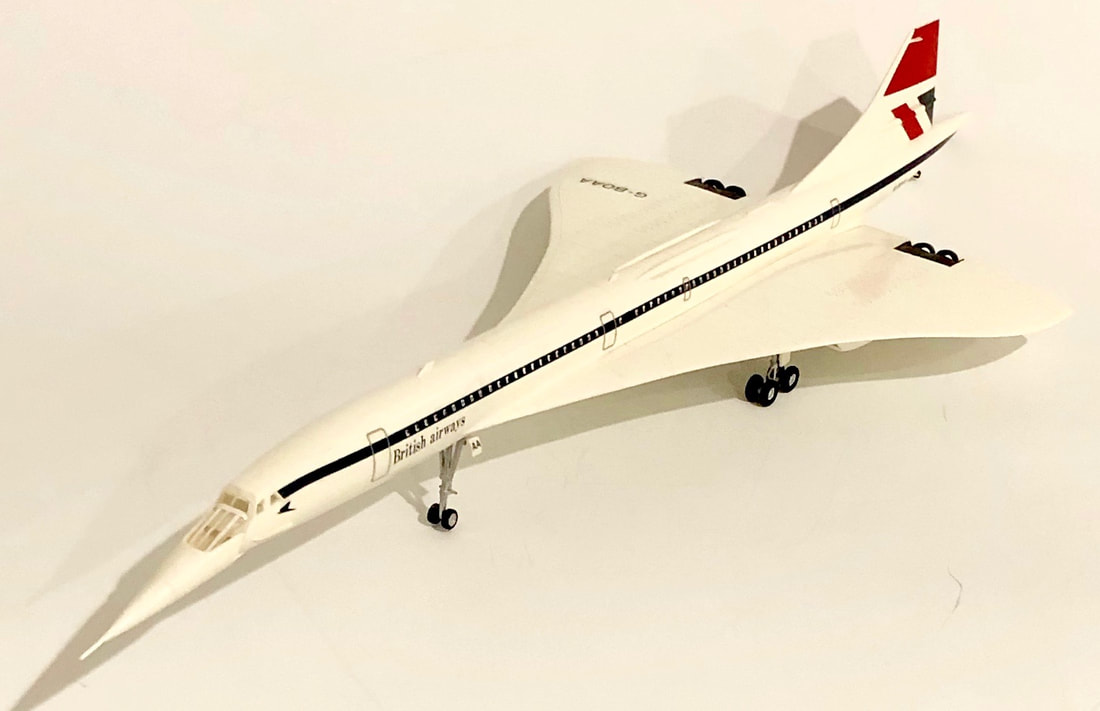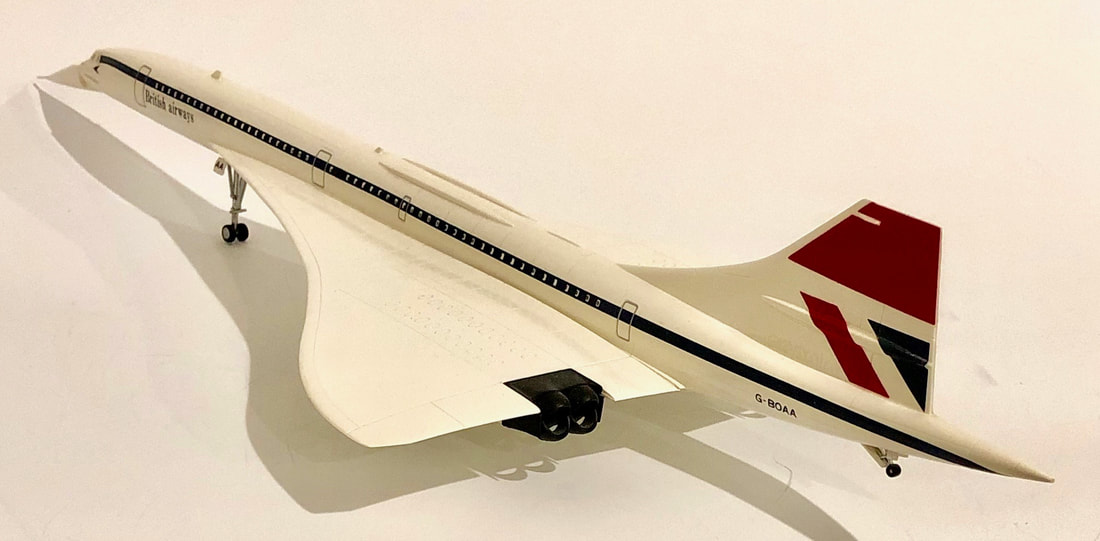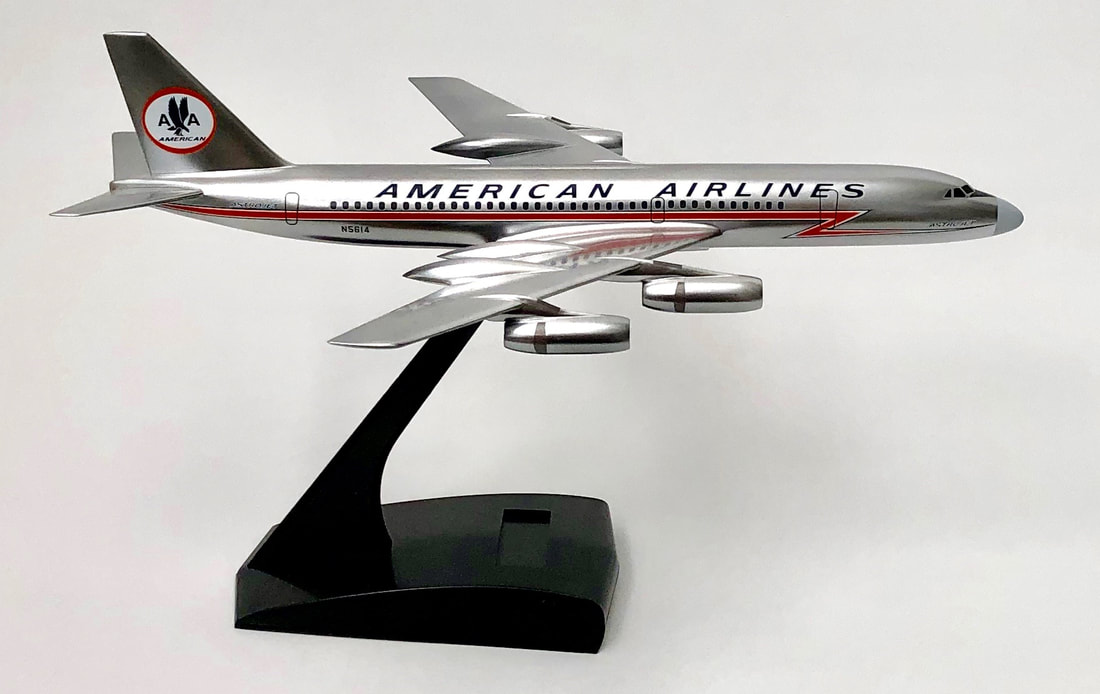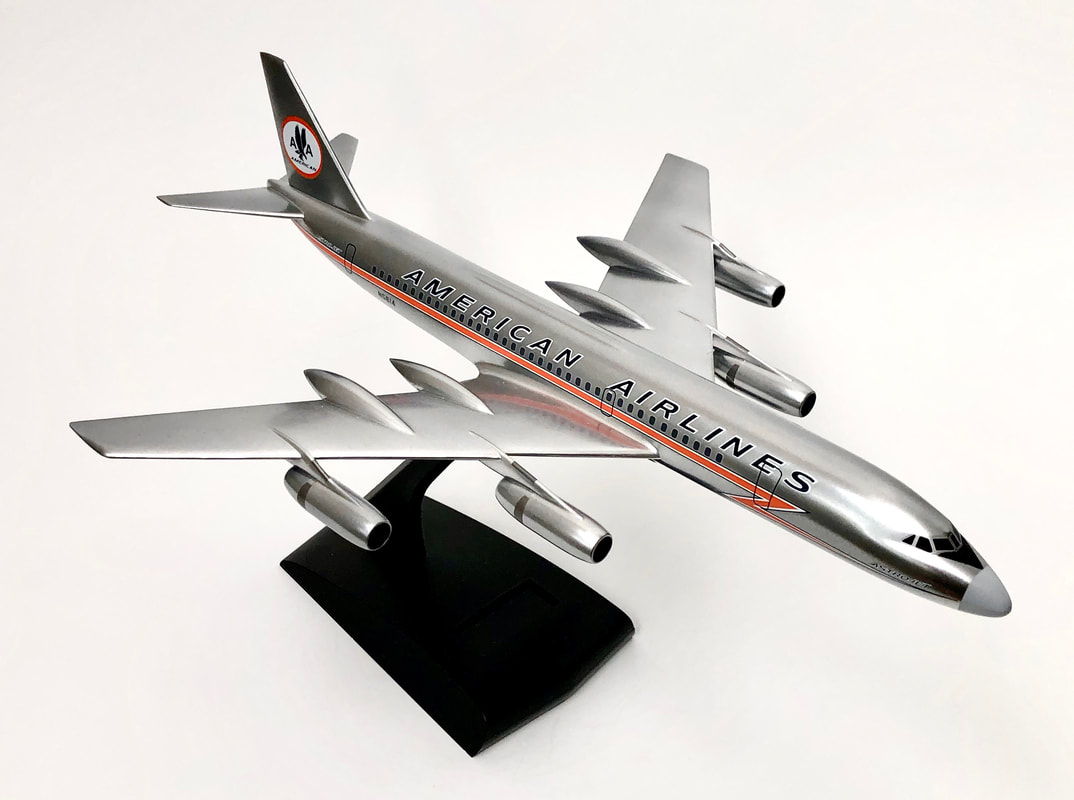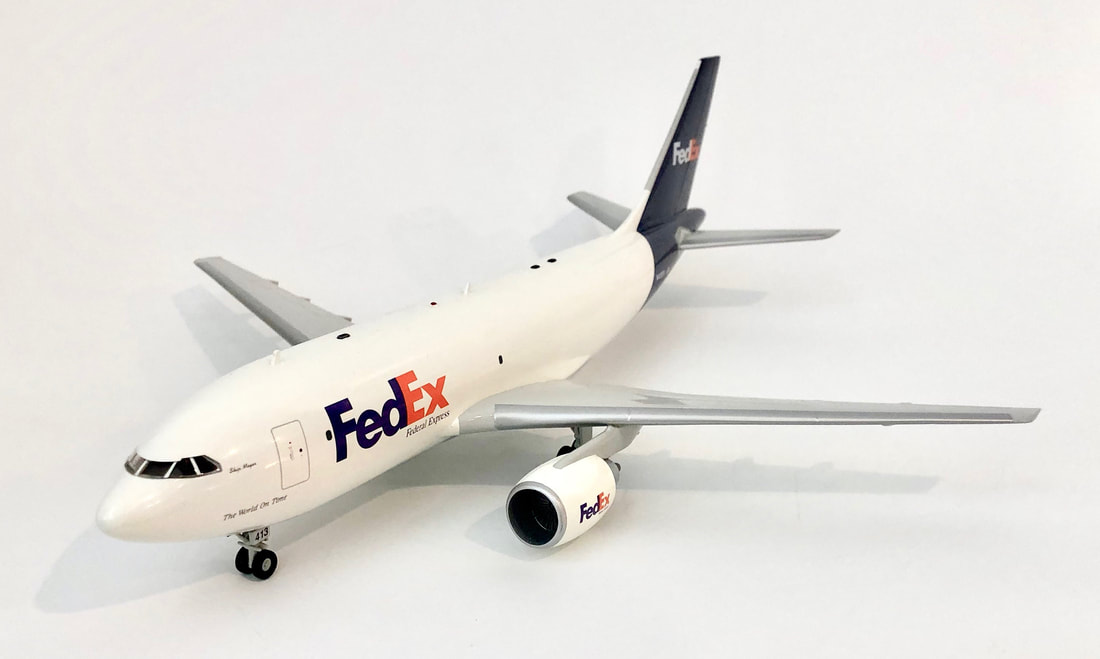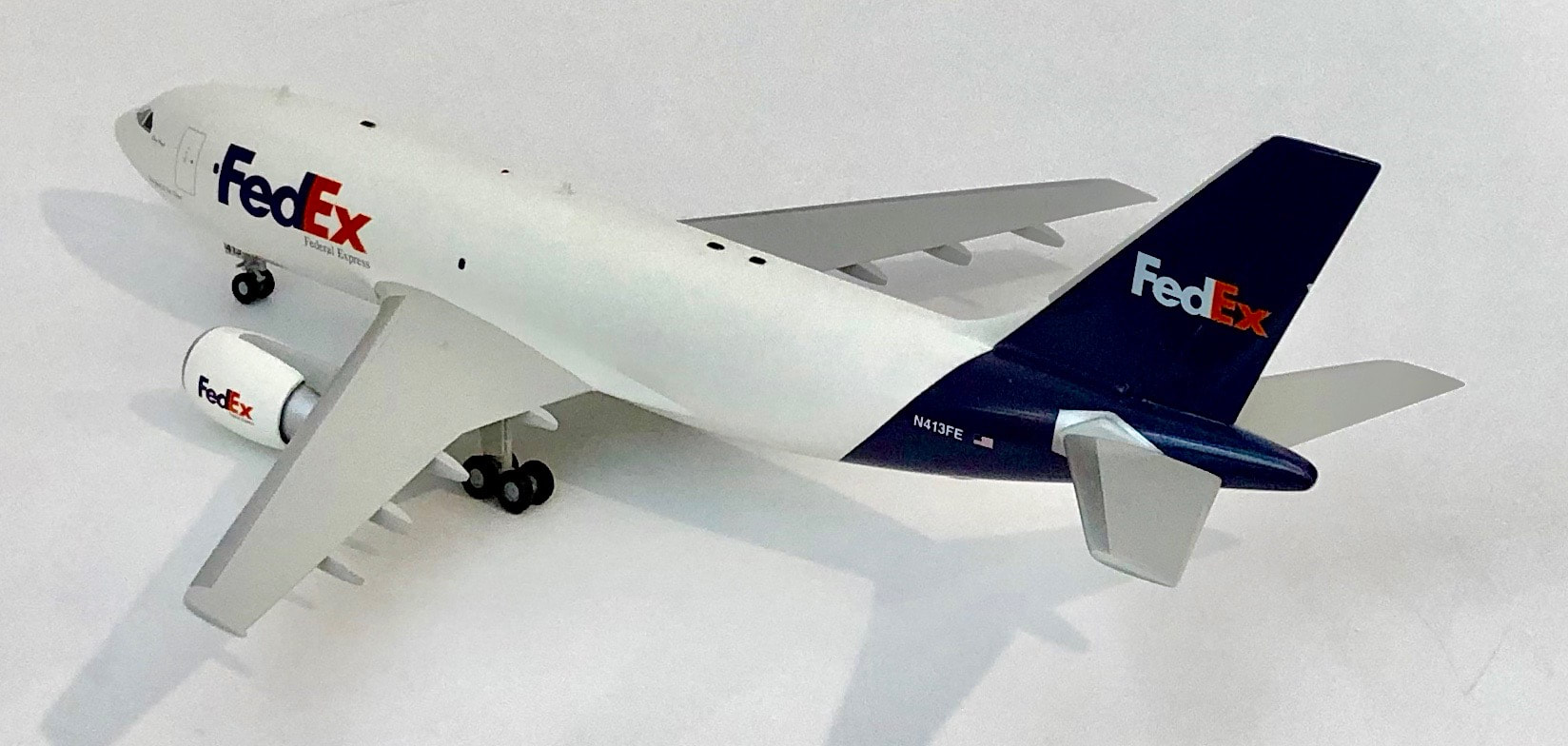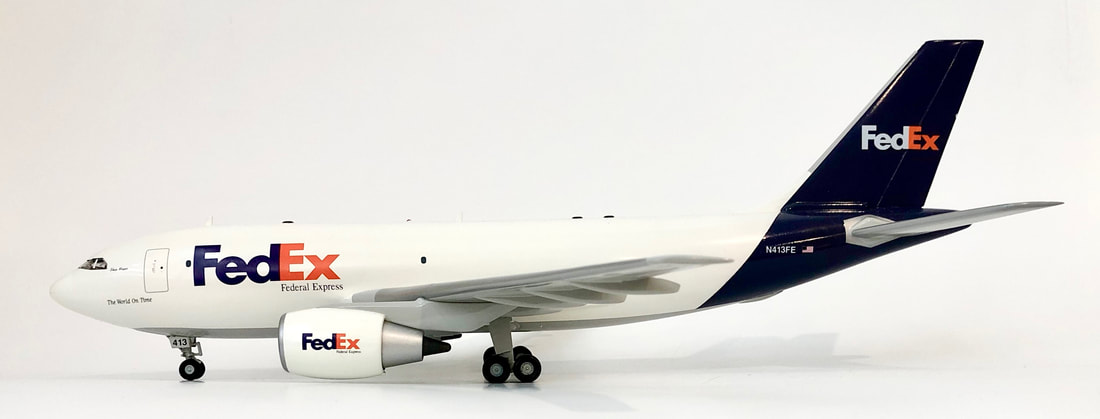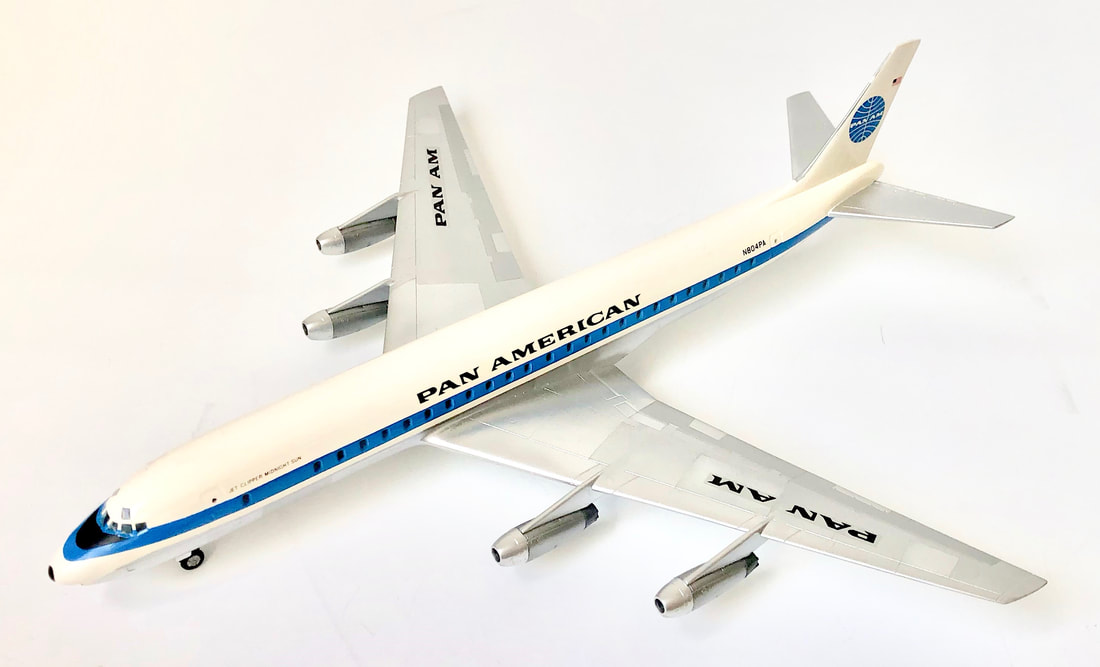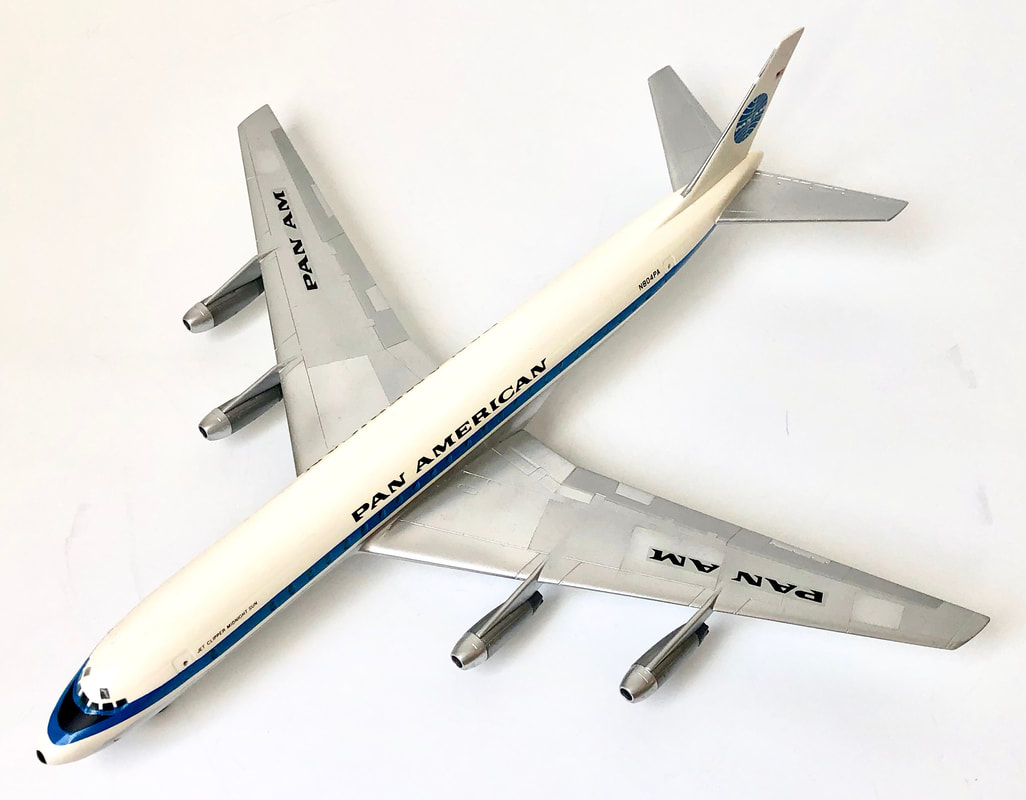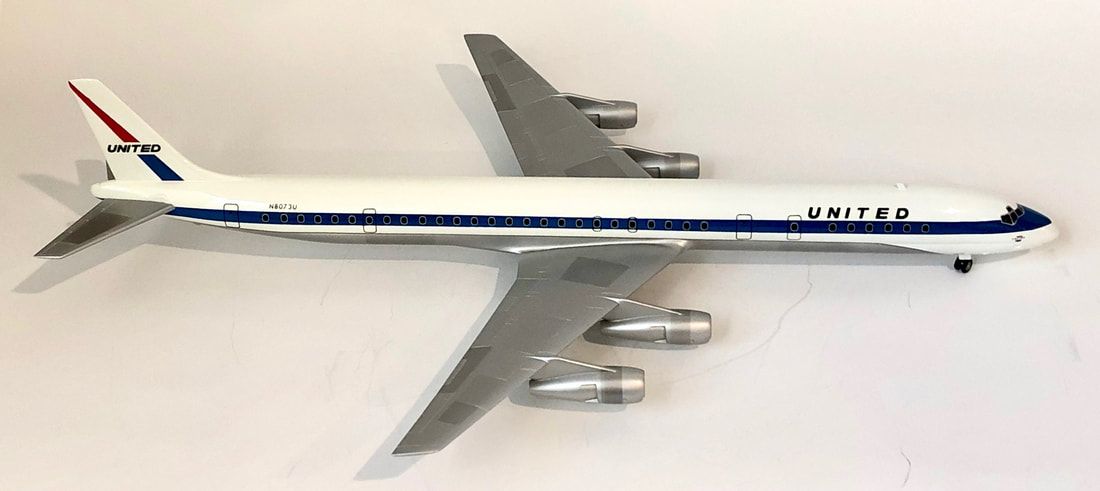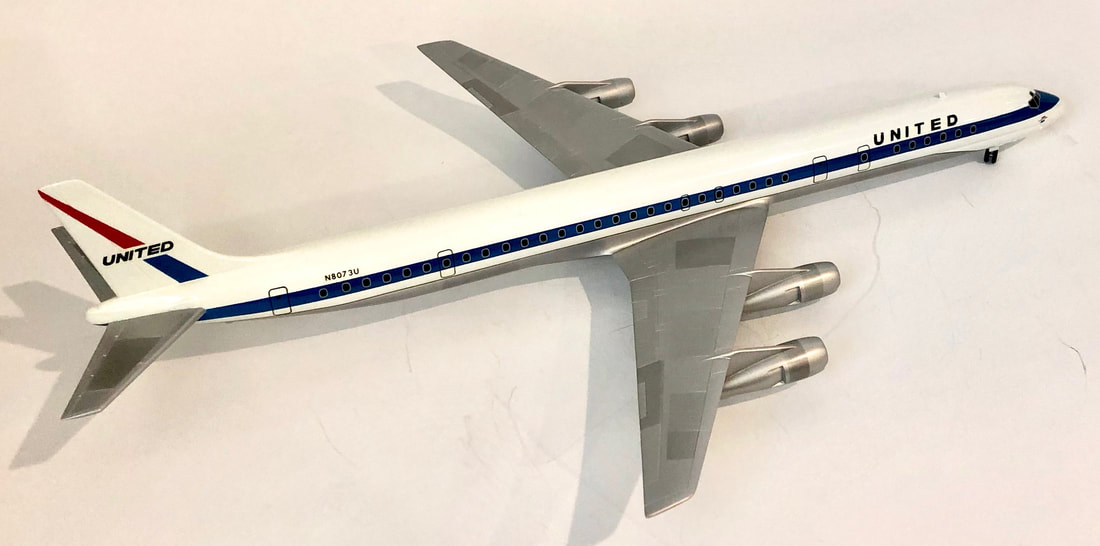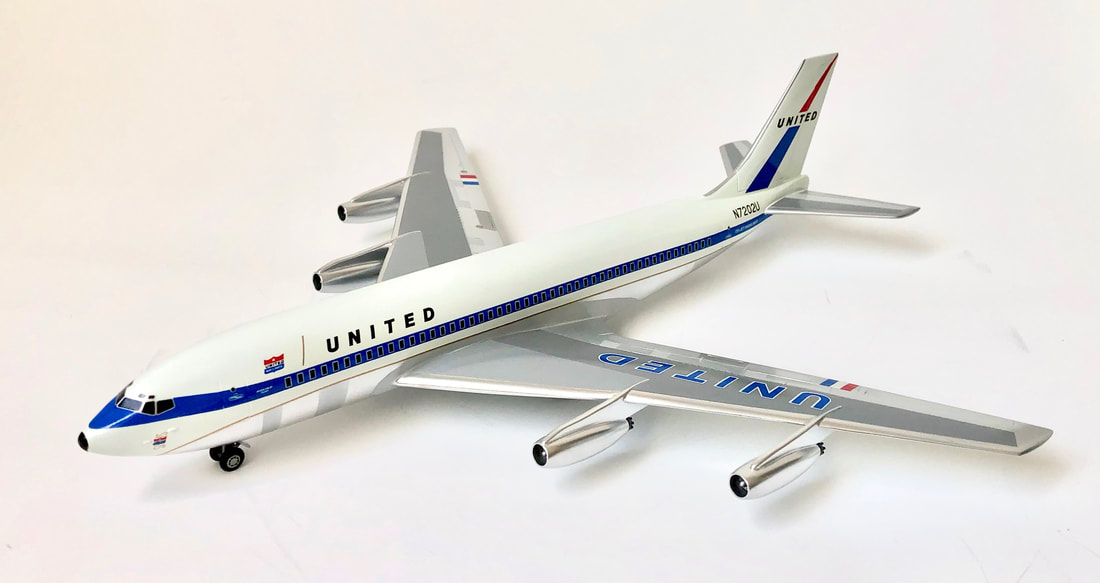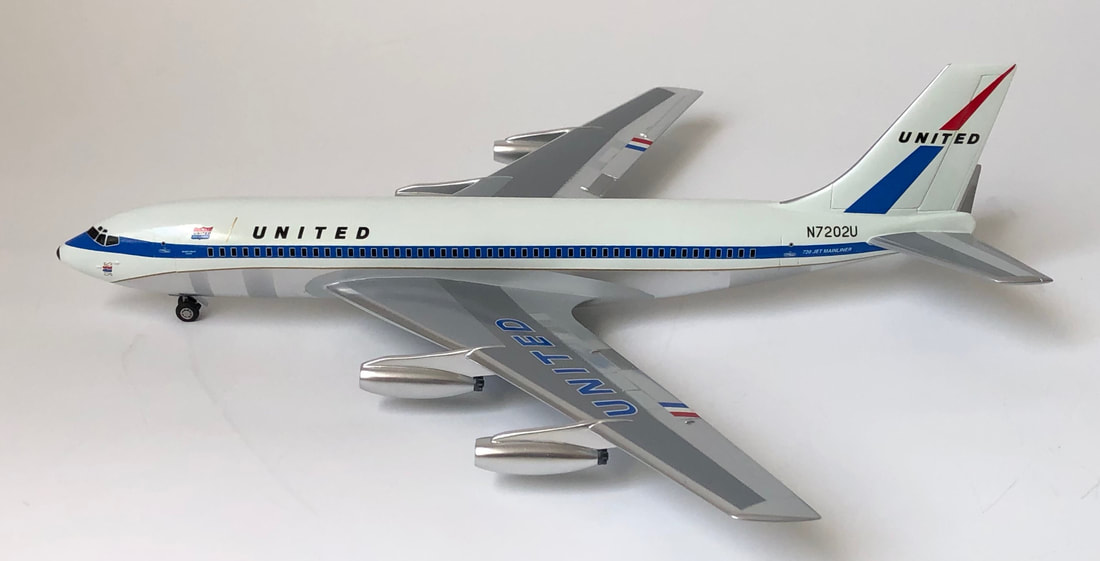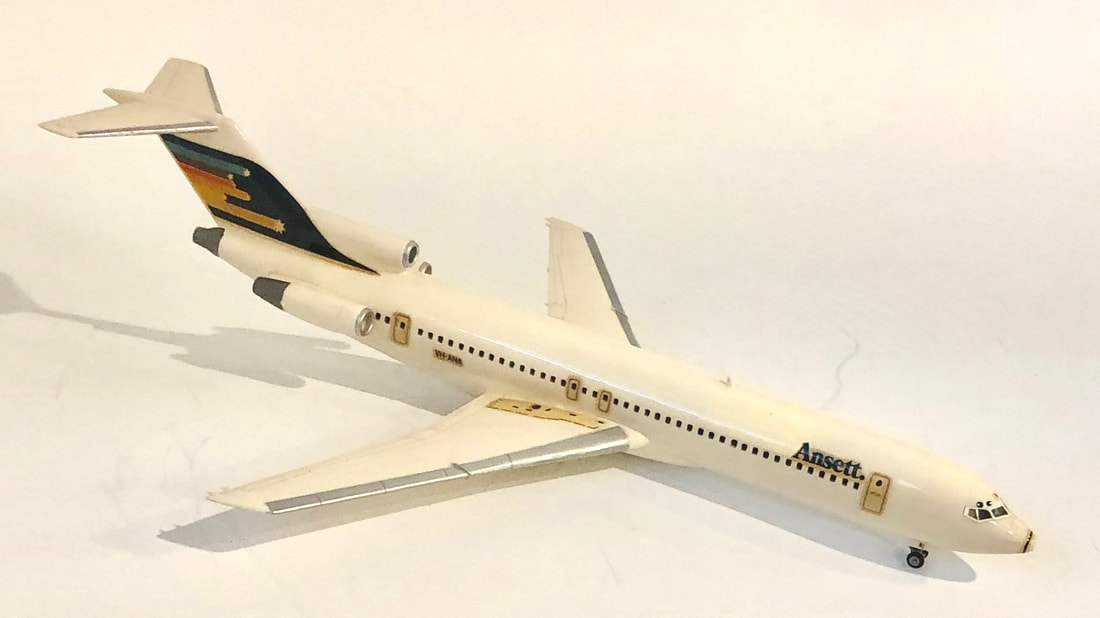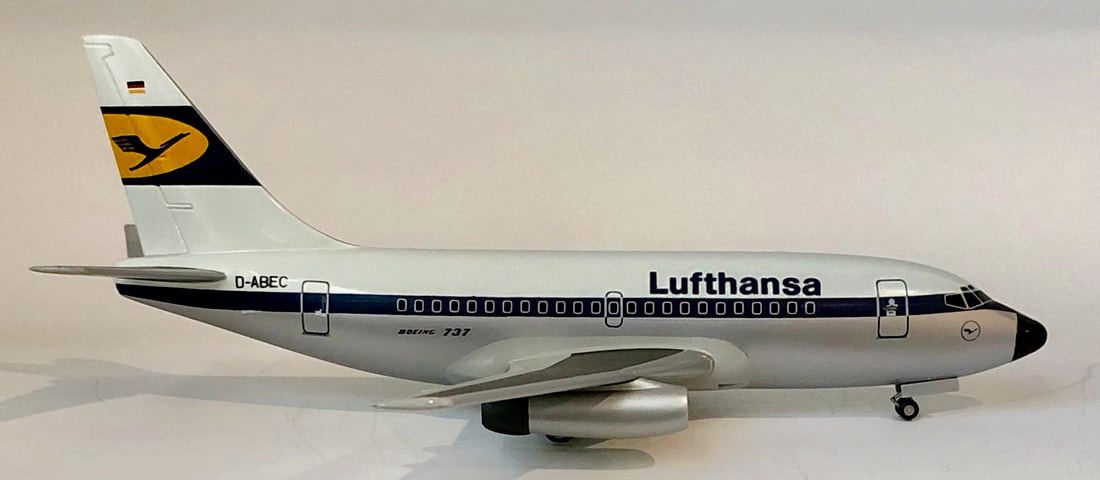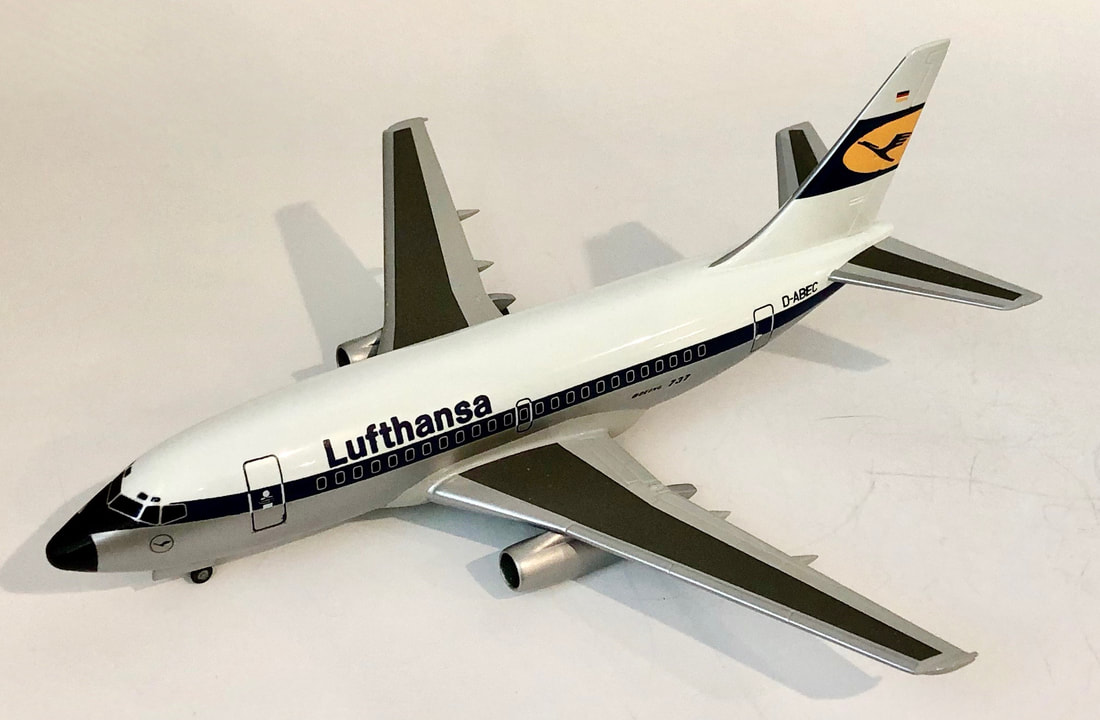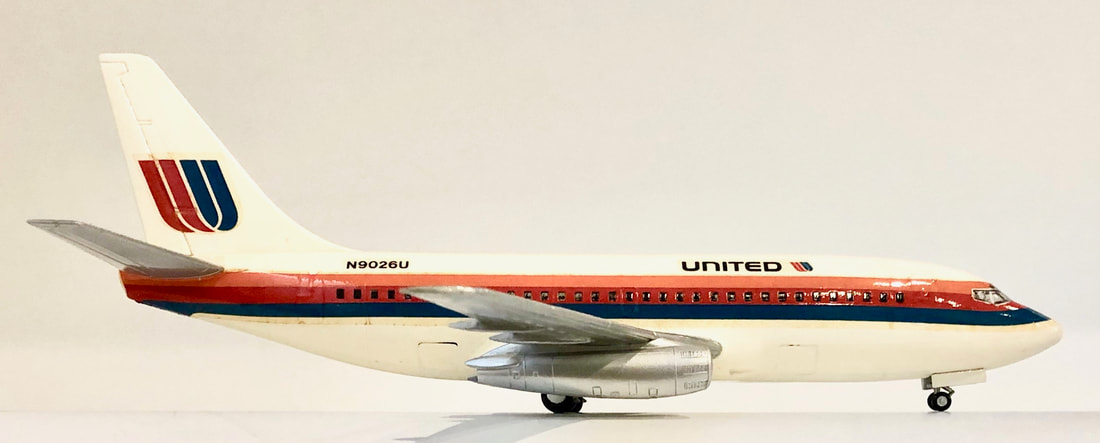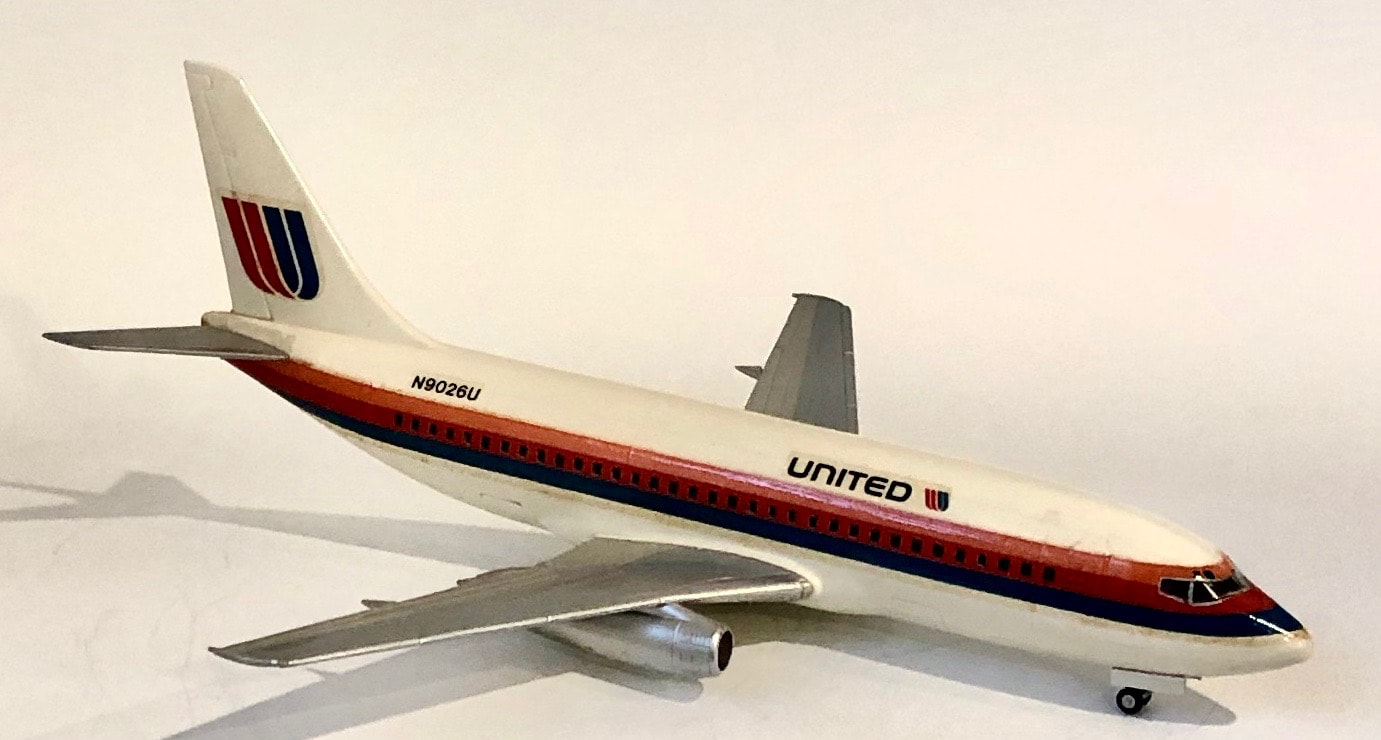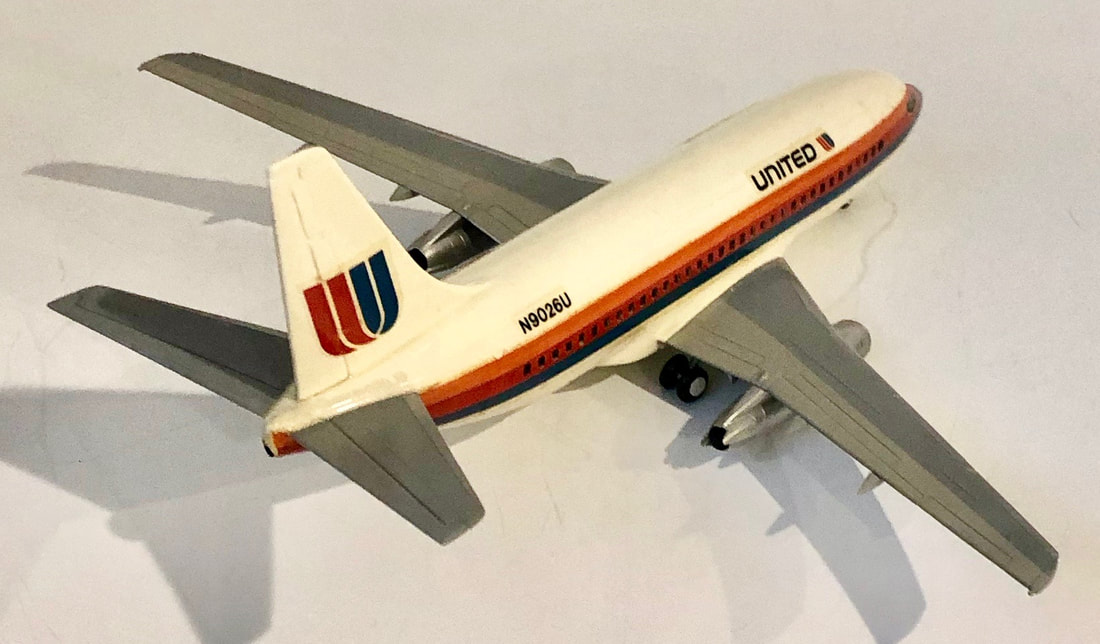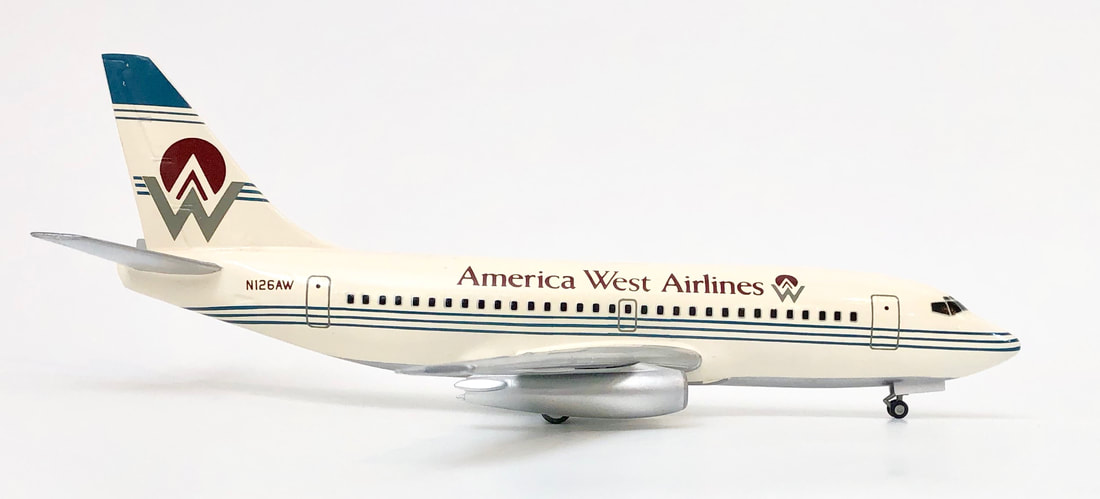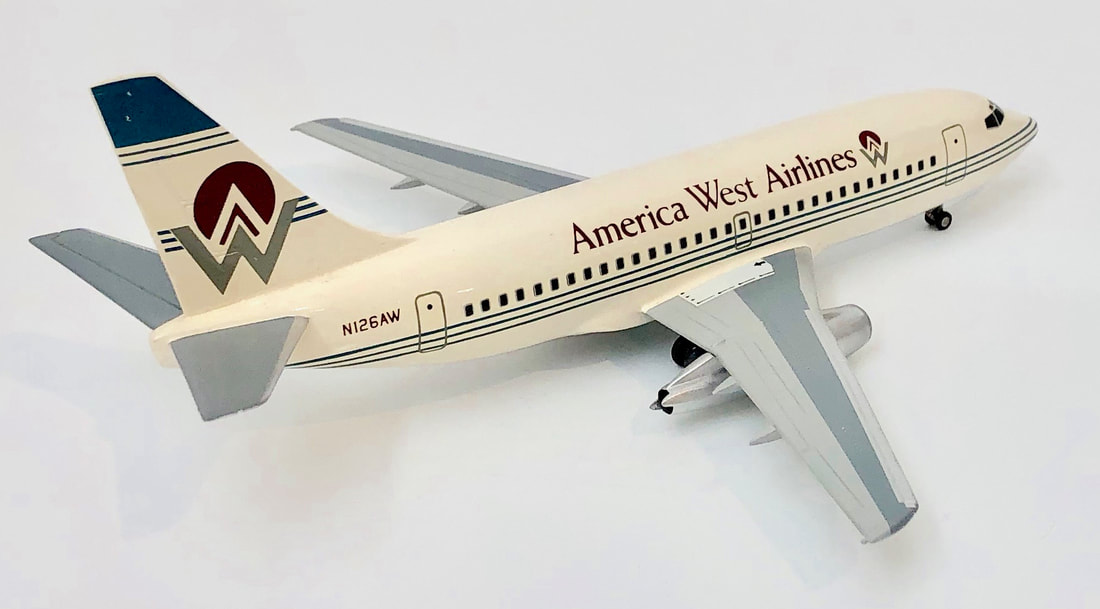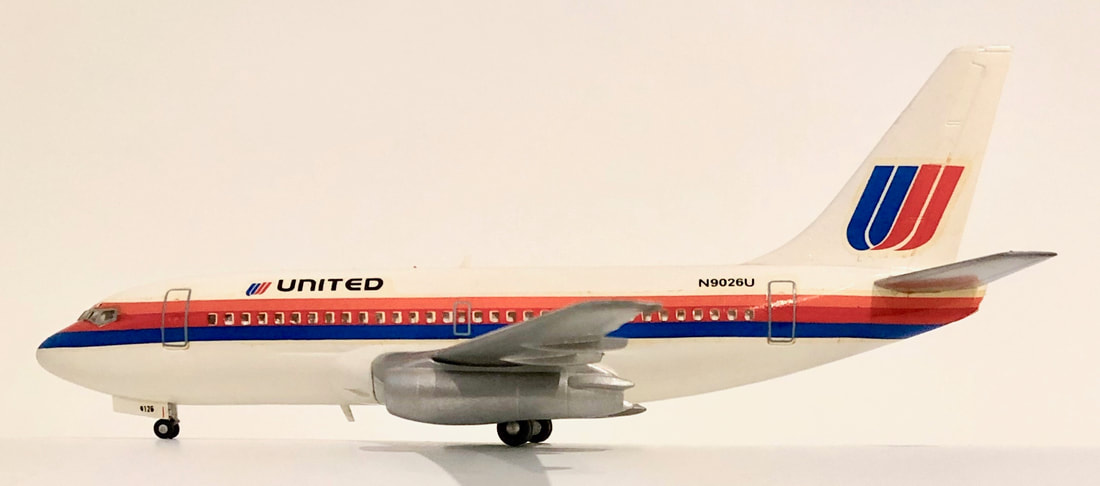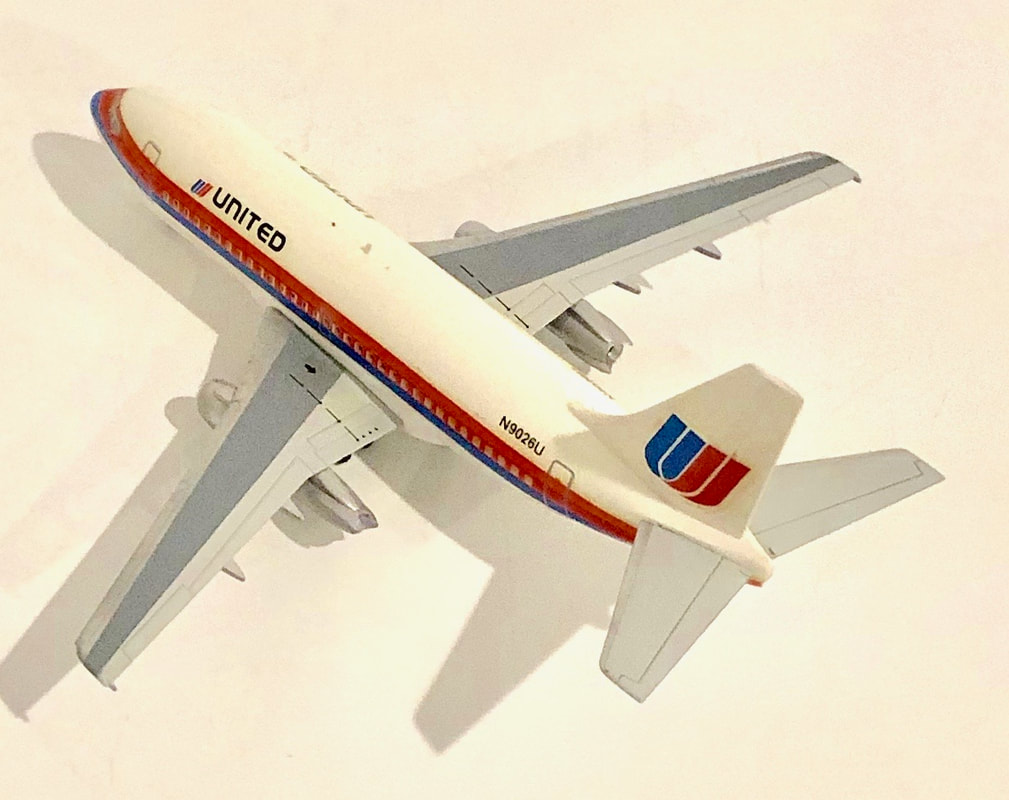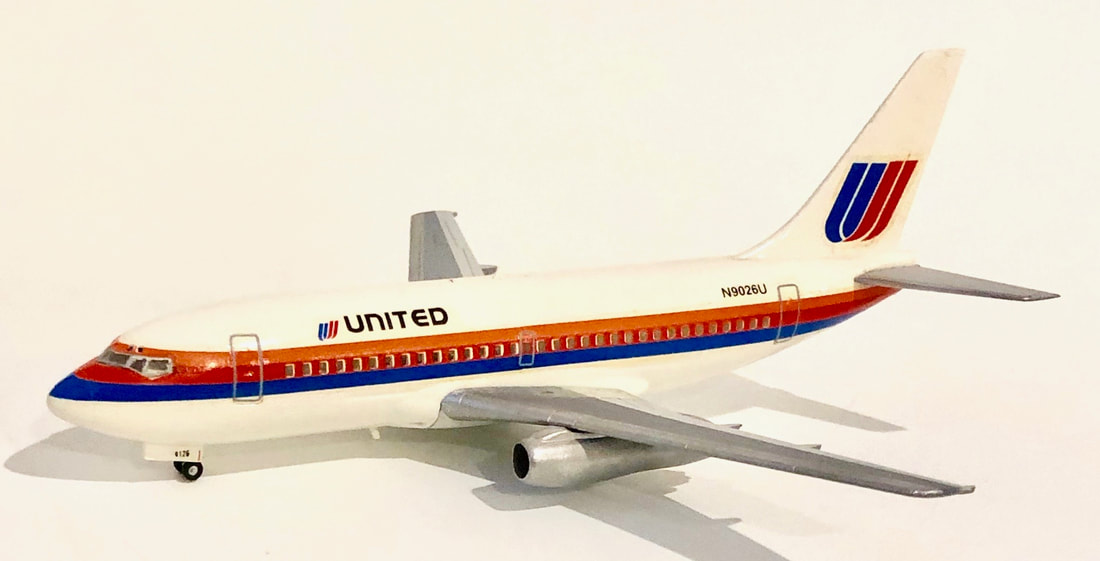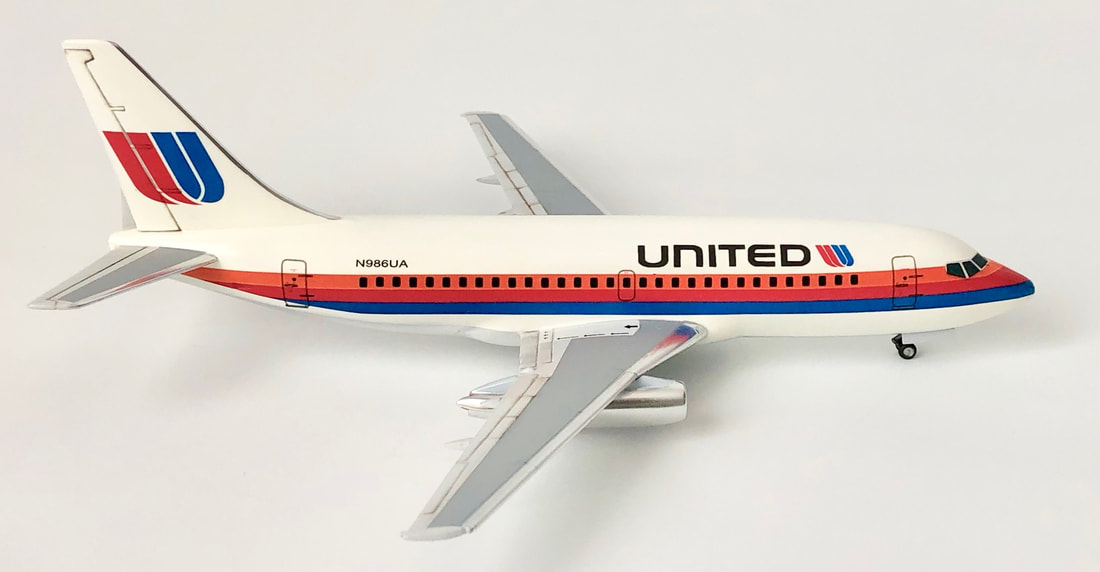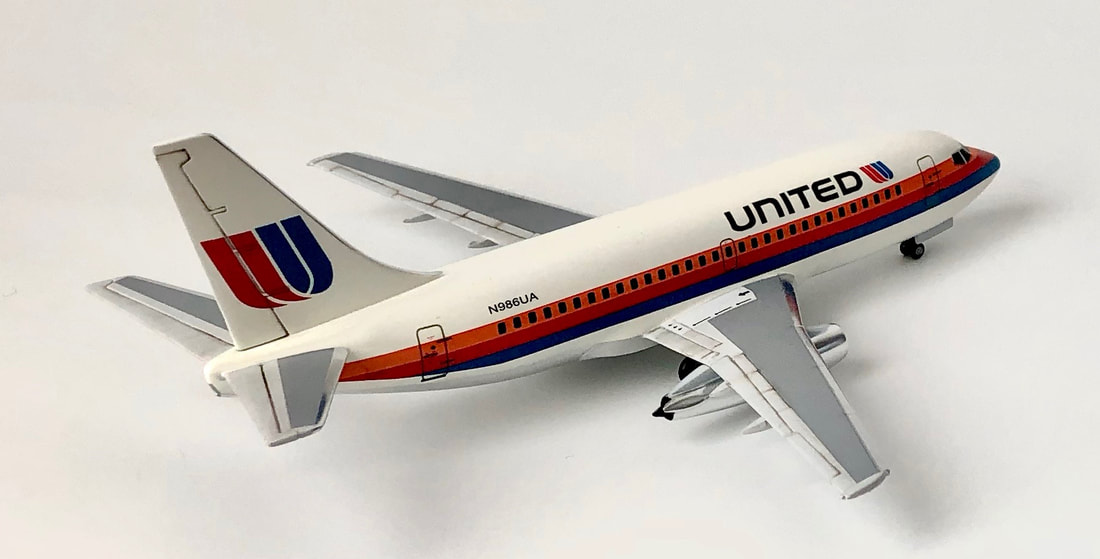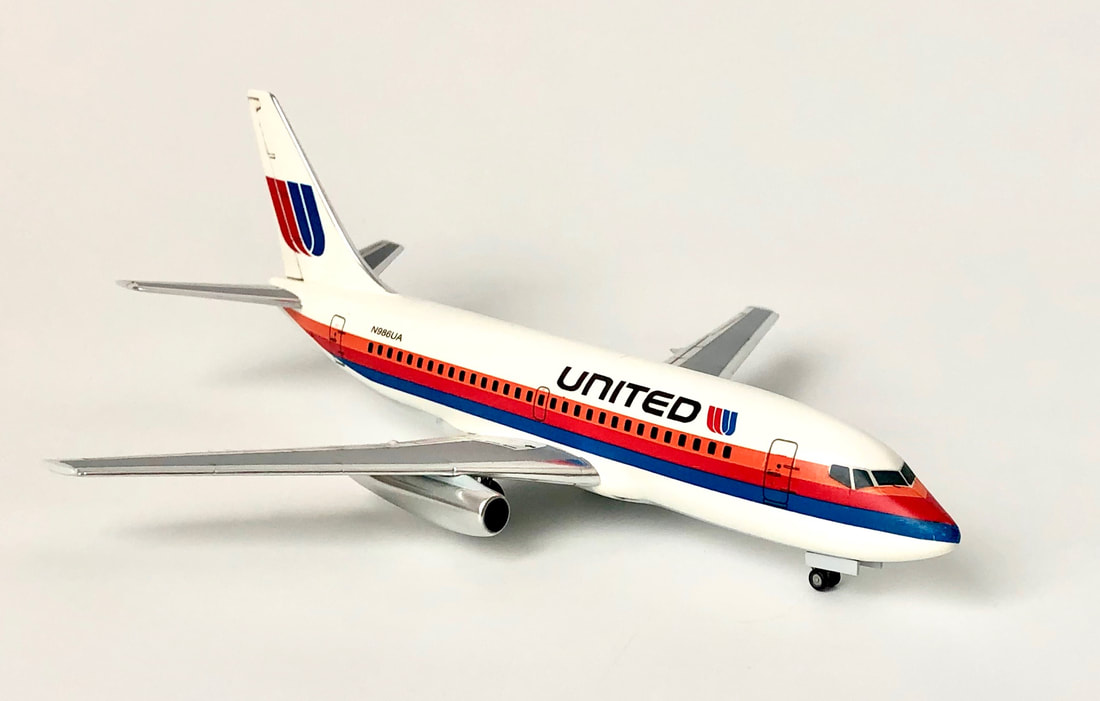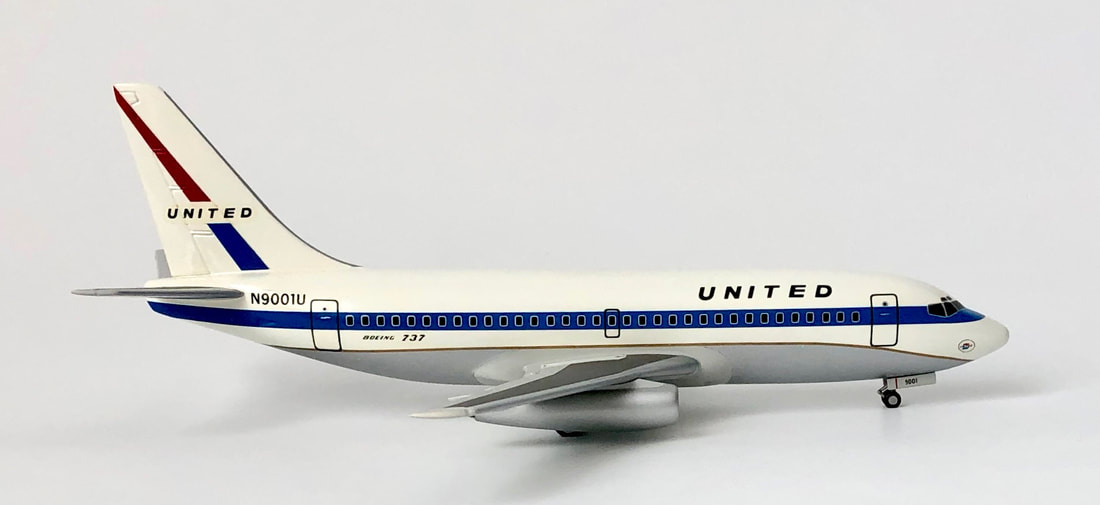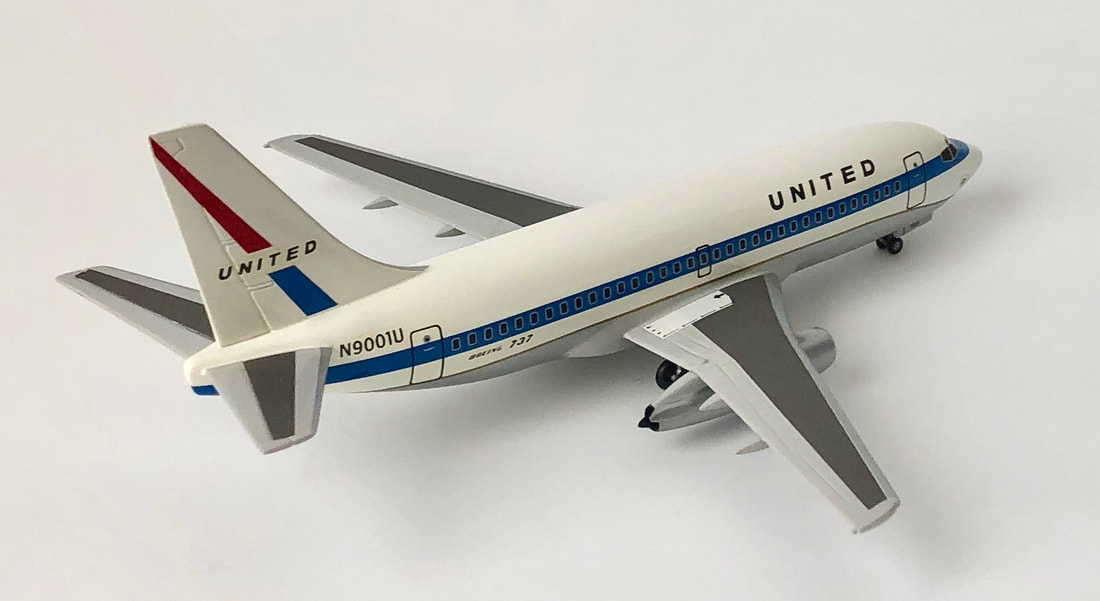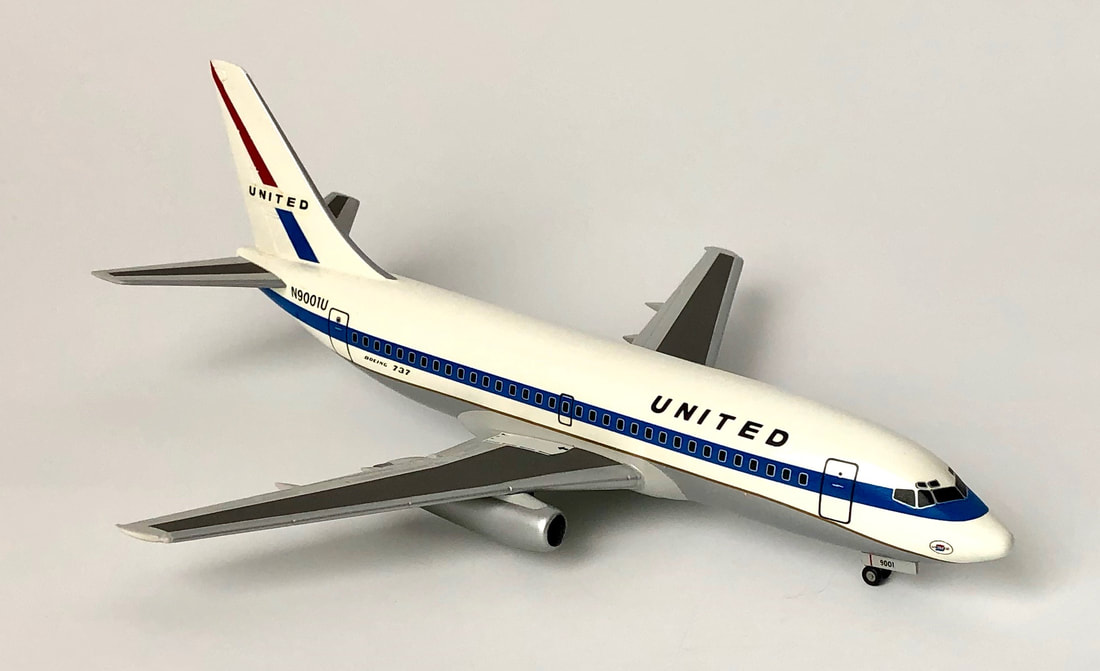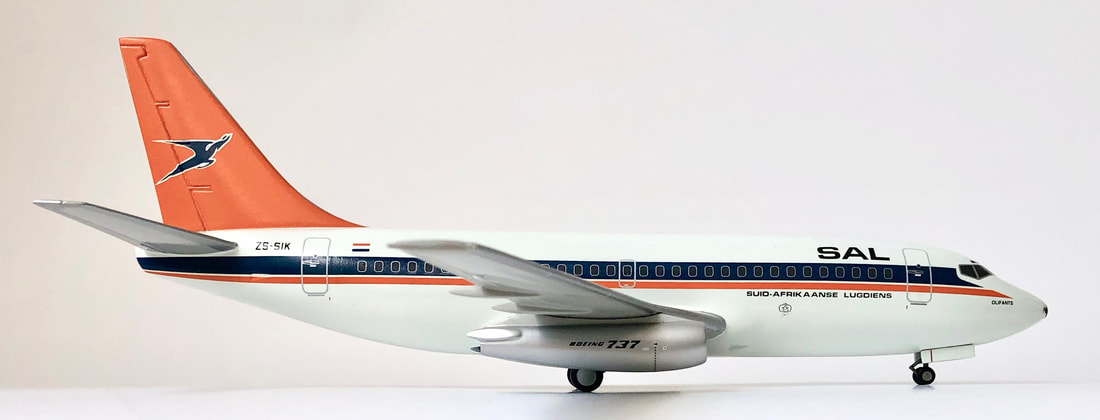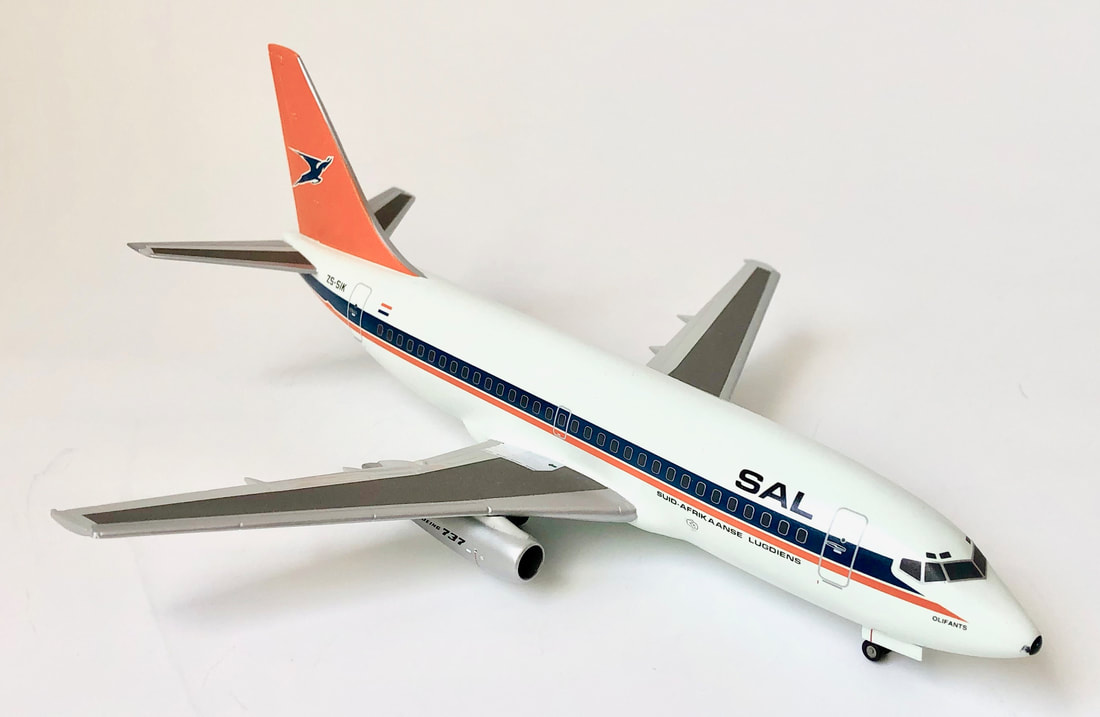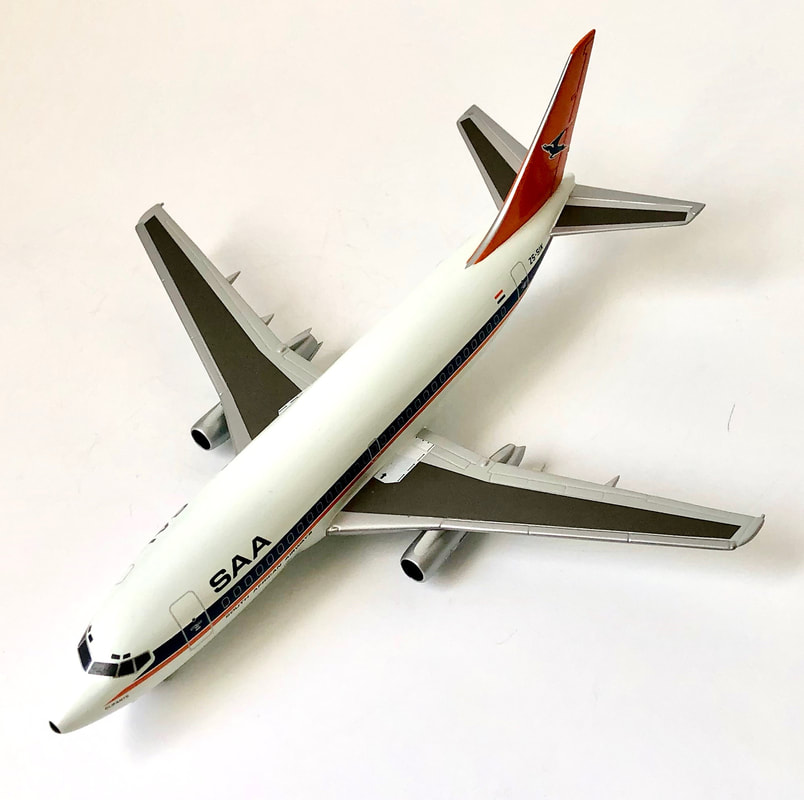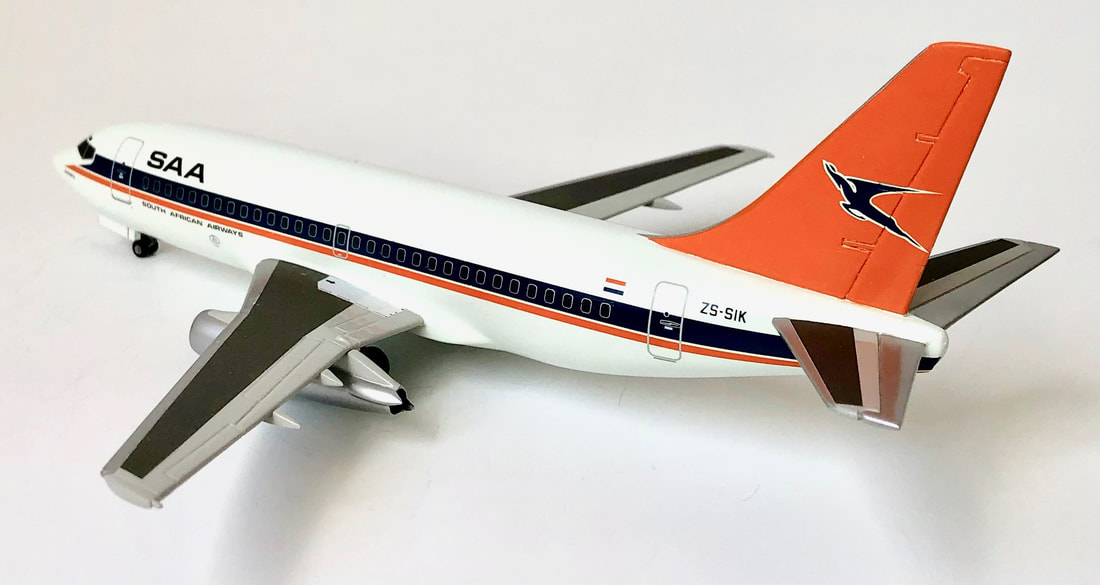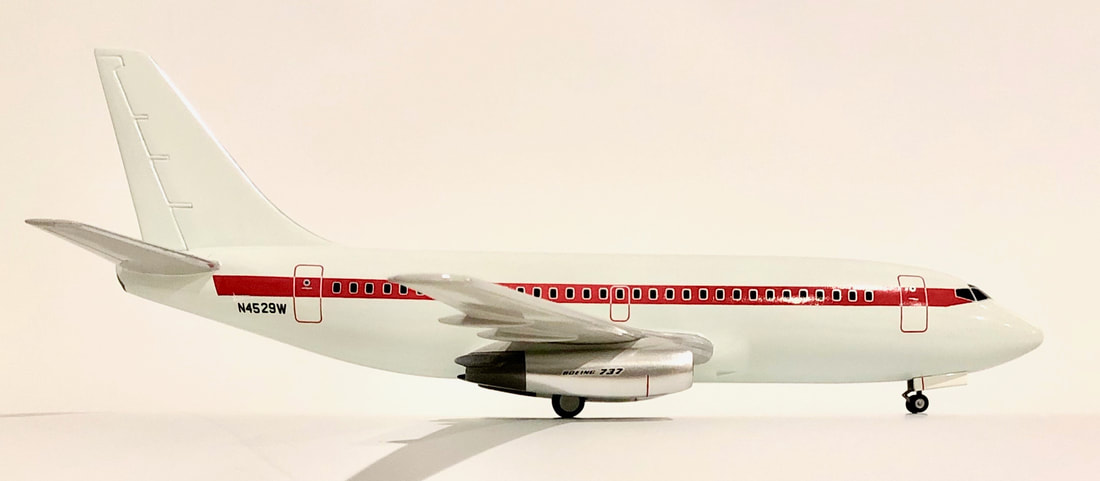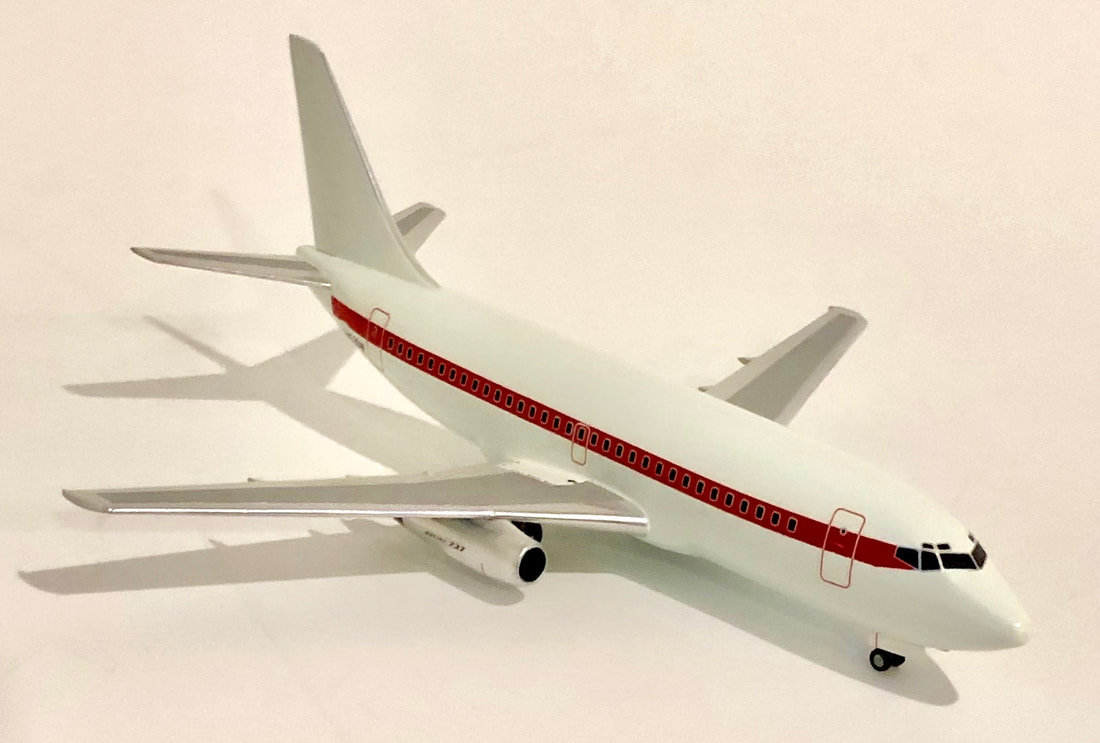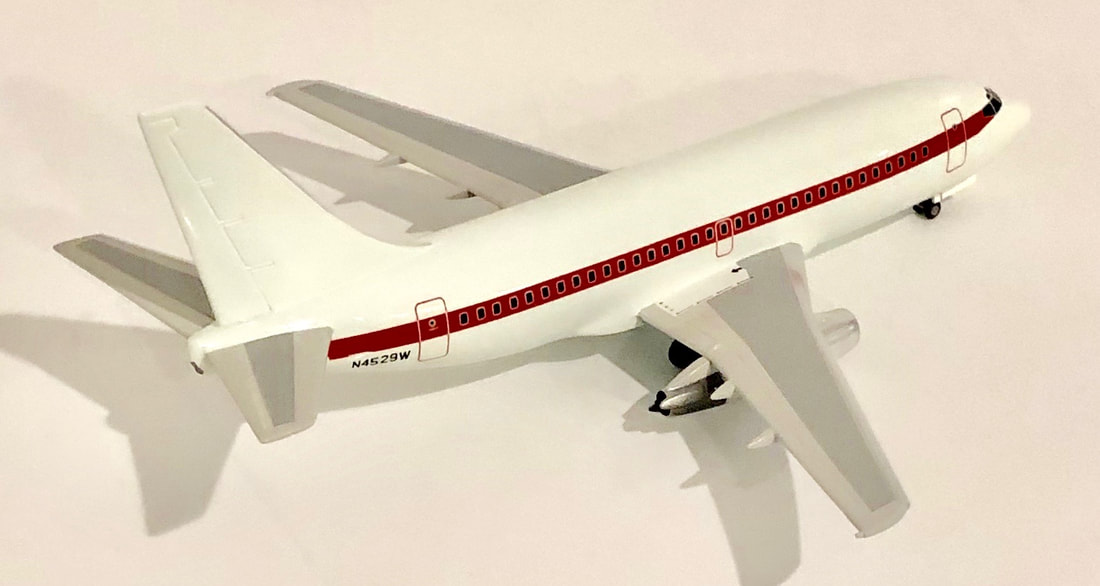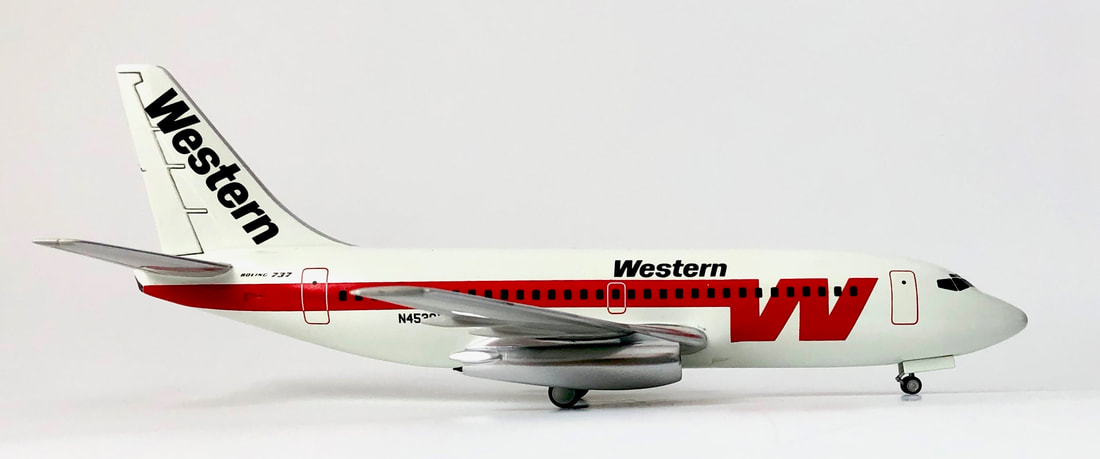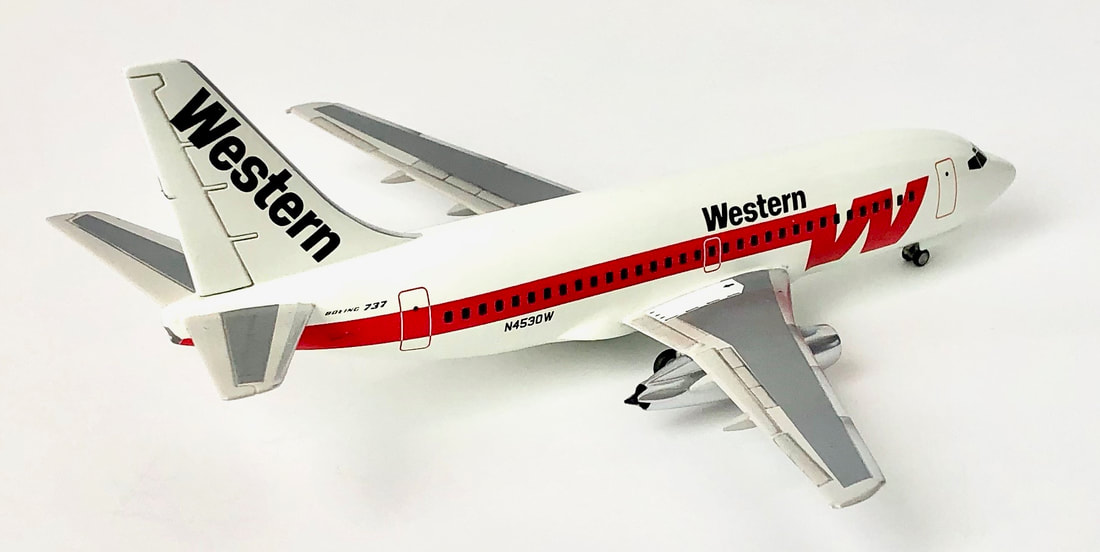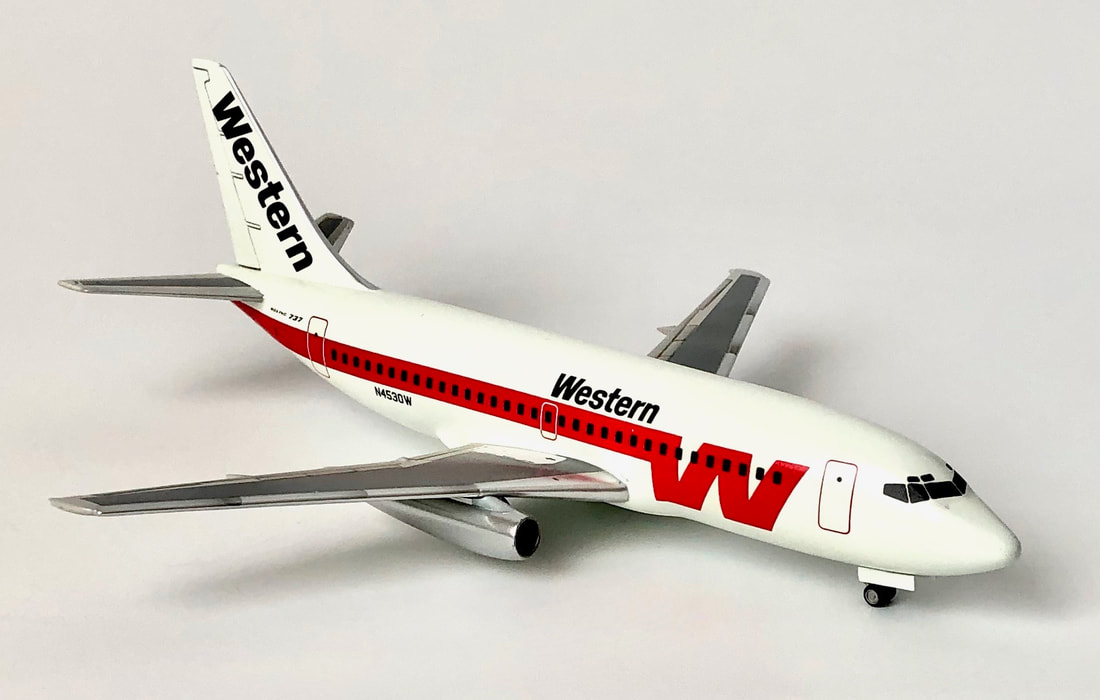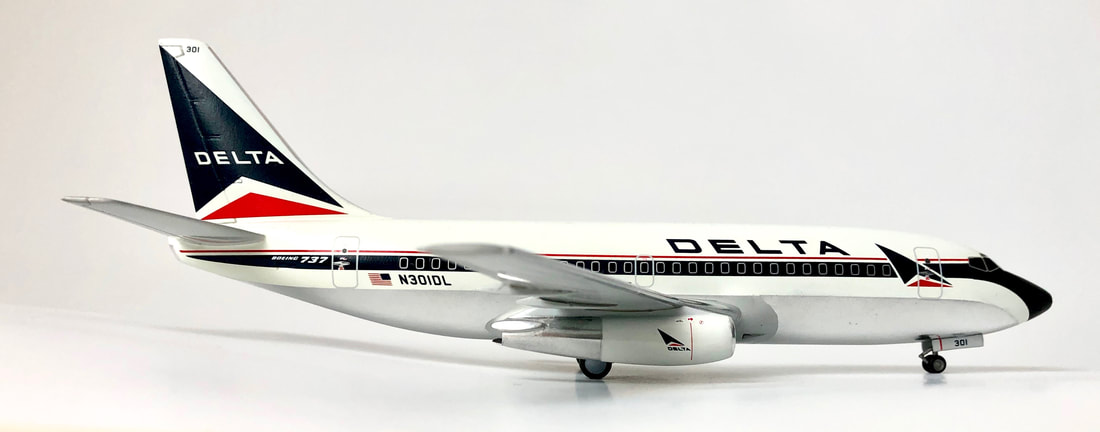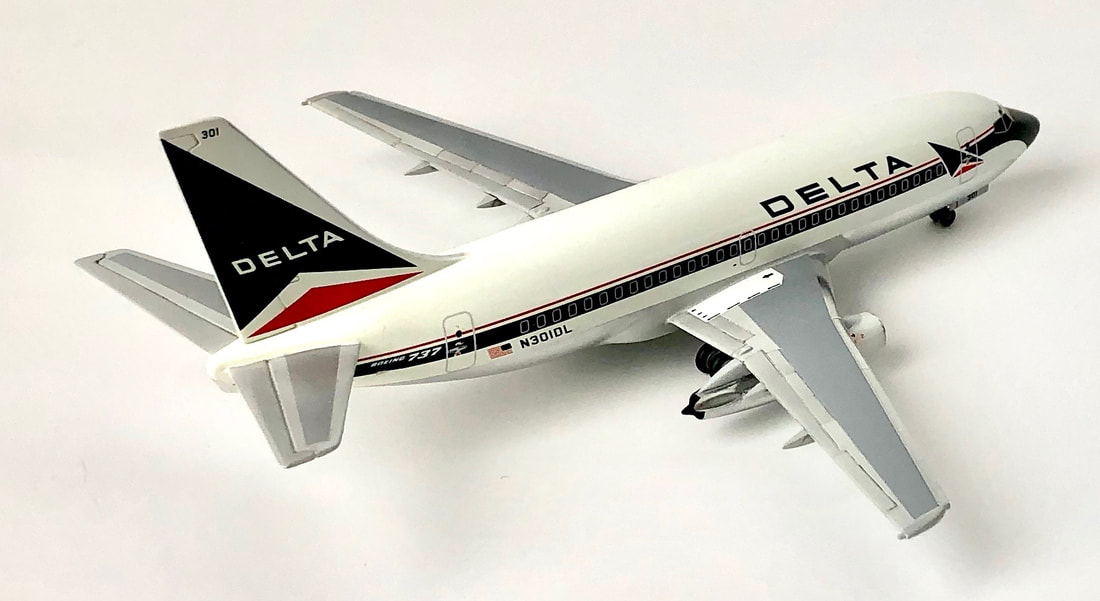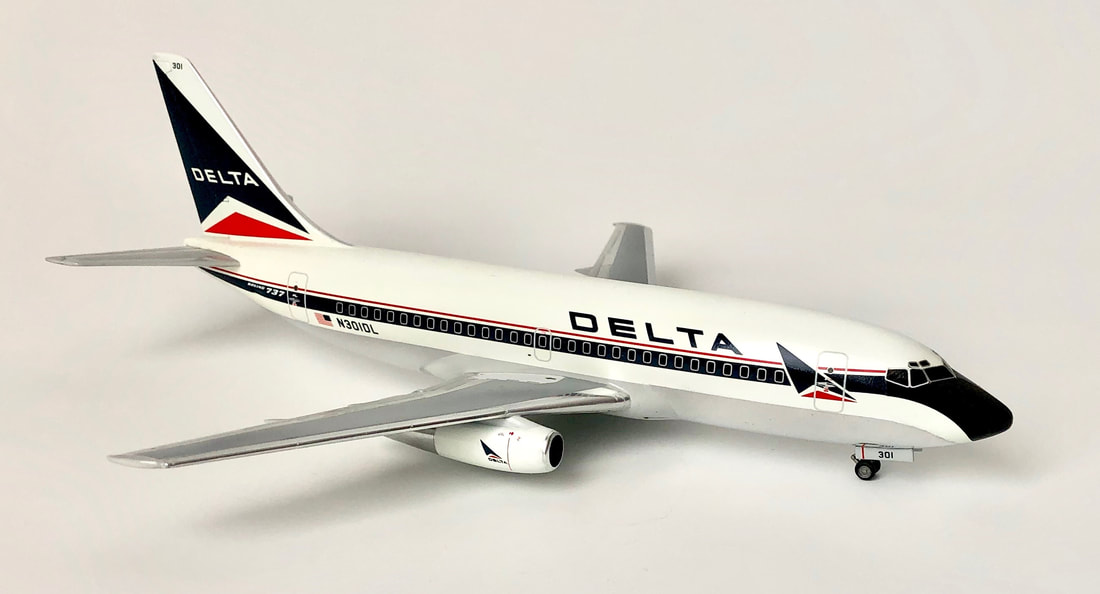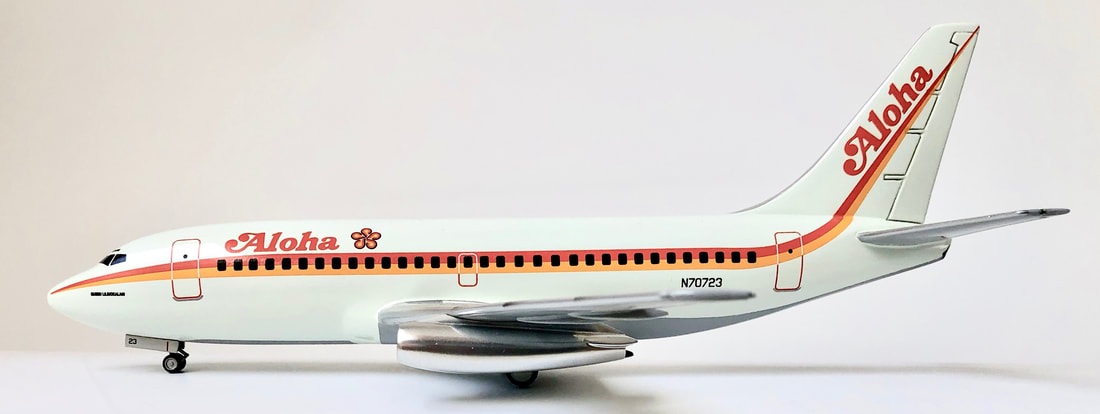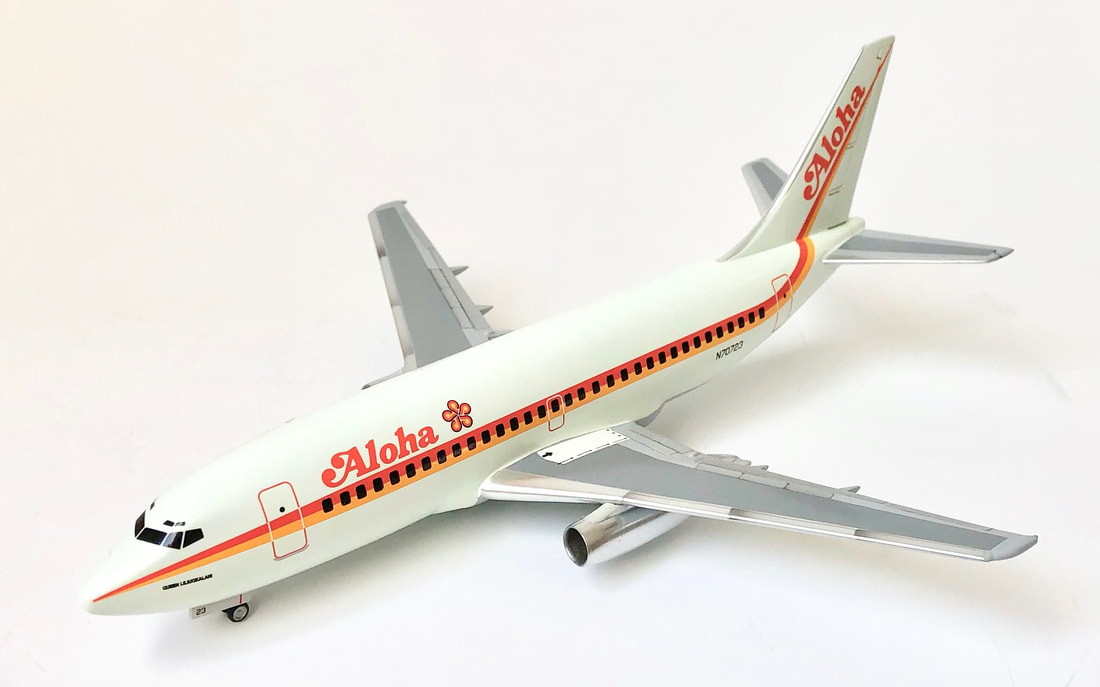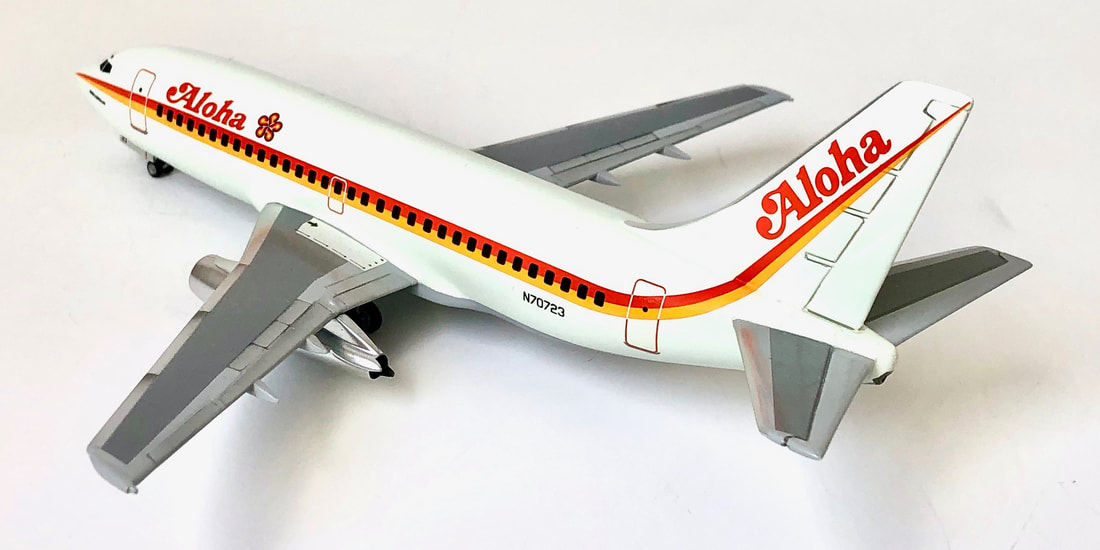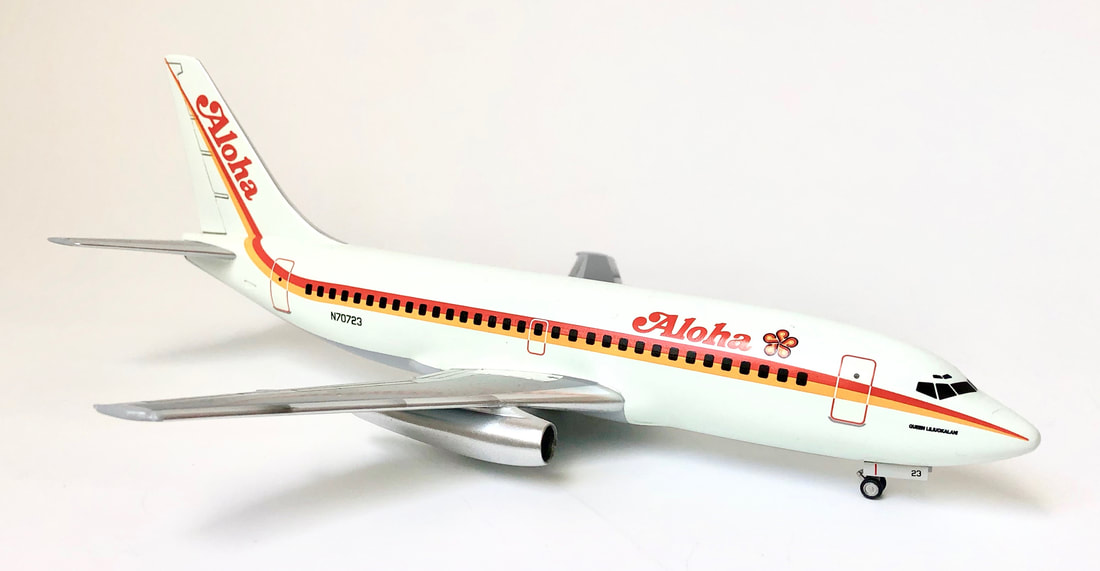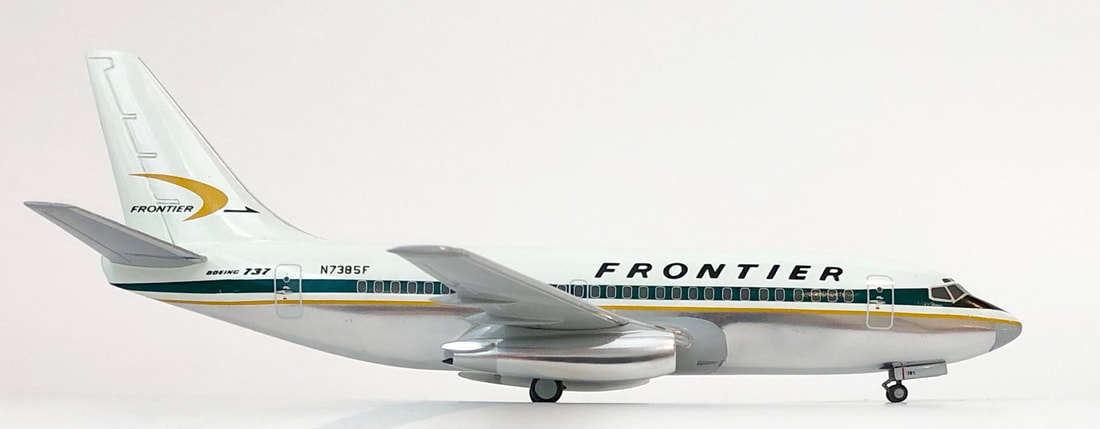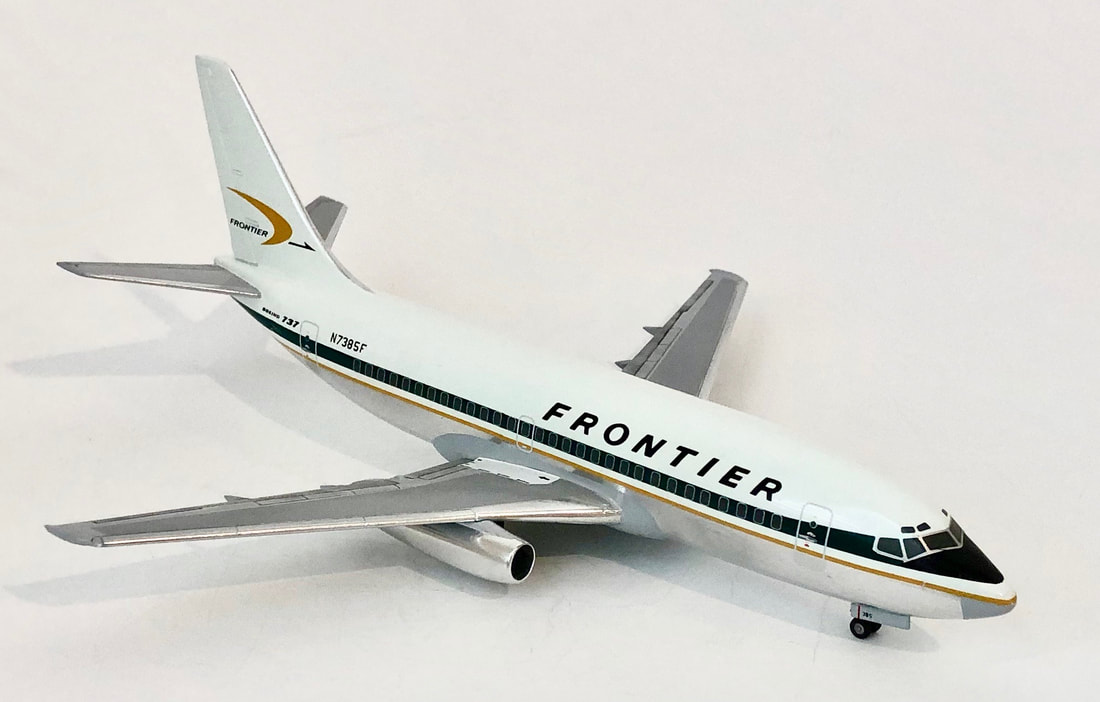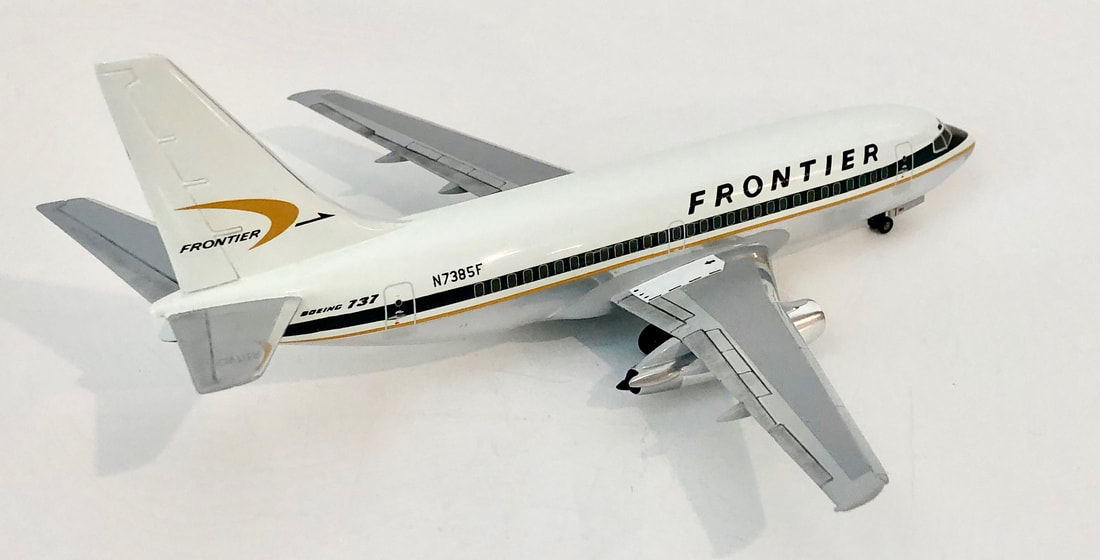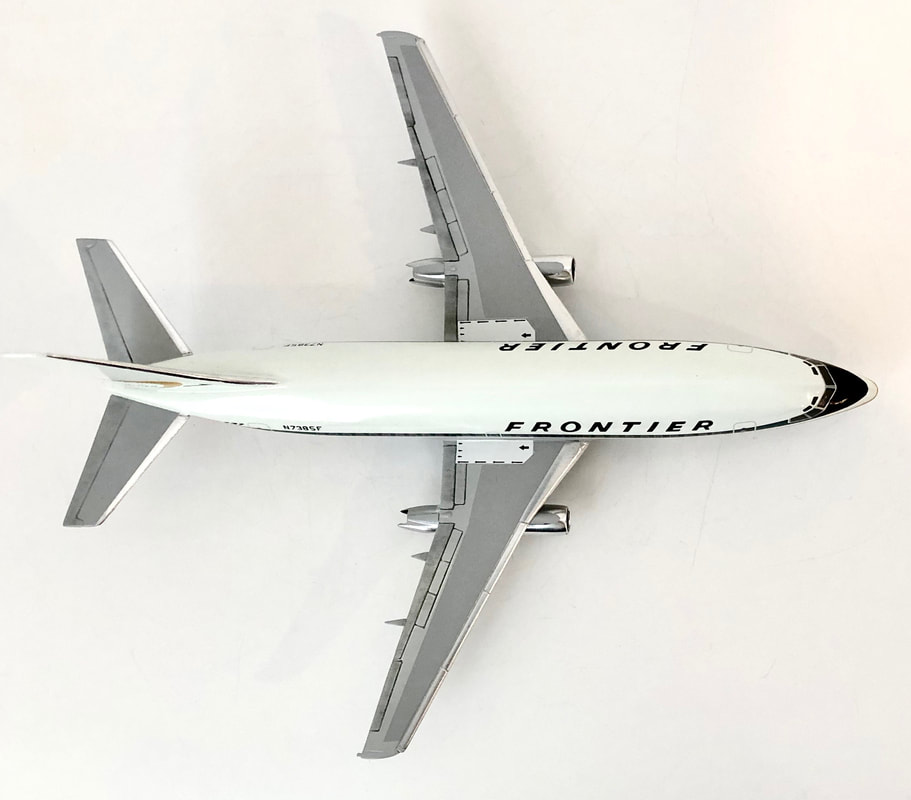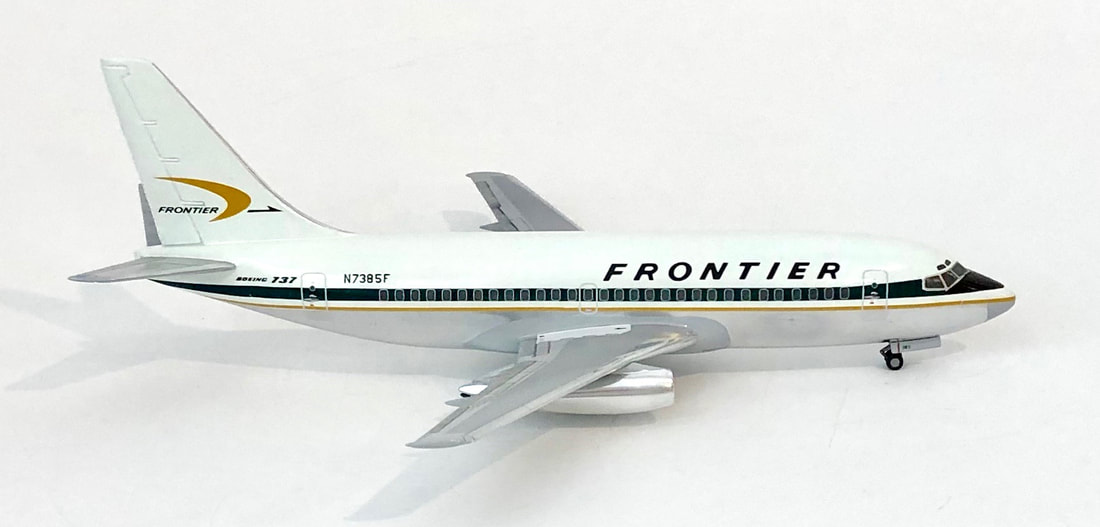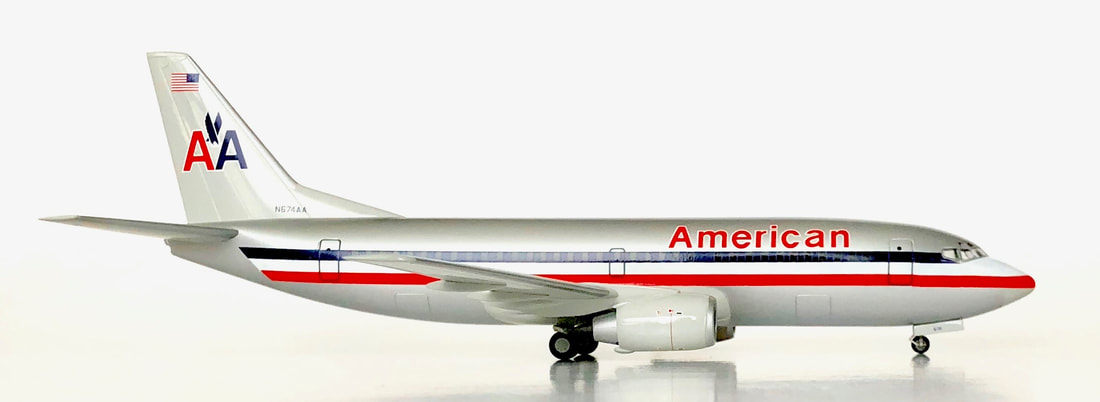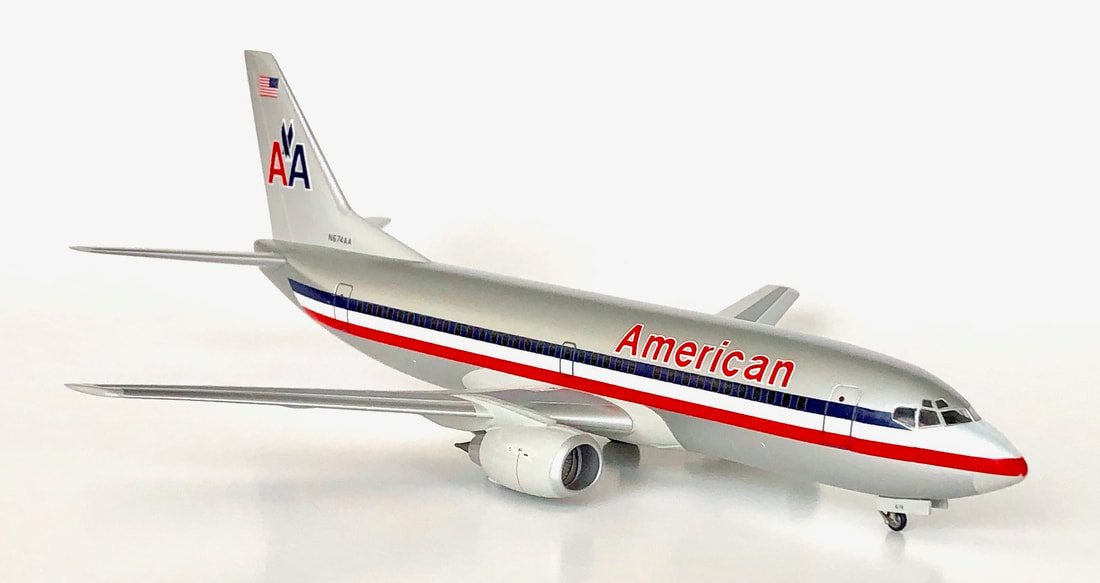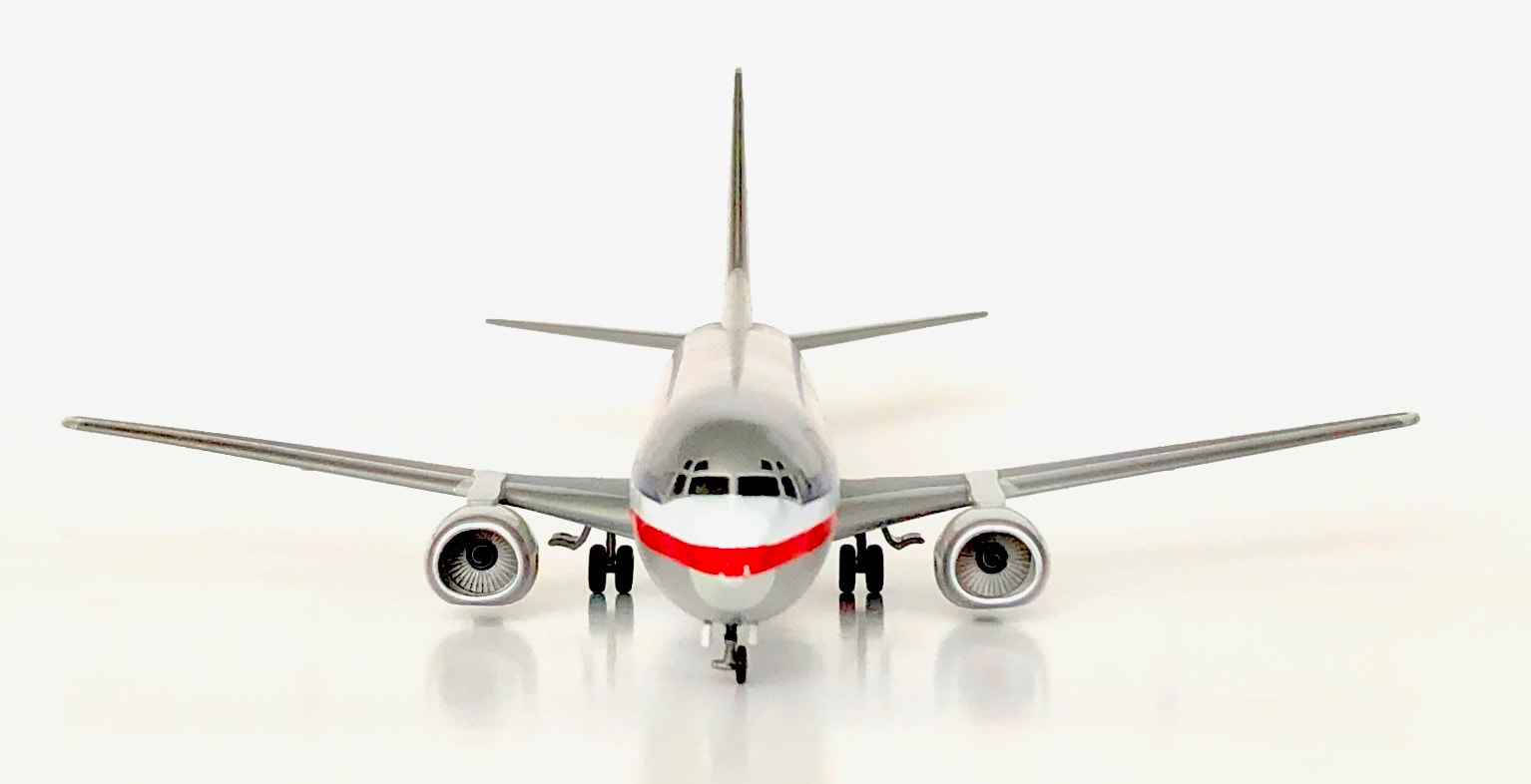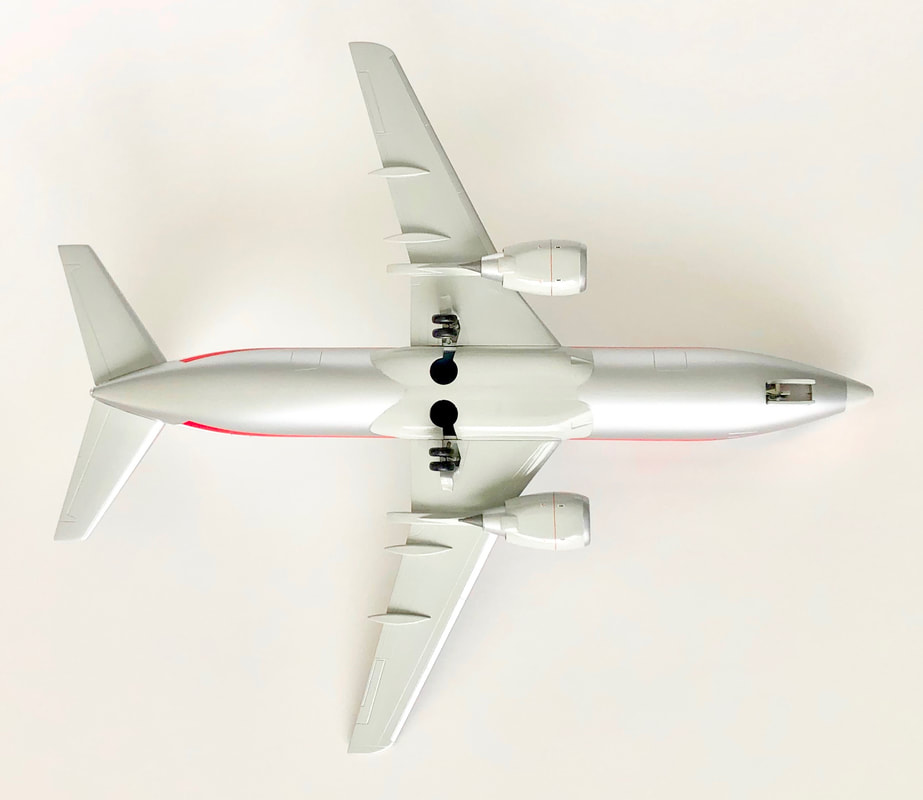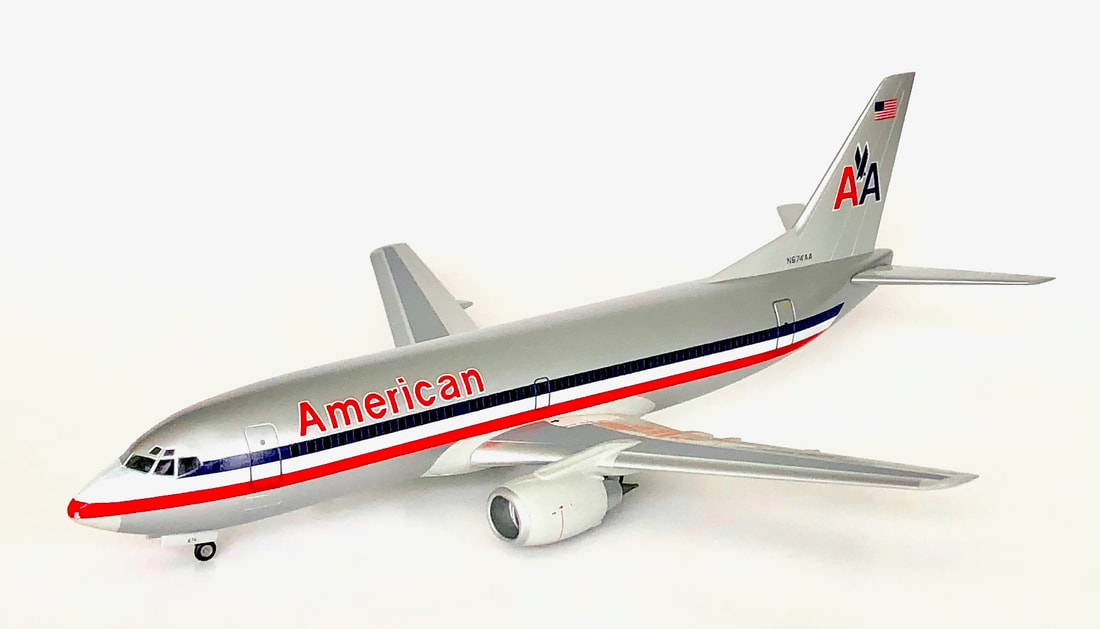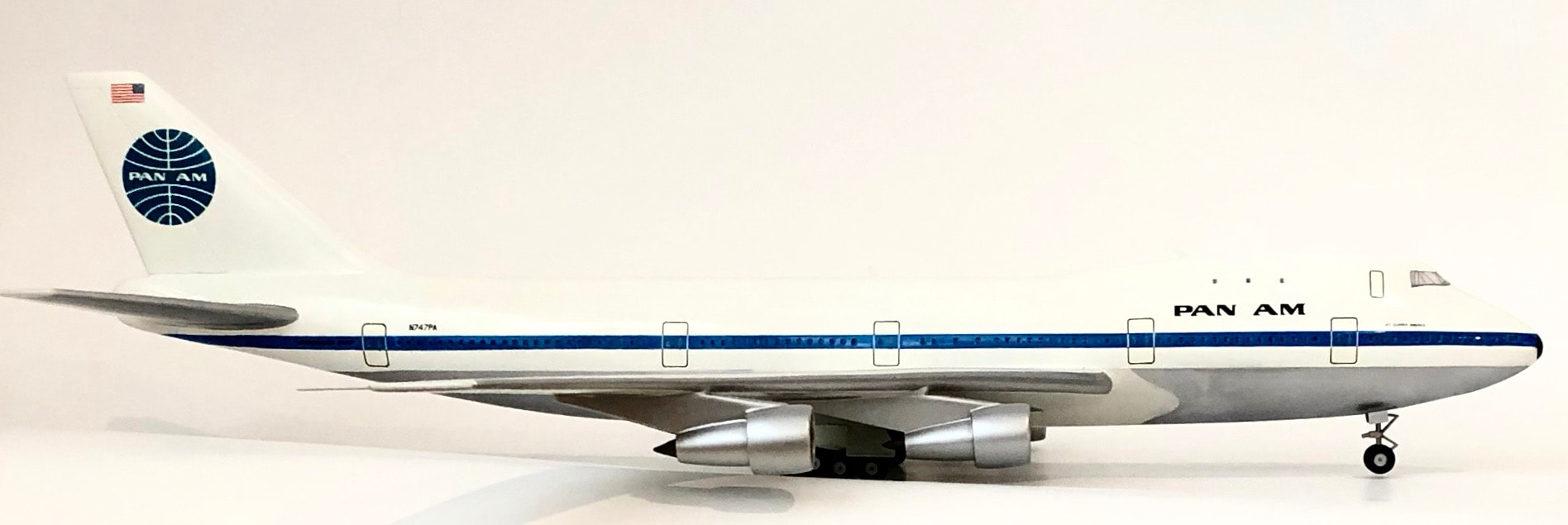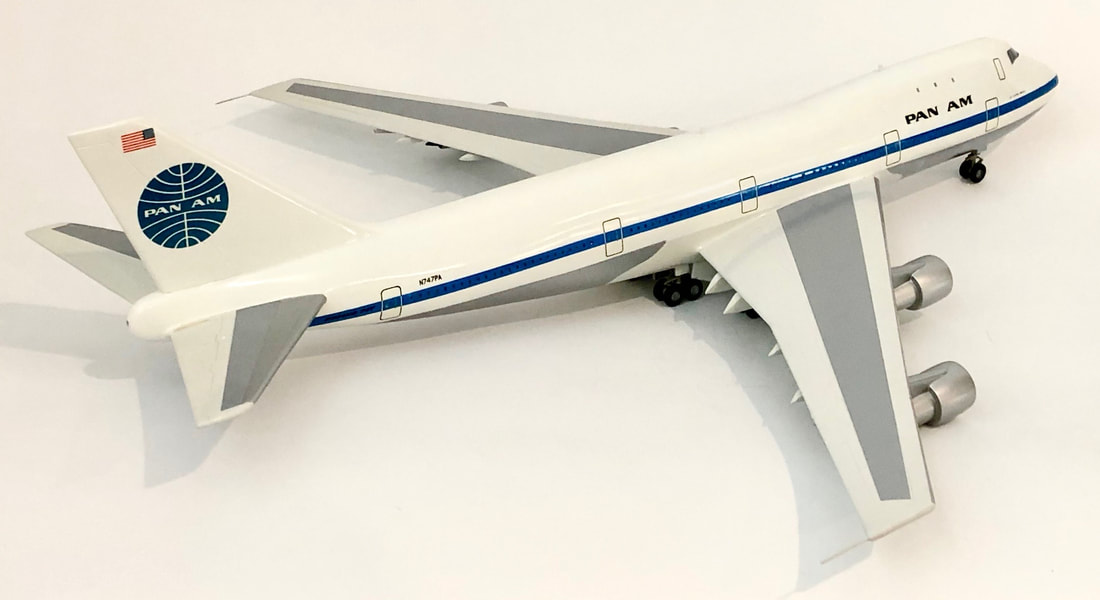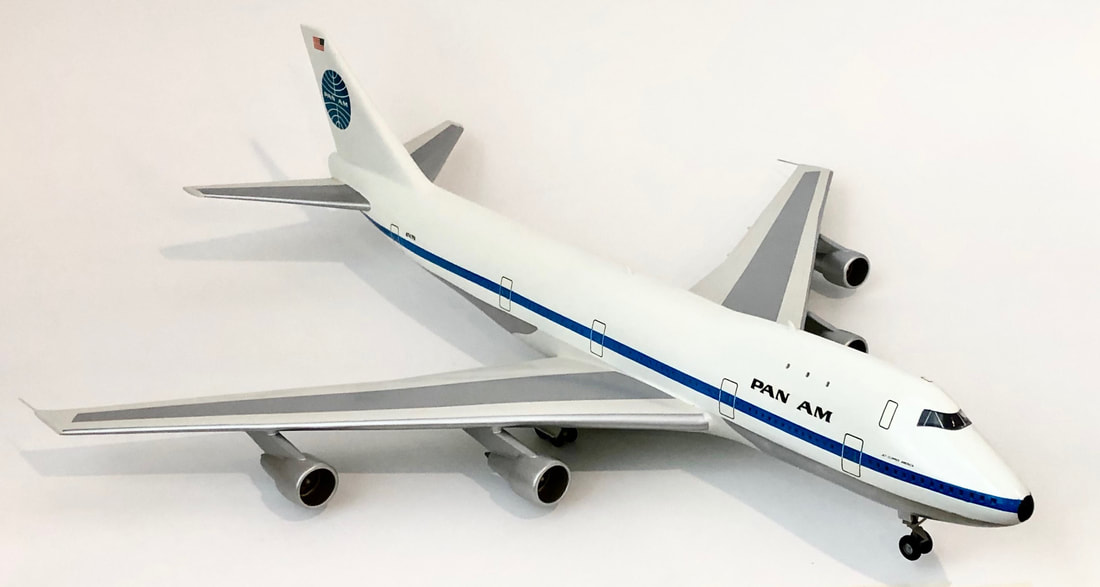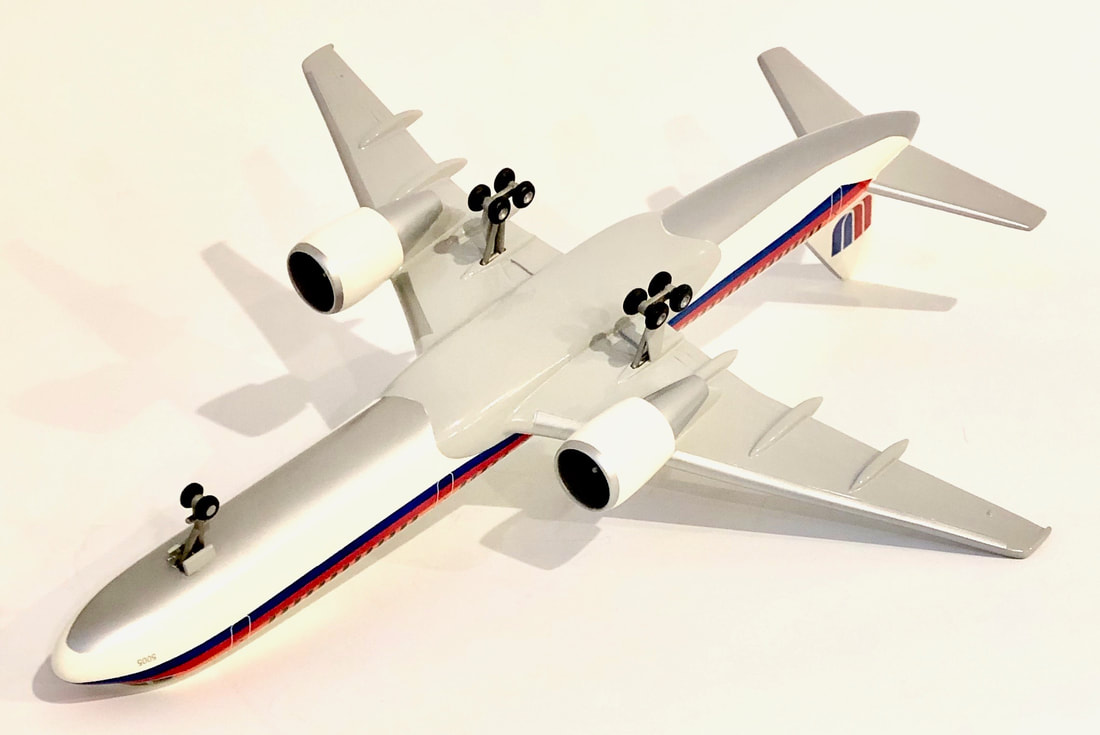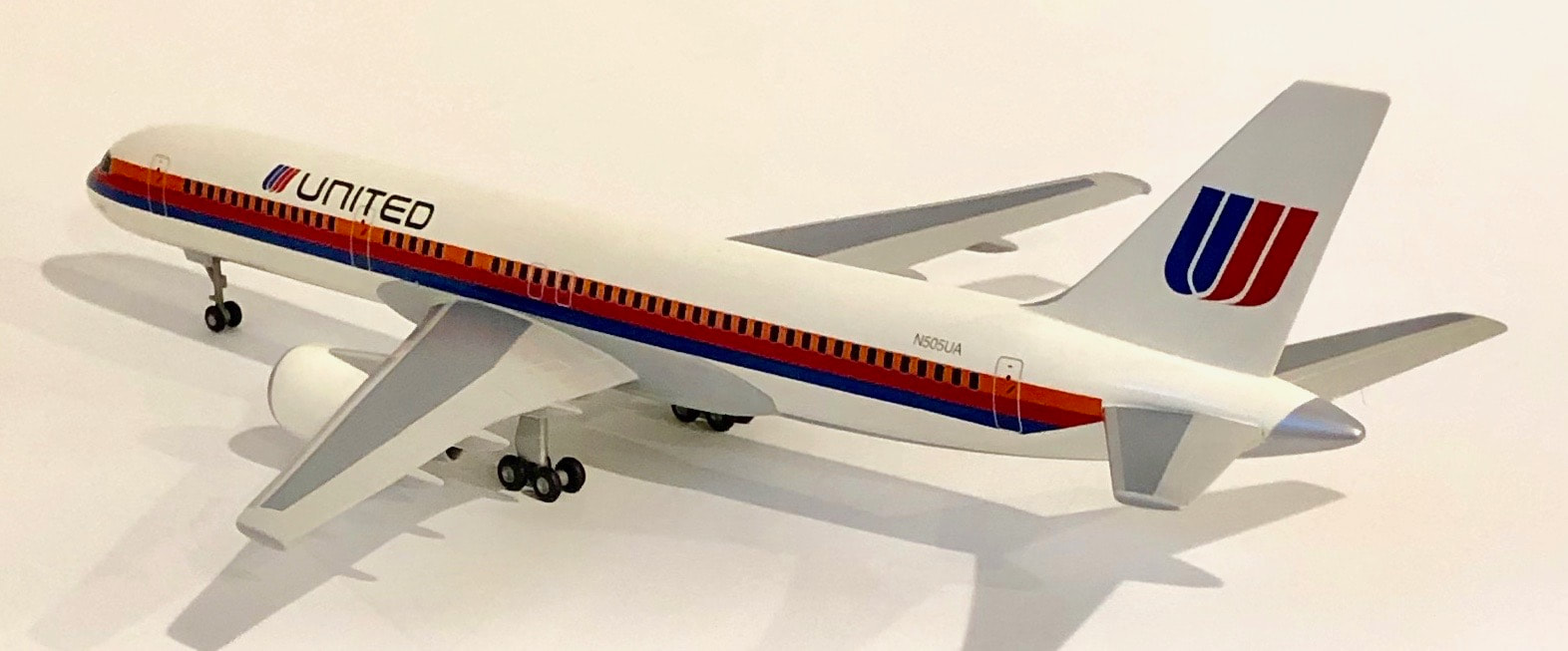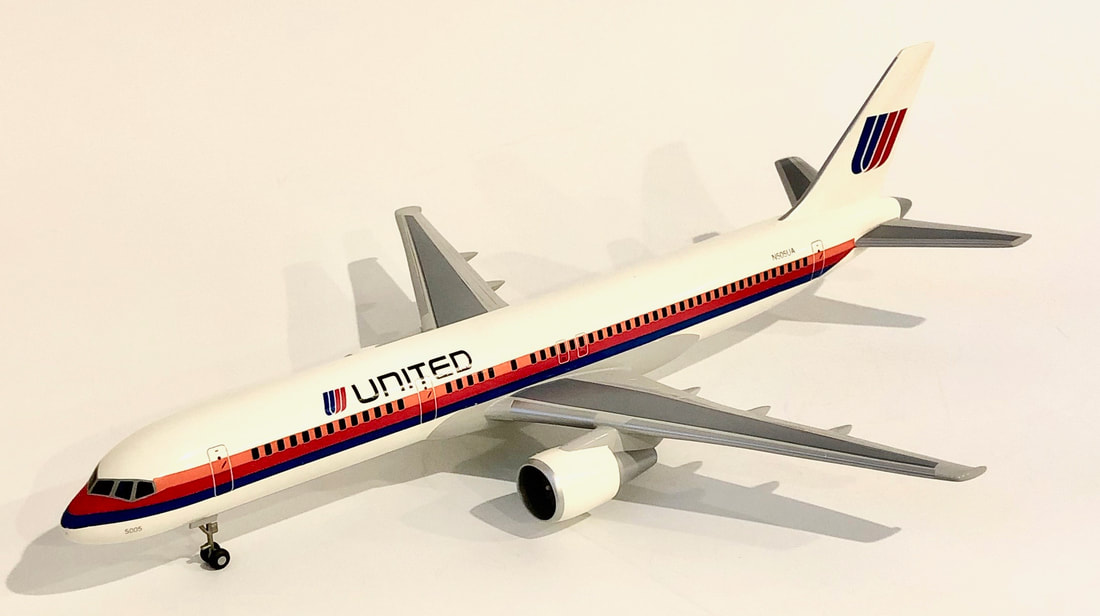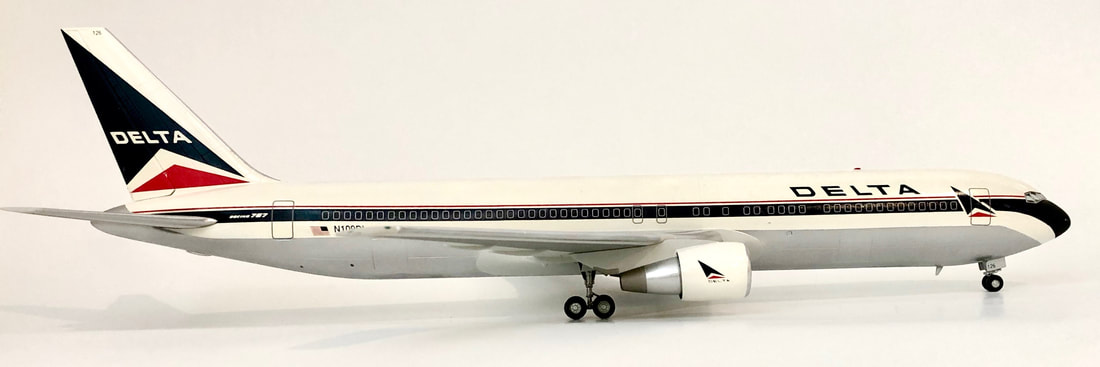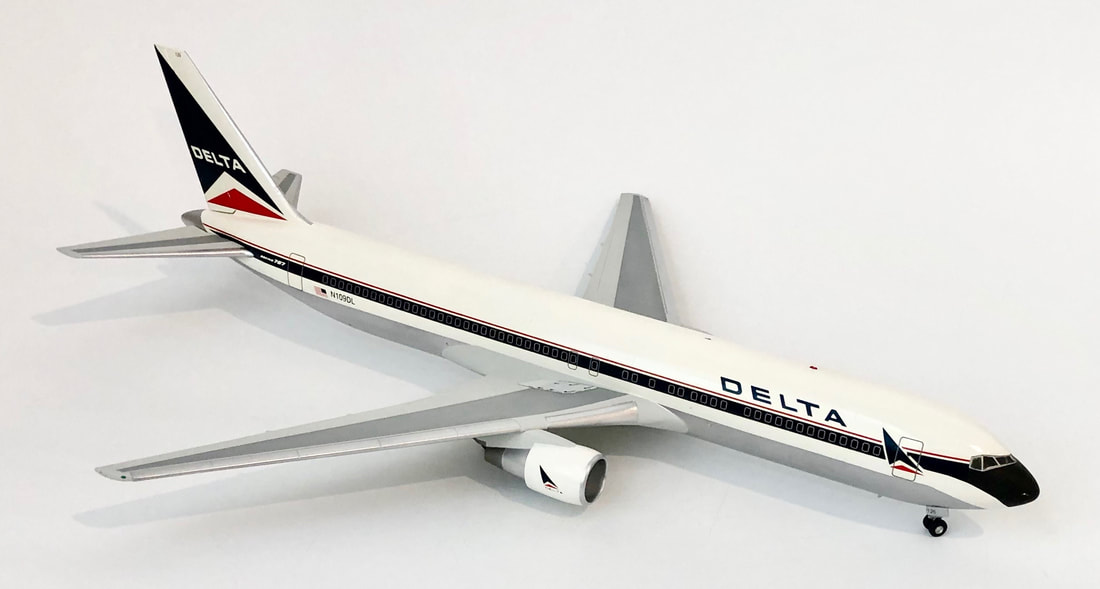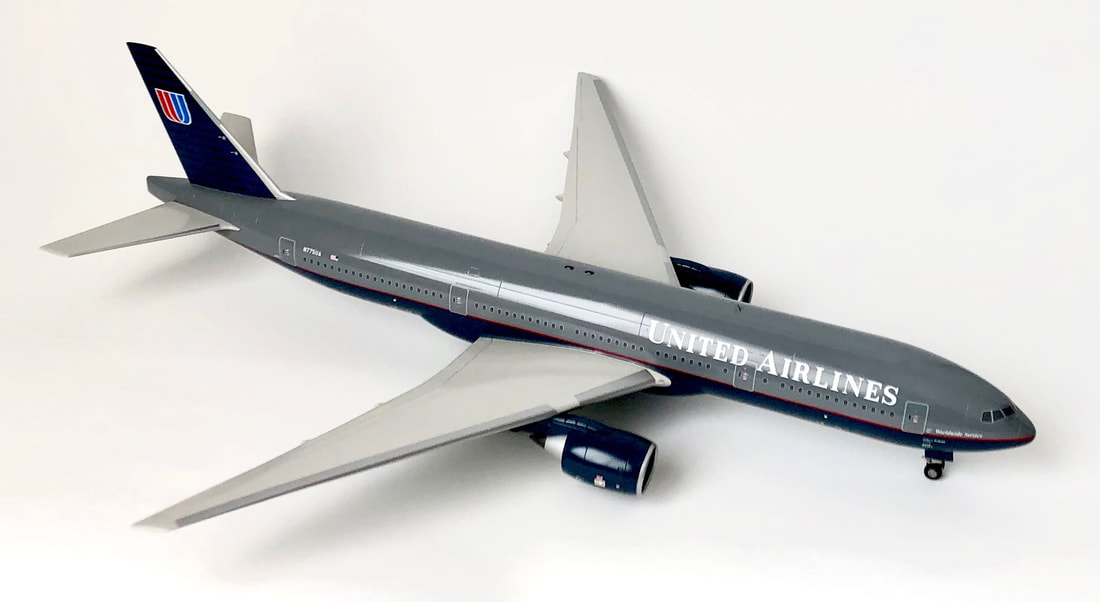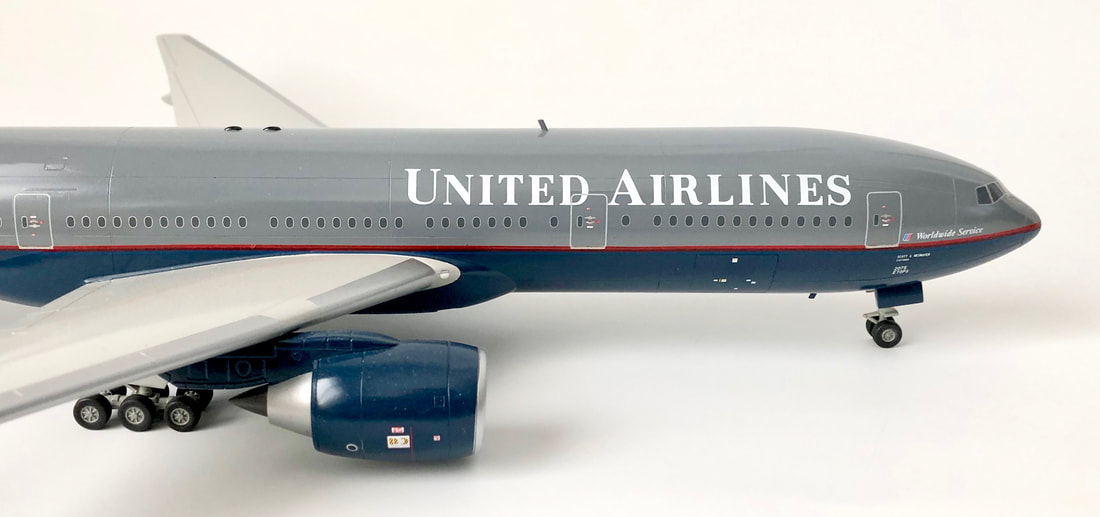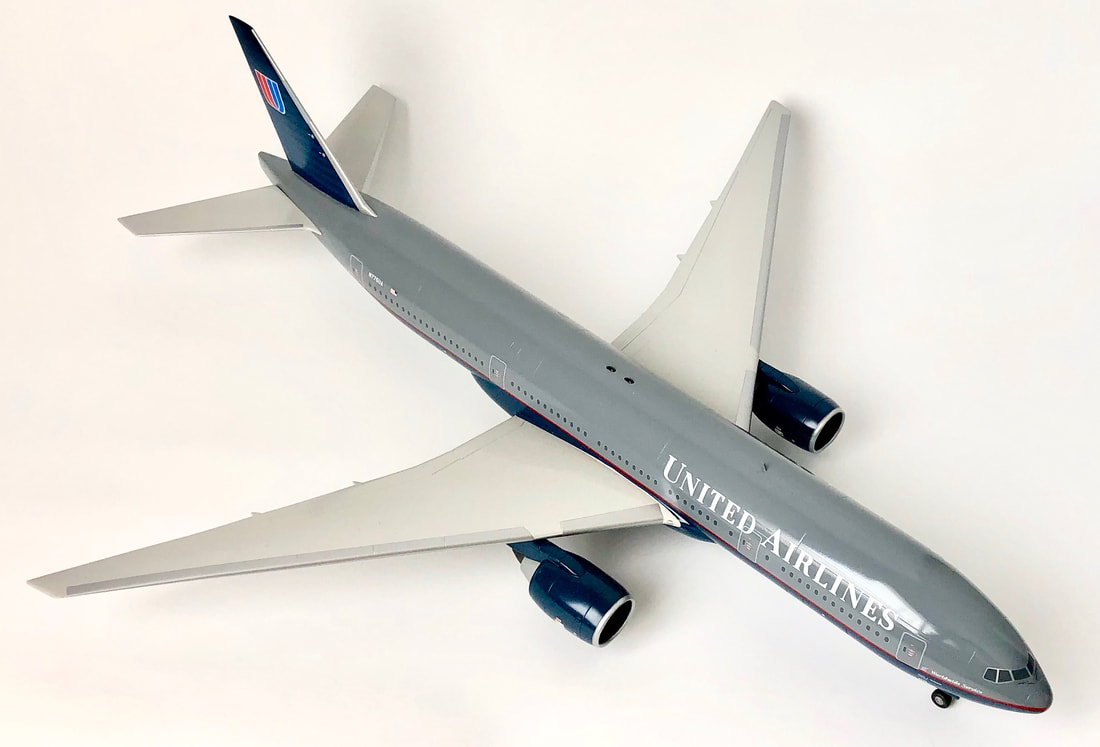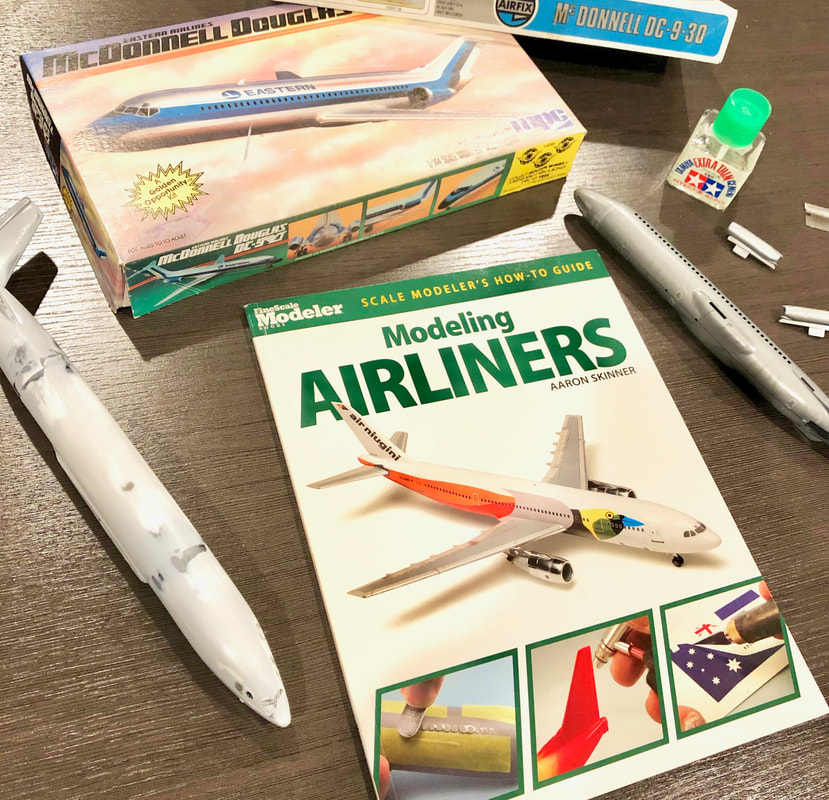WELCOME TO BRUDDER BILL'S AIRLINER GALLERY PAGE. IN ADDITION TO THE PHOTOS OF AIRLINER MODELS THAT YOU CAME TO SEE, WE'LL THROW IN SOME HISTORY OF THE KITS, AIRCRAFT, AND AIRLINES DEPICTED. WE DISH ON THE AIRLINE INDUSTRY A LITTLE, AND YOU'LL ALSO LEARN A FEW TRICKS TO MAKE YOUR AIRLINER MODELING EVEN MORE FUN!
By Bill Engar
Like many of you, my love for civil aviation started with trips to the airport at a very young age. Our dad travelled a fair bit and I remember tagging along for trips to the airport to drop him off and pick him up. Much has changed in the decades since my first memories of doing this. I still recall seeing a mix of piston and jet airliners. Often, we would walk right to the gate and would sometimes stay until we saw the plane our dad was on take off. It was more fun watching the noisy, smoky jet departures, and I always hoped I'd get to watch my dad get on a 707 or DC-8 instead of a DC-6B.
There was no security checkpoint in those days and with traffic levels at a mere fraction of today's, it was easy to get up close to experience the early Jet Age. I remember when the center seat was there for decoration only and it was generally easy to get a nice seat for a flight unlike today with the airline experience having devolved into an unpleasant mix of petri dish and cattle-car. After flying two million miles or so, about the only thing that would tempt me to get on a commercial plane nowadays would be a general anesthesia, similar to what one gets during a colonoscopy. You may see me at your local airport once that's an option. I wouldn't even care if the airlines made you pay extra for it as they do for things that used to be free like food, checked baggage, bin space, and dignity.
Some of the models were built in the early days before I tried to finish models to contest-standards, so I'll apologize now for the flaws and imperfections that you'll see. Most models here are 1/144 scale; we'll note the exceptions in their titles.
AMT HINDENBURG D-LZ129 (1/520)
By Bill Engar
Like many of you, my love for civil aviation started with trips to the airport at a very young age. Our dad travelled a fair bit and I remember tagging along for trips to the airport to drop him off and pick him up. Much has changed in the decades since my first memories of doing this. I still recall seeing a mix of piston and jet airliners. Often, we would walk right to the gate and would sometimes stay until we saw the plane our dad was on take off. It was more fun watching the noisy, smoky jet departures, and I always hoped I'd get to watch my dad get on a 707 or DC-8 instead of a DC-6B.
There was no security checkpoint in those days and with traffic levels at a mere fraction of today's, it was easy to get up close to experience the early Jet Age. I remember when the center seat was there for decoration only and it was generally easy to get a nice seat for a flight unlike today with the airline experience having devolved into an unpleasant mix of petri dish and cattle-car. After flying two million miles or so, about the only thing that would tempt me to get on a commercial plane nowadays would be a general anesthesia, similar to what one gets during a colonoscopy. You may see me at your local airport once that's an option. I wouldn't even care if the airlines made you pay extra for it as they do for things that used to be free like food, checked baggage, bin space, and dignity.
Some of the models were built in the early days before I tried to finish models to contest-standards, so I'll apologize now for the flaws and imperfections that you'll see. Most models here are 1/144 scale; we'll note the exceptions in their titles.
AMT HINDENBURG D-LZ129 (1/520)
First up is AMT's Hindenburg! It's an airliner--a very large one! Released initially circa 1975, this is a 1/520-scale model measuring in at over 18"! Pictured here is the Round2 re-release from 2014. This version includes much-improved decals (yes, I also built the 1975 version--keep scrolling!). Wingspan on the little DC-3 (included on the base for a size comparison) was cut down just a tad since it looked wonky otherwise. I drilled holes in the "zep's" engine cars where appropriate and prop blades were thinned as well.
|
Alclad II aluminum was used for the finish, over-coated with Testors flat lacquer. Testors enamel provides a great base-coat underneath the Alclad II silver finish.
|
The Hindenburg's creator, Hugo Eckener, objected strongly to inclusion of the Nazi swastika on his airship, but he was overruled. Instead of a symbol of connecting the world as Eckener envisioned, the Hindenburg became a symbol of the Nazi Party.
|
The model was rotated just a bit on the stand so that the underside details are more visible. Round2's new decal sheet included a very nice set of window markings.
Here's a similar view of my first AMT Hindenburg, built in 1975. I didn't paint it or anything. The photo is a double-exposure I created in my own darkroom at the time. The perspective's a little off, and prop alignment on the model is wanting. Give me a break; I was 14 years old!
REVELL (OTAKI) "SUPER GUPPY" BOEING 377-PG
REVELL (OTAKI) "SUPER GUPPY" BOEING 377-PG
Somewhat continuing our zeppelin/blimp theme with a transition to conventional aircraft, this Boeing 377-PG is an early effort of mine from the mid-1980's Revell kit. It was a pretty enjoyable build with recessed panel lines originally released by Otaki Models in 1974. As I recall, it was pricey in its imported Otaki iteration. I wanted one when it first came out, but it was out of my paperboy budget at the time. A dozen years later, Revell priced it reasonably. The finish is airbrushed Testors silver enamel.
The "Guppy" was a substantially modified Boeing 377 Stratocruiser. The Strat was actually based on the B-29. An earlier version of the Guppy transported Saturn V stages and spacecraft for NASA. Creating the outsized cargo transport was an engineering feat and the original Guppy was the most voluminous transport of its day. The pace of the Space Race required the speed of air transport as opposed to more conventional routes such as barge and road.
MINICRAFT LOCKHEED L-188 ELECTRA / AMERICAN
Here's our first Orange Alert. Minicraft's Lockheed Electra showing off American Airlines' spectacular Lightning Bolt livery. Check out our Atlantis P-3 review page where we provide many pictures of the super-rare 1/115 Revell L-188 Electra in this same "Electrafying" (sorry!) scheme.
Lockheed's second Electra wasn't quite as graceful as its iconic Connie forbearer, and the type had two unfortunate accidents which tarnished its image with the traveling public. It found a second life with the U.S. Navy as an anti-sub/maritime patrol aircraft and filled the role very well.
AIRFIX SUD CARAVELLE (6R CONVERSION) / UNITED
AIRFIX SUD CARAVELLE (6R CONVERSION) / UNITED
I was tickled pink when I found ATP's United Airlines "Spear" livery sheet for 737's and Caravelles. This model is a mild conversion finished in 2003. The electronics hump, which extended from the front of the vertical tail about halfway forward on the fuselage was cut off. The 6R also had a larger forward windscreen, which was taken care of by the decal.
The Caravelle's twin, tail-mounted engine configuration was revolutionary for the mid 1950's but it is commonplace today for the regional airliner. I wonder if a more graceful twinjet has ever been made than the Caravelle. The white top is Testors enamel.
VEB PLASTICART TUPOLEV TU-134 (1/100) / AEROFLOT
VEB PLASTICART TUPOLEV TU-134 (1/100) / AEROFLOT
Here's another early effort built from the VEB Plasticart Tu-134 kit. Plasticart was an East-German company making somewhat clunky model kits from a plastic that was almost as brittle as glass. However, they had a few interesting subjects and at the time, I couldn't pass up an airliner that had a glass nose! This one was bought and built circa 1986-7 using 100% Testors enamel for the finish. I remember seeing their DC-8 at my local hobby shop, and I wish I'd have bought it then because it's a collector's item now. The DC-8 would be a substantial model in 1/100 scale.
SASQUATCH MODELS DE HAVILLAND CANADA DHC-6 TWIN OTTER / NORONTAIR
SASQUATCH MODELS DE HAVILLAND CANADA DHC-6 TWIN OTTER / NORONTAIR
Sasquatch Models offered this Twin Otter kit circa 1987. You could find them at Colpar Hobbies in Aurora, CO, or through mail order via ATP for $8. It was a limited-run injection molded kit and perhaps a little unrefined. I started it immediately after purchasing and grew frustrated with it, setting it aside for approximately 25 years. Once my skills caught up to the work demanded by this model, I finished it in time to take it back to CO for the 2013 IPMS Nationals in Loveland.
I don't recall who made the decals, and norOntair isn't exactly a household name where I'm at, but that purple Canada goose on orange is a spectacular scheme! I can easily overlook the lack of a cheatline on an airplane dressed like this. The orange paint is Testors #1127 glossy-orange enamel. I like Testors enamels for their tough finish that is easy to apply to a glassy-sheen using my "secret formula" thinner through my simple Paasche-H single-action airbrush. These paints are readily available and reasonably-priced compared to other brands. I've been using them forever!
Another part of this model that gave me fits was the nose weight. When I began the kit, I didn't pack enough in. Piling on many primer coats biased the weight too far back for the model to sit on its nose. Finally, I had to use some industrial gold leftover from let's call it a crazy science project. Gold is heavier than lead and I had very limited space in which to work. About a half-gram of gold wire did the trick. I miss Sasquatch Models; they had some really cool stuff!
DOYUSHA FOKKER F27 / ALLEGHENY AIRLINES
Allegheny was the airline of choice if you lived in Pittsburg, PA when they first flew Fokker F27's in the early 1960's. While many airlines foundered when the industry was deregulated in 1978, Allegheny took advantage of the situation, changing its name to USAir in late 1979 to lose its reputation as a regional airline.
This was a very nice little kit made by Doyusha. The price was right even as an imported kit but it was tricky to find in the USA. 100% Testors glossy enamel finish--including undercoats and primer!
Ariel Williams was a longtime member of NUPMA (Northern Utah Plastic Modeler's Association), our local club, which later became NUSMA (the word "Scale" was substituted for Plastic some time in the 1990's). Ariel was a proud Dutchman, and as you might expect, he built many Fokker aircraft representing all of that Dutch manufacturer's history. At our contest, "The Gathering," Ariel sponsored a highly coveted Best Fokker "Flying Dutchman" award for many years, and I was delighted that my F-27 won it circa 1999 or 2000. Ariel's custom-award, which accompanied the standard award plaque, it shown here.
|
Duane Kaiser, Ariel Williams (center) and Chris Allred enjoy the banquet at the 2002 Gathering in Ogden, UT
|
Of course the wooden shoe is an off-the-shelf tourist-type souvenir, but Ariel fabricated the wings from resin that he cast himself. That's unpainted resin, which matches the natural wood of the mini-shoe quite well. The "wing joint" was ground out and actually fits the contour of the shoe perfectly. The work was typical of what Ariel put into each of his models.
|
Ariel's award in my display case. The award is a treasured memento. We lost Ariel in 2015; he was 86 years old when he passed away. He is greatly missed.
REVELL (OTAKI) AEROSPATIALE-BAC CONCORDE / BRITISH AIRWAYS
Was this the most beautiful airplane ever built? The Concorde looks great from any angle. This is another early build-effort dating back to the mid-to-late 1980's when Revell first released the Otaki Concorde kit.
Testors paint was used for this model. Since the 1980's, Revell USA and Revell Germany have re-released this fine kit and it's easy to find nowadays.
MICROSCALE (TOPPING) CONVAIR 990 / AMERICAN
MICROSCALE (TOPPING) CONVAIR 990 / AMERICAN
Microscale was by far the most well-known aftermarket decal company in the 1970's. In the mid-1970's, they dabbled with some kit releases, and came out with a Convair 880 and 990. The Convair 990 is known for its larger engine nacelles and wing shock-fairings as seen here. I think the decals were adapted from a Liveries Unlimited "Astrojet" sheet intended for the 707. Alclad II polished aluminum finish over Testors enamel. This model was completed circa 2015.
The Convair 990 was known as a hotrod in the airline industry. Designed with speed in mind, it also had high fuel consumption, which did not sit well with the airlines ultimately. This doomed Convair's aspirations to sell commercial airliners. Before it was a Microscale kit, a company called Topping marketed it as a desk model. Including the stand, it has a breathtaking total parts count of 5.
BONUS CONTENT: WHAT EVER HAPPENED TO TOPPING MODELS?
BONUS CONTENT: WHAT EVER HAPPENED TO TOPPING MODELS?
Friend and key consultant John B (think Monogram USAF Air Power set) let me know that at least some of the products from Topping Inc and Precise Models, former makers of fine desk models, have been revived in the form of Precise Models LLC. They have a cool website with a couple history pages that you'll enjoy. While this company sells a number of nice, finished desk models of the contractor promotional display type, they also have a supply of "blanks" in the form of simple model kits like the old Microscale/Convair 880 and 990. Unfortunately, they don't currently offer either of those models, but a 737 kit is available at a price reasonable for the fact that it scales in at around 1/100. They have quite a few other interesting kits that will be simple builds including a Westwind 1123, a handful of contemporary and classic military jets, and a 1/72 LTV Scout that has seriously piqued the interest of the rocketeer in me. Check out the models available in kit form here.
REVELL AIRBUS A310 / FEDEX
This Airbus A310 was an early airliner kit from Revell of Germany first released in 1984. Revell USA released it in 1985 with Pan Am billboard-livery decals. I like my airliners with cheatlines (a horizontal stripe that usually covers the windows common in the early Jet-Era), but FedEx's Purple-Tail livery is very attractive. I think I used Tamiya purple acrylic paint for the tail. As I recall, I had trouble getting the paint there just right. Everything else is Testors enamels. This model was built in 2002.
REVELL DC-8 / PAN AM
Pan Am is perhaps best known for its entry into the Jet Age with its 707's. However, the early DC-8 had a better range than the early 707 and Pan Am flew the type until the Intercontinental 707's were available. I couldn't resist building this Revell/Lodela DC-8 with Microscale's Pan Am decals. Microscale usually crammed two or three airlines on one sheet, and I had to custom-mix Pan Am blue from Testor's enamels and mask-and-paint the cheatline since Microscale didn't include it. I believe the windows were made from Microscale's Kristal Kleer window-maker product.
This is another earlier effort, built in about 1995. Believe it or not, all the silver finish you see is Testors enamel. I threw a small amount of gloss black in my airbrush along with that silver paint to do the various panels, using more black for the engines. Prior to the 1990's, I used a Badger 350 single-action airbrush for all paint work. It's a perfect beginner airbrush. Circa 1990, I upgraded to a Paasche H-Series, also a single-action. It's not fancy, but is very easy to use, easy to clean, and does all sorts of amazing things on my models. Alclad II metal finish endures handling pretty well and tolerates masking and that's what I use nowadays, particularly to get a brilliant natural metal-look. It works really well over a glossy dark-gray or black Testors under-coat.
REVELL SUPER DC-8 / UNITED
REVELL SUPER DC-8 / UNITED
For some reason, the blue paint in these photos looks a lot darker than it actually is. I couldn't resist building this Revell-Lodela kit that was released in about 1993. The spear and cheatline decals that came with the kit were wonky as I recall, so they are masked and painted here. I believe the metallic finish is SNJ spray-metal and everything else is Testors enamels. ATP made a DC-8 windows set, and that's what I used there. I think I finished this model in the year 2002 along with the A310.
I believe the 707 had shorter landing gear than the DC-8, which made a lengthy stretch a problematic engineering exercise. Pilots still had to be very careful to avoid tail-strikes on takeoff and landing in the Super-DC-8's thanks to that super-long fuselage. Instead of modifying the 707 to compete with the Super DC-8, Boeing decided to build the 747.
REVELL (ATLANTIS) BOEING 720 / UNITED
REVELL (ATLANTIS) BOEING 720 / UNITED
This is Revell's Boeing 720, released in the year 2000. The 707 and 720 had differing fuselage lengths and wings and Revell's kit was just a standard, early 707. In our Revell KC-135/707 History Page, I've detailed what went into building this model and you'll also learn more about the Revell 707 than you may want to know. After Atlantis Models acquired much of Revell's legacy kit tooling, they announced the return of the 707-120, which is this same kit (see our kit review here). Atlantis consulted us regarding airline options. Getting licensing by a model kit company for just about any airline is practically impossible these days and I suggested that they go with a Boeing demonstrator scheme since they were already paying for the Boeing trademark usage license!
This kit was not in the Revell catalog the year it came out and I recall no advance notice of its release. I was surprised and thrilled to find it, and bought it on first sight from a small hobby shop in Cheyenne, WY and started building immediately. Shortening the fuselage and modifying the wing was a bit of work and the model wasn't finished until 2004. The decals that came with this kit were just gorgeous and went on very well. The cheatlines and passenger windows came right off the kit sheet. The front windscreen came off an ATP sheet. We worked with Atlantis on the decal sheet for their new (2022) version of the classic 707-120 Revell kit. While I thought the 720 decal sheet that Revell did in 2000 was about the best airliner kit decal sheet ever, I believe Atlantis went one better by including separate, accurate doors and windows!
When United negotiated their 707 purchase, they wanted a bigger-sounding number for their new, hotrod variant and the planned 707-020 designation didn't cut it. So Boeing varied from their 7X7 numbering this one time to satisfy United Airlines. Quite a few other airlines bought the 720 as well. Testors enamels over-coated with metallic Alclad II for flight surfaces and lower fuselage.
Hasegawa Boeing 727 (1/200) / ANSETT
Hasegawa Boeing 727 (1/200) / ANSETT
We get quite a bit of website traffic from Australia, and I had to throw in this Aussie subject even though it's an early effort that hasn't aged particularly well. The kit decals discolored badly after going on the model. Everybody used to tell me to throw away kit decals and this is probably what they were talking about. At some point, I gave it a thick overcoat of Future floor wax over the Testors enamel finish. The model was built in about 1987 right out of the box.
I never flew Ansett, but did fly on TAA, and one of these days, I'll finish up a TAA 727. Airfix released its 737-200 in Ansett Southern Cross livery in 2011 and that's another one on my build-list. Those kit decals appear to be extremely well-done!
AIRFIX BOEING 737-200 (-100 CONVERSION) / LUFTHANSA
AIRFIX BOEING 737-200 (-100 CONVERSION) / LUFTHANSA
What follows, for a while at least, is a whole bunch of mostly Airfix 737's (hang in there; they just keep going!). This is an awesome kit that just goes together easily and it makes a great canvas for any number of striking airline schemes. Here's a -100 conversion. As I recall, I had to remove about 1/4" from the fuselage fore and aft of the wing. The engines had to be shortened as well. Not many short-body -100's were made; just a few early examples with Lufthansa being one user.
This model, finished in 2001, made it into Aaron Skinner's Modeling Airliners book (more about the book later). Decals were adapted from the Airfix 727 kit. I modified the famous Lufthansa crane logo a little. Fortunately, rearranging the registration letters yielded a correct combination for the 737 that has a catchy ring to it, especially for the skateboarders out there who may also happen to be airliner geeks like me. This was an early Alclad II effort; I believe that their aluminum shade was used. Everything else is Testors enamel, including the logo background, which had to be masked and painted as the logo on the Airfix 727 decal was the newer circle-type.
MPC (AIRFIX) 737-200 / UNITED
MPC (AIRFIX) 737-200 / UNITED
This is my oldest surviving airliner model; a true early effort from 1986. It predates my first attendance at a model club, in this case, NUPMA. It's the MPC kit (Airfix plastic) which was released in the early 1980's. Note that I preserved all the raised details. Some years after the original build, I coated it with Future floor wax to improve the shine (years before I developed my secret thinner cocktail which gives Testors enamels a very shiny gloss finish). Those are original kit decals (yikes!). While I liked the then-contemporary United Airlines scheme, the decals weren't of the best quality. They were thick, dicey to apply and have not aged well at all thanks to the low-grade adhesive. The little tool that comes with the kit, intended to punch out the decal film over the window openings was very cheesy. There, I said it. Following kit instructions with this thing never worked out well for me.
The Testor white enamel has also yellowed pretty badly over time. Possible use of gum turpentine as thinner is probably the cause. Attempts at color correction in the digital photo probably pushed the blue stripe to be a darker shade than is in-person.
AIRFIX 737-200 / AMERICA WEST
AIRFIX 737-200 / AMERICA WEST
When I first attended NUPMA, I met some amazing modelers, including Gary Pollard, who recommended sanding off the raised rivet details on airliner models such as the Airfix 737. He told me that if I ever competed in an "airliners only" model contest, that's what they all did. They also like an impossibly shiny finish. For my second airliner effort in 1/144 scale, I took his advice--and never went back! This model was built around 1987-88.
Another innovation for me during the period was discovering ATP (Air Transport Photography), a mail order business out of San Jose, CA run by Clint Groves. It was great to receive a catalog full of airliner decals that allowed me to pick the scheme I wanted for my model, and not be stuck with the decals that came with the kit. Clint had an ad in Finescale Modeler advertising his catalog, and I sent him a buck for the first time in 1987. The catalog showed up the same week, and I was hooked.
Another innovation for me during the period was discovering ATP (Air Transport Photography), a mail order business out of San Jose, CA run by Clint Groves. It was great to receive a catalog full of airliner decals that allowed me to pick the scheme I wanted for my model, and not be stuck with the decals that came with the kit. Clint had an ad in Finescale Modeler advertising his catalog, and I sent him a buck for the first time in 1987. The catalog showed up the same week, and I was hooked.
My first business trip was on an America West 737 like this. Thanks to ATP, I was able to build one! Here's another example where the Testors white has yellowed badly probably due to my use of gum-turpentine which I've since discontinued. Window openings were filled with putty and a separate ATP decal sheet with Boeing narrowbody windows was utilized.
HASEGAWA 737-200 (1/200) / UNITED
HASEGAWA 737-200 (1/200) / UNITED
The 1/200 Hasegawa kit was available at the same time as the MPC kit with the same United markings and this is another early effort that coincides with my MPC United 737 build. I never figured out why designer Saul Bass and United Airlines decided to put orange on their planes, but this classic cheatline scheme is just awesome, isn't it!
Testor enamels were used 100%. Like the Airfix kit, the Hasegawa version had open windows. However, the decal had the openings as well (and not the ridiculous punch-tool like Airfix). Note that they don't line up perfectly. If I ever did another of these, I'd probably paint the red cheatline around the windows to prevent the wonky white outline showing through the clear window opening.
AIRFIX 727-200 / UNITED
AIRFIX 727-200 / UNITED
Here's a late effort, circa 2013. While I love a clean, from-the-factory look on my airliners, by this time, I was adding a little weathering as a nod to realism (and to pacify the contest judges). This Decales Global set has a later Saul Bass United Rainbow scheme. You can tell by the larger titles. Many airlines (Pan Am and Continental also come to mind) modified their liveries with larger titles in a nod to increasing brand awareness. Note that the windows moved from the center red stripe to the top orange stripe during this subtle livery update, or more correctly, the rainbow cheatline was moved lower on the fuselage.
Testors enamels and Alclad II polished aluminum cover this model. While I liked the Decales Global decals, it was tricky to get them to conform over the nose. Decal ink seemed waxy and didn't respond well to setting solution. Weathering was done with pastels and a fine brush, and it was preserved with Testors clear, flat lacquer. Don't use Testors lacquer over white. It will yellow like crazy. Don't ask me how I know this.
What I do nowadays for an awesome clear-gloss is to pour off some of the clear enamel carrier that settles to the top of many unopened, new Testors glossy white paint bottles. If you don't pour off too much, you can still use the rest of the bottle after stirring it up. If you skim enough off of about a half-dozen new bottles or so, you can fill up an empty, cleaned out 1/4-oz Testors paint bottle. This doesn't yellow like lacquer. Clear flat lacquer is fine to use over just about anything but white; I love it for armor subjects.
AIRFIX 727-200 / UNITED
What I do nowadays for an awesome clear-gloss is to pour off some of the clear enamel carrier that settles to the top of many unopened, new Testors glossy white paint bottles. If you don't pour off too much, you can still use the rest of the bottle after stirring it up. If you skim enough off of about a half-dozen new bottles or so, you can fill up an empty, cleaned out 1/4-oz Testors paint bottle. This doesn't yellow like lacquer. Clear flat lacquer is fine to use over just about anything but white; I love it for armor subjects.
AIRFIX 727-200 / UNITED
United's "Spear" scheme predates the Rainbow scheme, and it's one of my all-time favorites. To me, this is the definitive cheatline. This model was built in about the year 2000. Decals come from the same set as the ATP Caravelle, one of my most-beloved ATP decal sheets!
Lufthansa and Continental opted for the short-body 737-100, but United wanted a little more capacity and waited for the 737-200. United, the launch customer for the -200, kept their early 737's for decades and many other airlines followed suit. Only 30 737-100's were built, and nearly 1000 -200's (passenger configuration) were made by Boeing.
AIRFIX BOEING 707 / SOUTH AFRICAN
AIRFIX BOEING 707 / SOUTH AFRICAN
I had to build this scheme when I first saw it on a Liveries Unlimited decal sheet. The font is very cool and for whatever reason, you just can't go wrong putting orange on an airliner! That's a very attractive cheatline.
This one was built at the same time as the "Spear" United 737 before I decided to weather my airliners. I can't remember if I was using SNJ metal or Alclad II by this time, but it has Testors enamel underneath and everywhere else. In fact, I actually use Testors glossy enamels as my primer! It obscures details less than any flat primer and sticks to your model like a shadow!
Another little trick I learned in the late 1990's was adding just a tiny bit of blue to your white paint before you airbrush it. The concentration is on the order of one drop per 1/4-oz Testors bottle, so it's not very much!. This "cools down" the paint color a little. If it looks powder-blue, you've used too much. What this does is prevent yellowing of the white paint over time! If anything, the blue tint lessens over time, but it hasn't yellowed at all. Scroll up a bit and take another look at that Lufthansa 737; that one is "cool blue" using this technique as well. Between this and not using gum turpentine, you'll never have an airliner go yellow on you.
OK, my "secret" thinner to cut Testors enamel for airbrushing is a special cocktail of about 80% lacquer thinner with a much smaller quantity of standard Home Depot paint thinner, and a couple other ingredients that changes over time depending on how the manufacturers tweak formulas to conform to ever-changing environmental laws. Altitude and season are also factors that affect proportions of the mix! One of these days, I'll throw the whole thing up on the website in some form. It's called super-nerd-science-meets-modeling. Scary!
AIRFIX BOEING 707 / CALLSIGN "JANET"
OK, my "secret" thinner to cut Testors enamel for airbrushing is a special cocktail of about 80% lacquer thinner with a much smaller quantity of standard Home Depot paint thinner, and a couple other ingredients that changes over time depending on how the manufacturers tweak formulas to conform to ever-changing environmental laws. Altitude and season are also factors that affect proportions of the mix! One of these days, I'll throw the whole thing up on the website in some form. It's called super-nerd-science-meets-modeling. Scary!
AIRFIX BOEING 707 / CALLSIGN "JANET"
Tertiary career affiliations gave me an interest in this "Janet" scheme for the 737. It'll be best for you to read the Wikipedia article on Janet Airlines if you're not familiar with the reference. The article mentions Western Airlines, but doesn't elaborate that the contractor bought several retiring 737-200's from Western, and it was probably easier to modify that bright red cheatline than to scrape it off around all those windows. Two other considerations not mentioned is that it was a perfect way for this otherwise low-key operation to hide in plain sight (they certainly don't look like military T-43's) and the scheme would provide the same functions as Arctic high-vis markings if a search effort was ever required in the remote areas of their usual routes.
This was a fairly simple modification of a Western Airlines decal. I don't think I got the cheatline wide enough. I believe that they narrowed the Western version a little, but not nearly as much as I did on this model. When I built it circa 2004, references and memory were sketchy. Since then, a lot more information has emerged on the Internet. Long after I finished this airliner, a few decal makers offered the Janet scheme. Without a tail logo and airline name, it looks unfinished, doesn't it!
AIRFIX BOEING 737 / WESTERN
AIRFIX BOEING 737 / WESTERN
Here's what a set of Western Airlines decals looks like when installed according to instructions. Western's "Swizzle Stick" livery of 1970 kind of put the cheatline on its ear, at least at the front of the plane. I'll call it an early fusion between the cheatline and billboard liveries, which were still some years off when this bold scheme debuted. I remember that you could easily identify the airline from many miles away thanks to this scheme.
As the mid-2000's approached, I began to weather my airliners as this example from 2006 shows. I dabbled with the decals intended for the corogard sections of the wing (corogard was a silvery-gray preservative paint commonly used on aircraft wings), but I found that it was less hassle just to mask and paint them from a custom-mix of Testors glossy white, black, and some silver. It seemed the corogard decals never fit or adhered right for me. But Western Airlines was the o-o-o-only way to fly.
AIRFIX BOEING 737 / DELTA
AIRFIX BOEING 737 / DELTA
In late March of 1987, I booked a single ticket with a departure on Western, and the return flight was on Delta since the official merger concluded on April Fool's Day during my trip. As you can imagine, baggage handlers couldn't decide where to send the luggage and they haven't figured out where it should go to this day.
The Widget scheme was a class-act, and with EIGHT widgets and Delta titles on the airplane (each engine has a pair), there was no doubt which airline you were flying. I still have faith that my long-missing luggage pieces will show up some day--undamaged! This model was built in 2013.
AIRFIX BOEING 737 / ALOHA
AIRFIX BOEING 737 / ALOHA
I miss Aloha Airlines! I flew this interisland carrier a few times mostly in the 1990's and it was always an enjoyable experience back when flying had some semblance of pleasure. This cheatline evokes the Eastern Airlines Hockey Stick, but the tapered, narrow lines give it a breezy, informal atmosphere (yeesh, that sounds like something you'd find in a travel magazine)
Techniques used for this model built in 2006 are from the same established pattern; Testors paint, lacquer thinner cocktail, Alclad II polished aluminum. Whether or not it works for the viewer, I have fun with it!
Aloha changed its livery in the 1990's to a contemporary bird-of-paradise flower on the tail with a billboard Aloha-scrawl on the fuselage. Orange is there. I liked it, and picked up a decal at Clint Groves' ATP retail store in Gustine, CA, of all places. Unfortunately, Clint shut down ATP Airliners America in 2002, and he left us in 2015. Clint Groves is credited with starting the airliner modeling hobby. He will always be missed and never forgotten.
AIRFIX BOEING 737 / FRONTIER
AIRFIX BOEING 737 / FRONTIER
Forest-green and gold makes a good combination on this classic Frontier 737 and these markings come from another Microscale sheet made in the 1970's. In case you were wondering, this is the "old" Frontier, which folded in 1986. In about 1978, Frontier redecorated its planes in a Saul Bass scheme that I'd describe as the "Scrolling-F." I've got decals for it that I'll put on yet another Airfix 737-200 one of these days. The planes from the rebooted Frontier fly with photographs of different animals on the tails with a cursive Frontier billboard script. I've got a set of those 737 decals, too. So many 737 decals. So little time. Thank goodness I still have a healthy stash of Airfix kits to put them on.
These Microscale decals were very old when I put them on in 2008, but they handled well with no "shattering". The best thing you can do with your decals is store them in a cool, dry place with a stable temperature! Your garage is out. Repeated cycles of wide temperature swings will eventually fracture the carrier, and they'll shatter when put in water. Keeping them in a sealed container, like a Tupperware, should also help the preservation process.
Some famous airline names like Pan Am and Eastern have tried to make a comeback, but they were nowhere as successful as Frontier, known today as an "Ultra Low-Cost Airline." The new Frontier has more planes and more destinations than the old Frontier. Low cost. Safety. Comfort. Pick any two. I'm referring generally to low-cost airlines, not necessarily The New Frontier.
MINICRAFT 737-700 / AMERICAN AIRLINES
Minicraft's 737 is even easier to build than the Airfix version and it's a great place to start if you've never done an all-metal version such as American Airlines. The 737-300 is the first modern airliner that Minicraft did. This kit showed up in the summer of 1998 along with a 737-400, which has a longer fuselage. After this, Minicraft released a flurry of nice airliner kits. Circa 2023, Minicraft sold its tooling to Academy.
One easy tip to build this model is to glue the two parts to the engine plyon together before gluing them to the wing. You can clean up the minor seams between the pylon and wing, and on the pylon extension while cleaning up the wings. The joints between the engines and pylons and wing and fuselage are so tight right out-of-the-box, that you can paint everything before gluing on the wings and engines.
While photographing, I noticed that one of the front landing gear wheels has gone AWOL. Sorry! This view shows the flattened engines that are a characteristic of what is now known as the "737 Classic," or second generation of the aircraft, which includes the 737-300, 737-400 (a stretched version) and 737-500, a shortened version. One of these days, we'll show you how to make a 737-500 from either a -300 or a -400. It's an easy conversion with this kit.
Bottoms up! Many reviews of this kit mention the open landing gear wells and suggest scratchbuilding bulkheads to enclose the space. Personally, it doesn't bother me out-of-box, especially since I don't normally display my airliners this way. I actually like it as-is better than the Airfix kit.
I think I built this model circa 2000. I have plans to build another with a shinier finish similar to the Electra that you saw previously. DEM BRUDDERS AIRLINER CHEATLINE TRIVIA: American Airlines' iconic red-white-and-blue-stripe livery existed on their planes from 1968-2013, a staggering 45 years. The purchase of new aircraft with a greater percentage of composite surfaces helped motivate the 2013 change. An advantage of the all-metal scheme was a reduction of weight by several hundred pounds on a large aircraft, which reduces fuel costs. Instead of repaints and touch-up, the aircraft were simply buffed to restore the shine. There was nothing quite as striking at the airport as seeing one of these just after a cleaning/buffing!
MPC (AIRFIX) 747-100 / PAN AM
Ever since the 747 debuted in 1969, I wanted to build a model in Pan Am colors. This is MPC's 747-100 from 1982. The plastic is the same as the Airfix kit. The MPC kit came with Pan Am's updated scheme with larger titles. I mixed and matched decal sheets to get the original livery with smaller titles as it was hard to find a single Pan Am aftermarket sheet that was just right when I built this model in 1998. Panel lines were scribed. Engine pylons were modified and the cheatline is paint from the same bottle I used on the Pan Am DC-8, a custom-mix of Testors enamel.
This model has been popular at contests, but hasn't won anything at the IPMS Nationals. My dirty little secret is that I used corogard decals on the bottom of the wing meant for the Revell kit, and guess what--they don't fit at all! Judges at Nationals pick up the models to look at the undersides and I'm not going to blame them for their diligence here. One of these days, maybe I'll fix the corogard, throw on a little weathering, and take it back to Nationals. I get more comments from this model at shows than any other of my airliners. Most everybody has a Pan Am memory or soft spot in their heart for this iconic airline. May Pan Am rest in peace.
After painting the blue cheatline, I used Microscale's Kristal Kleer for the "glass." It took a long time to apply. A 747 has A LOT of windows!
MASTERKIT 757-200 / UNITED
MASTERKIT 757-200 / UNITED
It took a long time to get an injection-molded 757. While the aircraft first entered service with Eastern Airlines in 1983, the Minicraft kit didn't show up until the year 1999. A small company called Masterkit released a limited-run injection molded kit of the 757 starting in 1992. I picked mine up within a couple years, and it kicked about my workbench for a while as it needed quite a bit of schmoozing. For example, the wing trailing edges were quite thick and needed considerable adjustment. All panel lines for wing surfaces had to be scribed, and the plastic was soft which complicated this task. The fuselage aft of the wing is deeper than the front, and Masterkit caught this detail nicely. I was happy to complete this model, which captures the gangly lines of the 757. I've got a few Minicraft 757's in progress including one of my favorites, the Eastern Hockey Stick!
I wasn't happy with how the decals went on the back end of this model, but otherwise, the modified, large-title Saul Bass Rainbow-Tulip scheme works here.
The 757 and 767 represented the second generation of Boeing jetliners. The 757 was developed as a replacement for the 727 and a T-tail configuration, like the 727 had, was considered. A shorter, -100 version was planned as well, but no airlines were interested and it was never built, which explains why the base-version of the 757 was always the -200.
REVELL 767-300 / DELTA
REVELL 767-300 / DELTA
Revell released this 767-300 in 1992. I finished mine in 1996 and used an aftermarket decal for this classic Delta Widget scheme. Another early effort, this one uses Testors silver enamel for the natural-metal portions. I used regular paint thinner/mineral spirits by this time, not gum turpentine, to cut the Testors white enamel for airbrushing. This probably explains why it hasn't yellowed appreciably.
My secret shame (that I'll put out there for the entire Internet community), is that this 767-300 has a registration (N109DL) that belongs to a -200. I can feel the entire airliner modeling community groaning. I was in a hurry to finish the model for a contest and botched this detail. Another upcoming project is N102DL! The true airliner die-hards will recognize this registration as Spirit of Delta, the first 767 that Delta bought, a -200 version. At the time, Delta Airlines was struggling, and the employees paid for the first 767, a shorter -200 version. The aircraft received a special gold Spirit of Delta script on the nose. I flew on this aircraft quite a few times and will have to build one sooner or later. It'll require some plastic surgery to cut down that -300 fuselage, and the Revell kit is where that will happen. Hasegawa does have a 1/200-scale version of this livery, but I want mine in 1/144.
DOYUSHA 777-200 / UNITED
DOYUSHA 777-200 / UNITED
This is Doyusha's 777. I bought this for about $60 in the late 1990's at "Hobbies 'n Stuff" in Albuquerque, NM. It was the most I'd ever spent on a model at that time. Looking back, I should have waited a few years for Minicraft to come out with their superior 777 that cost considerably less. At the time, I could have gotten four or five good airliner kits for what I forked over for that Doyusha 777.
A 737 fuselage will fit inside that 777 engine although you wouldn't want to see that proven if you happened to be in either airplane. Decals for the "Battleship Gray" scheme on this model were by Liveries Unlimited. I airbrushed Testors gloss-gray from their standard enamel line, and the blue might have been the Blue Angels shade from their Model Master line. The decals went on pretty well; Liveries made some nice sets. Another thing I probably should have done to this model was weather it. That big wing-top looks a little stark to me without some variation to break up the expansive surface. This model was finished in 2001, just prior to the Minicraft 777's 2002 debut.
BOOK NOW!
BOOK NOW!
|
Modeling Airliners: Kalmbach Publishing Company, 80p, Paperback. Model kits not included.
|
There have been a few good books on airliner modeling that have come out over the years. By far the best, Modeling Airliners, was published in 2013 by Kalmbach Books/Finescale Modeler. Even if you have the most casual interest in airliner models, you have to add this book to your collection because there's a goldmine of good modeling tips in there and the photography is top-notch.
Author Aaron Skinner is senior editor at Finescale Modeler. We've gotten to know Aaron during our visits to the IPMS Nationals over the years and we're rather amazed at the multitalented and generally cool guy that he is. He writes! He photographs! He builds! Included in the book is a wealth of building tips, a valuable how-to section on conversions (shortening and lengthening fuselages with specific measurements for your favorite aircraft), and great information about your favorite kits. Of course, there are a lot of great photos of airliner models, too. |
|
|
(Amazon sponsor link)
|
As mentioned, Aaron included my Lufthansa 737-100 conversion in his book. I had to laugh when I read the accompanying text. I put an off-the-wall comment in one of our exchanges about my preference for the Airfix 737 and he put it in the book, which I didn't think he'd do. You'll just have to buy the book since I'm not repeating it here. What's funny is not so much what I said, but the fact that he put it in the book!
|
EVEN MORE AIRLINER MODEL STUFF!
- NEW! Atlantis Models released their 707-120! This was last released by Revell as a 720 in the year 2000. This time, Alantis is honest about the fact that the plastic is really a 707 and not a 720 and they're happy to let you know that it's a 1/139-scale kit. Of course the difference between that and 1/144 is minuscule, but good on 'em for their honesty! SEE OUR REVIEW HERE!
- NEW! Atlantis Models gave us a test shot of their Convair 990 kit before it was released. This was a long-awaited re-release of the Revell plastic that has hard to find for many decades! GET THE INSIDE SCOOP HERE!
- Read about the History of Revell's 707 and KC-135 kits!
- Minicraft's 707 wears a military uniform in addition to civilian clothes!
SCROLL ON DOWN JUST A BIT TO SEE WHAT ELSE WE'VE GOT GOING AT DEMBRUDDERS.COM - WE HAVE ALL SORTS OF FUN STUFF!

